






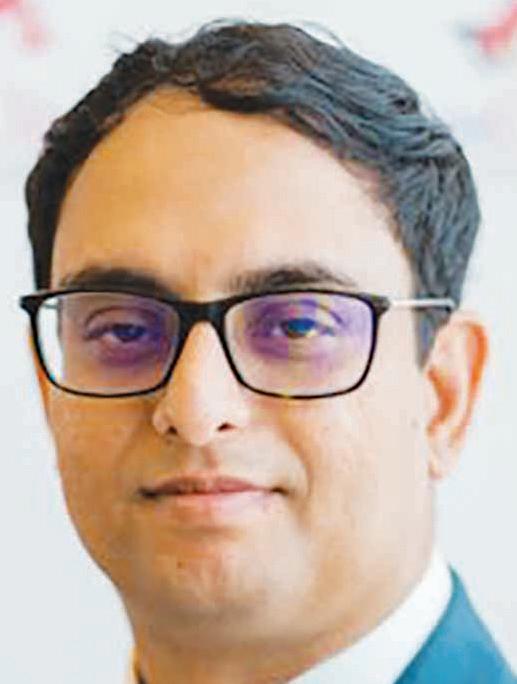
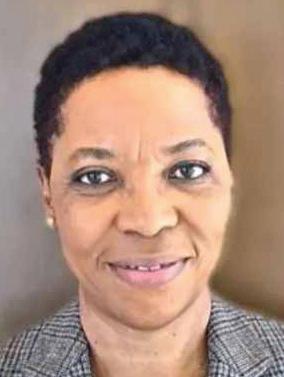


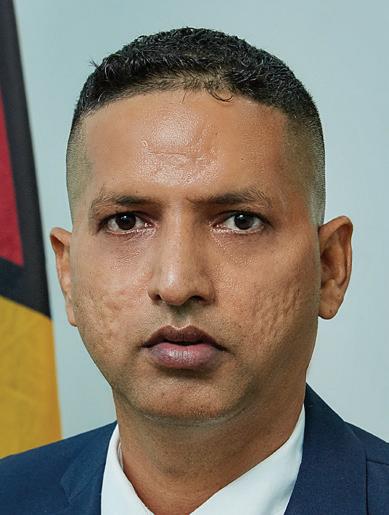

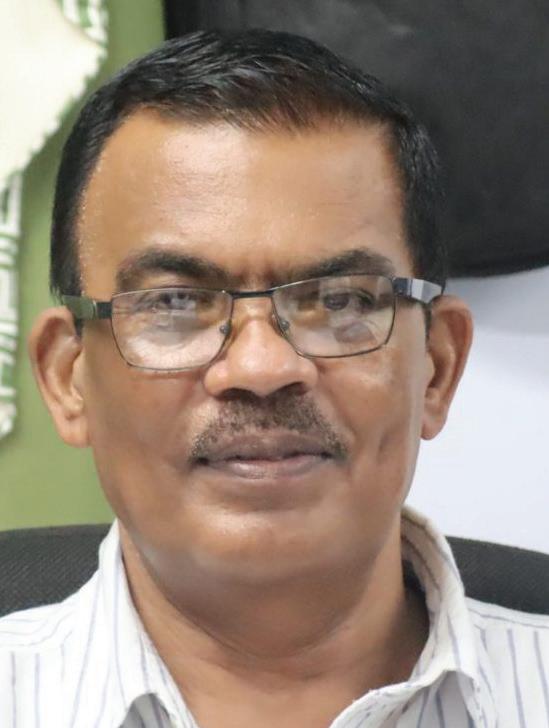

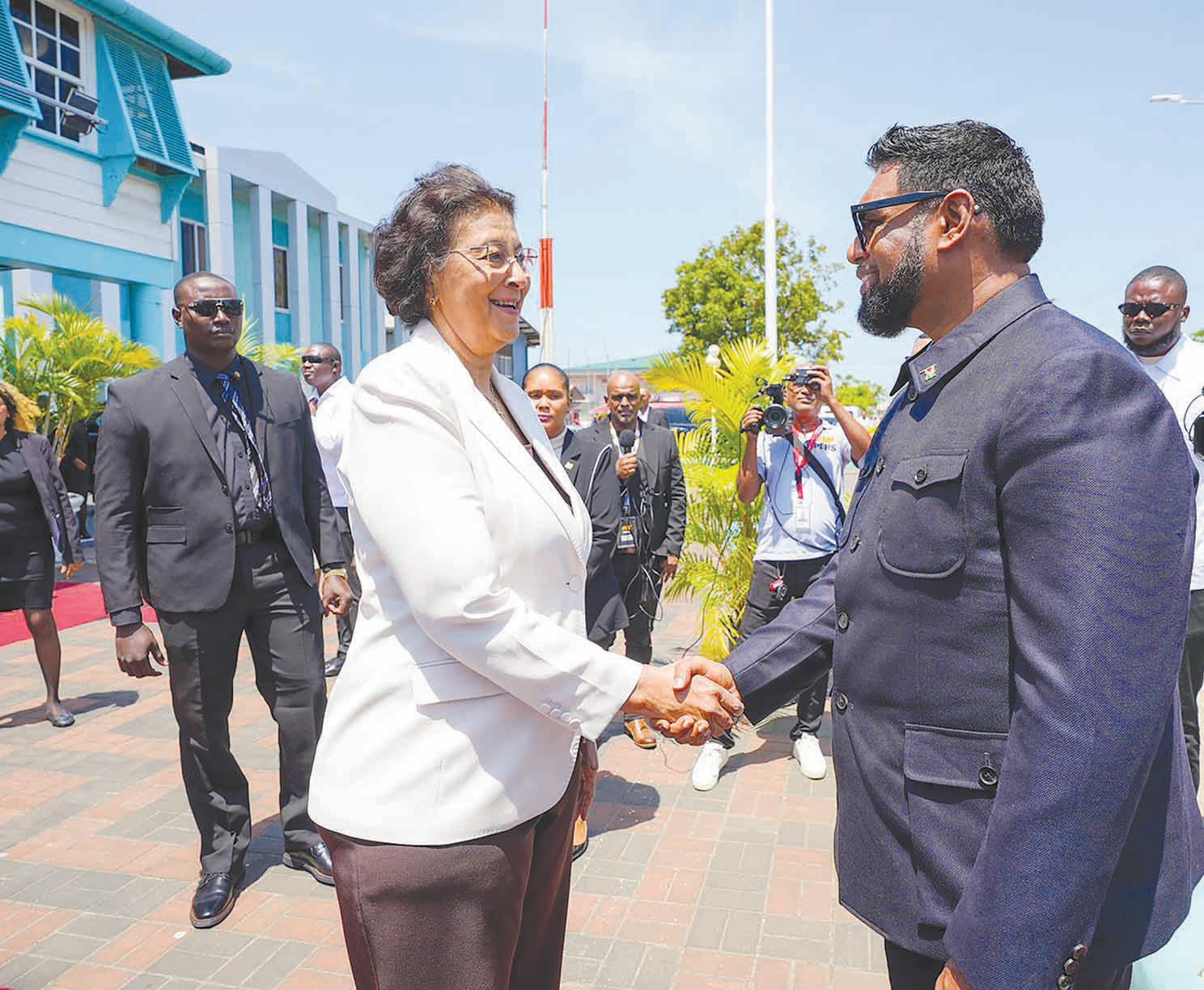
Foreign Service loses “one of its finest” as career diplomat Elisabeth Harper dies

Road crash leaves motorcyclist dead, other rider injured

“Lola Doll” names alleged shooter from hospital bed






The Demerara Harbour Bridge will be closed to vehicular traffic on:
Sunday, September 14 – 10:00h–10:45h and 21:45–23:15h, and Monday, September 15 –23:15h–00:45h.
The Berbice Bridge will be closed to vehicular traffic on:
Sunday, September 14 – 09:25h–10:55h and Monday, September 15 –11:05h–12:35h.

Parika and Supenaam departure times –05:00h, 10:00h-12:00h, 16:00h, 18:30h daily














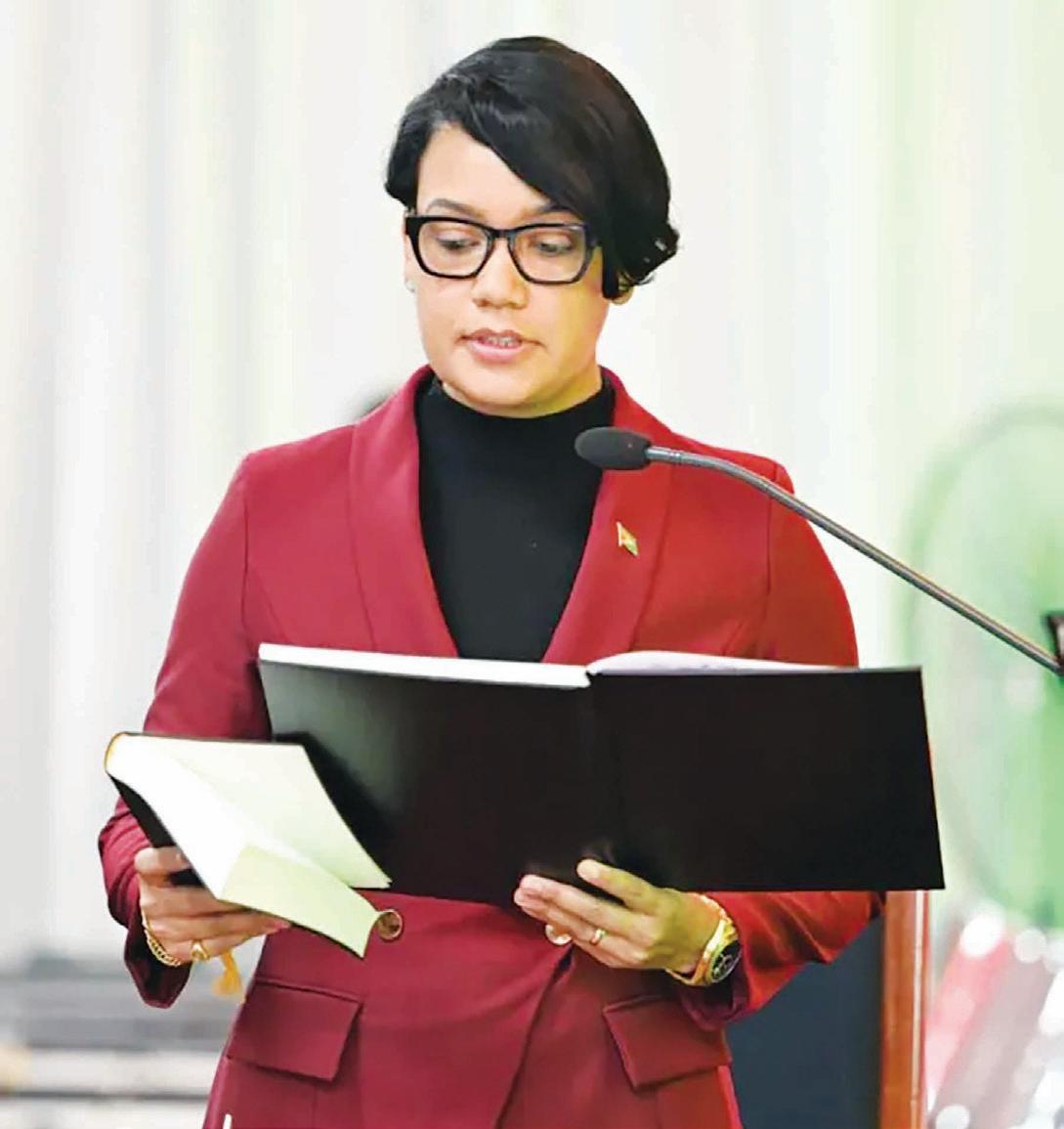
resident Dr Irfaan Ali has issued a stern warning to his newly sworn-in Cabinet, declaring that those who view Government as an exercise of power rather than responsibility will quickly find themselves out of office.
At the swearing-in ceremony at State House on Saturday, following the People’s Progressive Party’s sweeping victory at the 2025 General and Regional Elections, President Ali underscored that the next five years will be the most decisive in Guyana’s history.
“This Government is not about power, and I want to make that very clear. Without this power, you will find yourself out of the job very quickly. This Government is an exercise of responsibility, service, humility, and no ego. With great clarity, some of the expectations of our people, and we intend to be free Guyanese and fulfil the expectations of our people, and their expectations are to live a life of dignity, a life in safety, a life of honour, a life in which prosperity reaches every home, a life in which our elders can retire in dignity and in comfort, and a life in which your communities are clean and you have sanitation services. A life in which you feel alive with high quality and standard of living, world-class education, and world-class health services. The journey ahead is going to be accelerated,” the Head of State declared.
The Guyanese leader emphasised that the new administration would be measured strictly by results, transparency, and efficiency, with continuous assessments to ensure delivery.
The 25-member Cabinet features a combination of continuity, reassignment, and new leader-
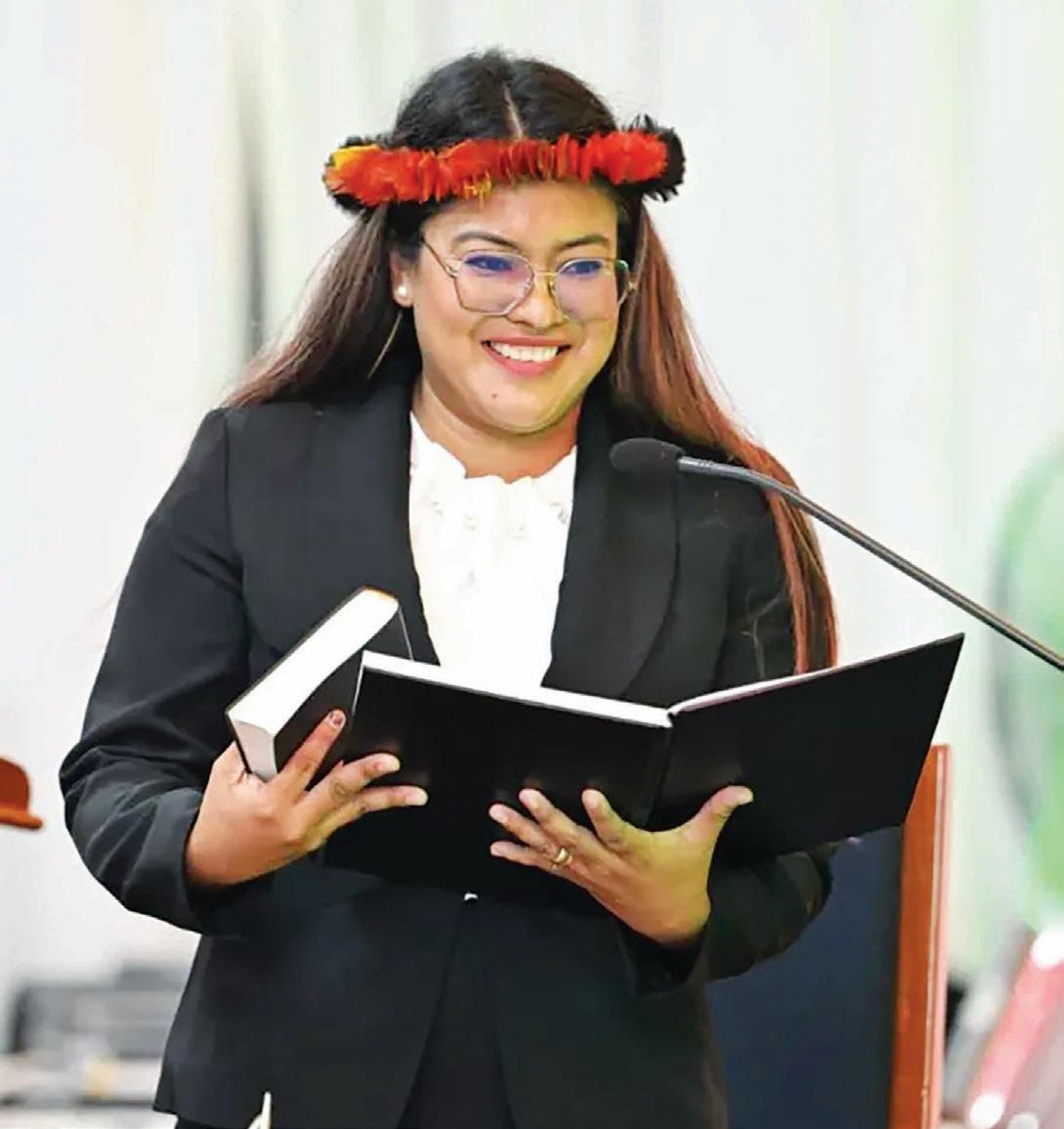
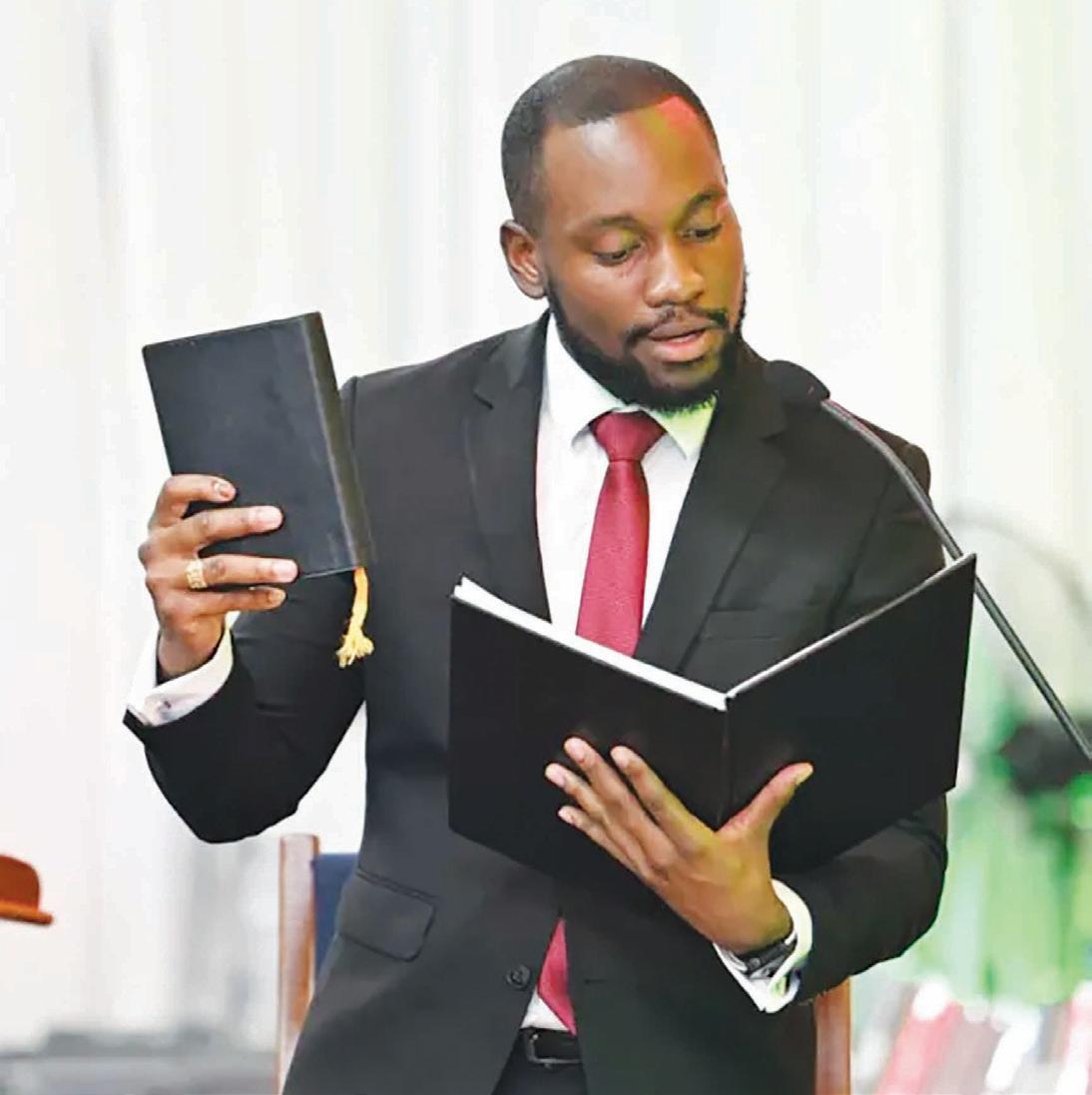
ship. Among those retaining their Ministerial posts are Attorney General and Minister of Legal Affairs Anil Nandlall, Minister of Parliamentary Affairs and Governance Gail Teixeira, Senior Minister in the Office of the President with responsibility for Finance Dr Ashni Singh, Minister of Foreign Affairs and International Cooperation Hugh Todd, Minister of Agriculture Zulfikar Mustapha, Minister of Health Dr Frank Anthony, Minister of Public Works Juan Edghill, Minister of Natural Resources Vickram Bharrat, Minister of Housing Collin Croal, and Minister of Human Services and Social Security Vidyha Persaud.



Editor: Tusika Martin
News Hotline: 231-8063 Editorial: 231-0544
223-7230,223-7231,231-0544, 225-7761
Marketing: 231-8064 Accounts: 225-6707
Mailing address: Queens Atlantic Industrial Estate Industrial Site, Ruimveldt, Georgetown
Email: news@guyanatimesgy.com, marketing@guyanatimesgy.com
“Free enterprise” is built on the concept that economic decisions should be driven by the market rather than by Government control. In a free market economy, enterprises navigate a competitive landscape, aiming to satisfy consumer preferences while optimising their financial gains. The essential components of this system include private property rights, voluntary exchange, competition, and minimal Government intervention.
Free enterprise’s emphasis on individual freedom and choice sets it apart from other economic systems. Unlike planned economies, where the Government controls production and distribution, free enterprise allows individuals and businesses to make financial decisions. This freedom sparks innovation, boosts efficiency, and fosters economic growth. Additionally, the competitive environment pushes businesses to continuously refine their products and services, offering consumers the dual advantage of lower prices and enhanced quality.
The philosophical roots of free enterprise are deeply intertwined with individual freedom and political liberty concepts. Advocates of free enterprise argue that economic freedom is essential to personal and societal well-being, allowing individuals to pursue their interests and create wealth. Many proponents argue that political and economic freedoms are inextricably linked. The ability to engage in free trade, own property, and operate businesses without Government interference is an extension of personal liberty. In this sense, free enterprise is not just an economic system but also a means of safeguarding individual freedom and autonomy.
Free enterprise has been a driving force behind economic growth in many countries. By allowing businesses to compete in open markets, free enterprise fosters innovation, increases productivity, and generates wealth. Nations championing free enterprise often witness elevated economic growth and prosperity levels. This is because businesses operating in such environments are motivated to enhance their products and services, driven by the desire to satisfy consumer demands.
One of the defining features of a free enterprise system is its ability to nurture entrepreneurship. In a competitive market, individuals are encouraged to take risks, start businesses, and develop new ideas that drive economic growth. Entrepreneurship thrives because individuals can pursue business opportunities and innovate without excessive Government restrictions. This freedom to operate allows entrepreneurs to experiment with new products, services, and business models, ultimately contributing to economic growth and job creation.
Consumers are among the biggest beneficiaries of free enterprise. By prioritising competition and innovation, the system enables consumers to benefit from a broader range of options, enhanced product quality, and reduced costs. Businesses must compete for consumers’ attention and dollars. This competition drives companies to innovate, improve their products, and offer better prices. As a result, consumers enjoy a more comprehensive array of choices and access to higher-quality goods and services.
While free enterprise offers numerous advantages, it also has its challenges. Critics argue that it can lead to economic inequality, market failures, and environmental degradation. One of the main criticisms of free enterprise is that it can exacerbate income inequality. In a system where market forces often determine success, those already wealthy or who have access to resources may have an advantage over others. Additionally, free markets may fail to address externalities, such as pollution, leading to negative consequences for society.
Despite these challenges, proponents of free enterprise argue that the system has built-in mechanisms for addressing such issues. For example, competition can help reduce inequality by creating opportunities for new businesses to enter the market and disrupt established players. Additionally, Government regulation can play a role in correcting market failures, ensuring that companies operate in a way that benefits society.
While free enterprise advocates for minimal Government intervention, the role of Government in supporting or hindering free enterprise cannot be ignored. In a free enterprise system, the Government’s role is limited to enforcing property rights, maintaining the rule of law, and ensuring markets function efficiently. However, many countries adopt a mixed approach, where the Government intervenes in certain areas to protect consumers, promote competition, and address market failures.
Governments can support free enterprise by reducing barriers to entry, providing incentives for innovation, and protecting intellectual property rights. However, excessive regulation, high taxes, and Government monopolies can hinder the effectiveness of free enterprise by stifling competition and discouraging entrepreneurship.

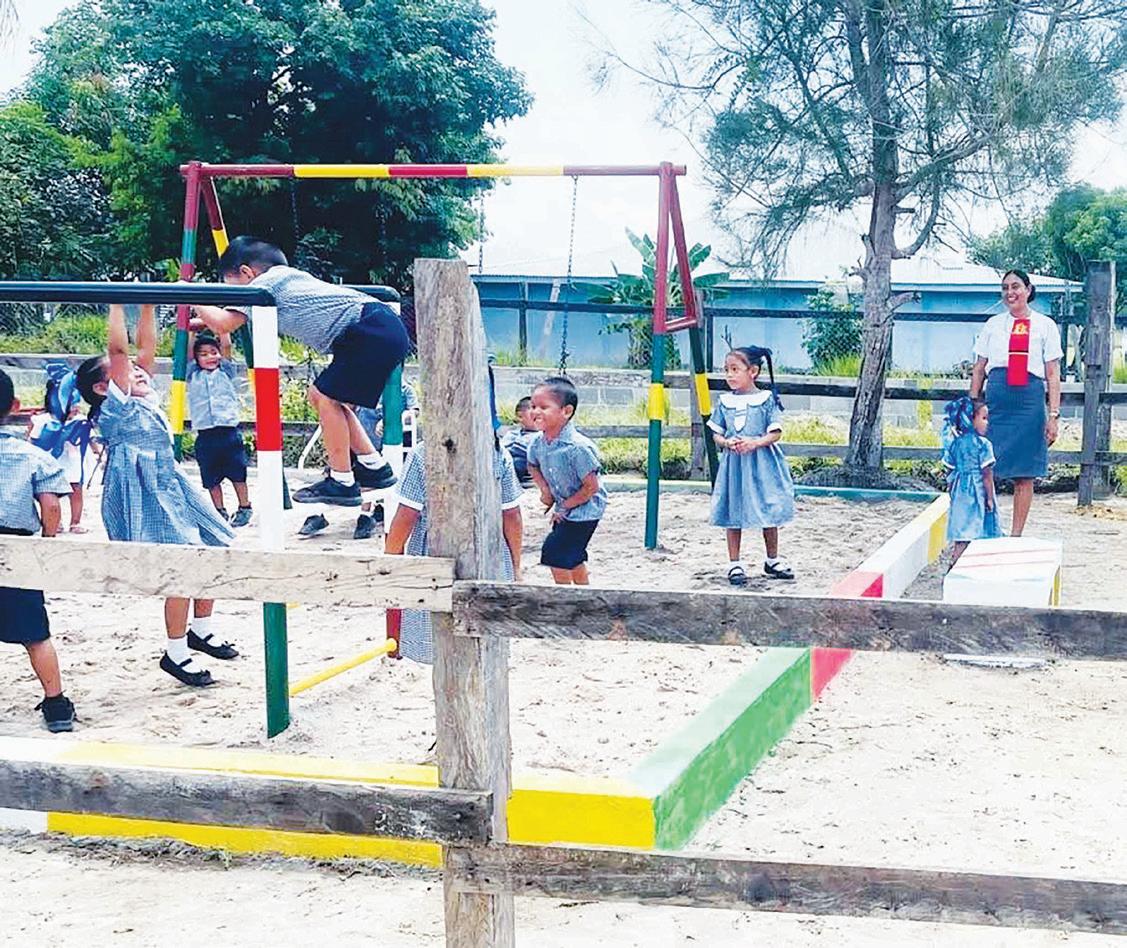

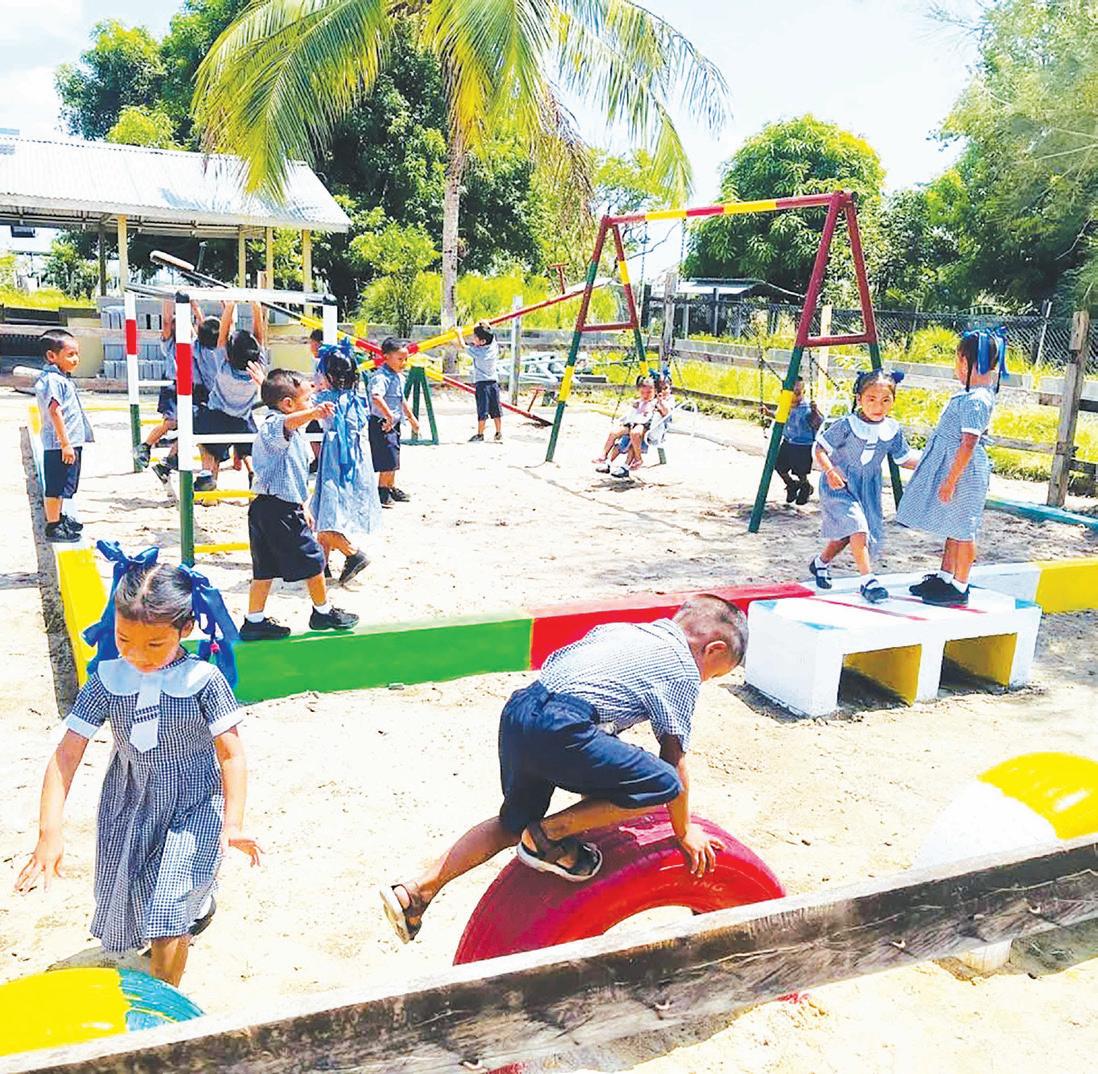
By Clyde Russell
The global crude oil market is facing two long-term fundamental shifts that will change how cargoes flow around the world and how they are priced.
The first factor is a supply and demand issue, with the vast majority of demand growth concentrated in Asia but the supply growth largely coming from the Americas outside of the United States (US).
The second is that energy markets are being increasingly subjected to political influences, and the risk is that large blocs of supply are cut off from demand centres, as has been seen with Europe largely ending its purchases of Russian oil in the wake of Moscow's invasion of Ukraine.
These two factors will once again force the oil market to adapt, with longer vessel voyages, issues around obtaining suitable crude quality for refinery configurations and how to price new flows from one region to another.
The swing to new production out of the Americas was highlighted in a presentation by analysts from Argus Media during this week's APPEC oil gathering in Singapore.
Crude from the Americas
represents 85 per cent of the increase in incremental global supply from nonOPEC sources from 2024 to 2030, Argus said, adding that amounted to 3.63 million barrels per day (bpd).
Only a small proportion of this comes from the US, with the world's largest oil producer expected to see only modest increases in output in coming years.
Larger contributions come from Canada, Brazil, Guyana, Argentina and Suriname, with some decline expected from Mexico as fields mature.
In contrast to the supply growth, the demand growth is concentrated in the East of Suez markets, Argus said, with India leading with an expected gain of 2 million bpd from 2024 to 2030.
Outside of India, the rest of the Asia-Pacific region is forecast to add 600,000 bpd of demand over the period, while China actually loses 100,000 bpd as it moves rapidly to electrifying its transport fleet.
Oil demand is forecast by Argus to rise from 2024 to 2030 by 1 million bpd in the Middle East, by 600,000 bpd in Africa and by 500,000 bpd in Latin America.
But the main takeaway is that 90 per cent of expected demand growth is in the East of Suez markets.
There is already evi-
dence of rising flows from the Americas to Asia, with volumes hitting a quarterly record high of 4.09 million bpd in the April to June period, according to data compiled by commodity analysts Kpler.
This was up from 3.6 million bpd in the first quarter and meant that oil from the Americas accounted for about 16 per cent of Asia's seaborne imports in the second quarter.
The oil industry has a solid track record in adapting to changing flows, so it's reasonable to expect that physically moving crude from the Americas to Asia will be feasible, even if it's more costly.
What may be more challenging is dealing with the new grades, which skew towards being lighter and sweeter, with the exception of Canada's heavy crude.
It's likely that there will be a surplus of light, sweet crudes at a time when the rising electrification of vehicles cuts demand for gasoline, the main product from such grades.
If more oil moves from the Americas to Asia, the question also arises as to how it will be priced.
Will the West Texas Intermediate (WTI) benchmark become more important than the current global light crude standard bearer Brent, or will cargoes move
to being priced more on a delivered-to-Asia basis?
The other big question is how geopolitics will play out in crude markets over the longer term.
US President Donald Trump has made it clear that he sees energy as a political tool, making commitments to buy US crude and liquefied natural gas key parts of his trade negotiations with countries.
But while this may boost purchases of US crude by some countries that have reached deals, such as Japan and South Korea, it also means that countries without a deal, such as China and India, are likely to shun US energy.
While crude markets have been totally free from politics, it is likely that trading will become more polarised in coming years, with importing nations being forced to choose between suppliers Trump approves of and those he disagrees with.
The problem is Trump has shown he can shift allegiances fairly quickly, which may complicate oil flows while he remains in office.
(Reuters Commentary)
Clyde Russell is an Asia commodities and energy columnist at Reuters. He has been a journalist and editor for four decades, covering everything from wars in Africa to the resources boom.
Dear Editor,
In what many observers consider a major accomplishment in the journey towards national unity, the September 1 General and Regional Elections (GRE) have repositioned and reinstated the People’s Progressive Party/Civic (PPP/C) as noted by the majority of media outlets locally and within the region.
In reality, the 1992 “Time to Rebuild, Time for Renewal” thematic of the Jagan/Hinds Administration has been eclipsed, transcended by the Irfaan Ali/ Mark Phillips “Guyana is on the Rise with the PPP/C”.
PPP electoral platform messages have advocated, elevated the trust factor to a remarkable degree, as can be discerned from the eligible voter tabulation and declaration of results.
There is also the view expressed by the transactional AFC appeal to voters urging the installation of a “minority” PPP Government, as proposed by Mr Nigel Hughes; what actually transpired was a rejection of neo-Burnhamism, as exemplified by rigged, fraudulent, and corrupt General Elections.
PNC/APNU propaganda and rally focus, for instance, linked Mr Aubrey Norton as a “son of a persona originating from the mining town of Linden,” whilst Prime Minister candidate Juretha Fernandes was touted as being of Amerindian heritage.
As an electoral narrative, this attempt to provincialise or communalise, coupled with indigenismo, clearly crashed, as the voters negated the PNC-APNU at the Linden constituency as well as based on tabulated ballots from Regions Seven,
Eight, and Nine.
In terms of manifesto formulations and policy assurances, the Nietzschean Jagdeo “haters” ostensibly expected that the sheer weight of social media misinformation, disinformation, and lies would create fractures and intensify a pluralist-type deviation within the political process
The objective – to reproduce on billboards, surface graffiti, and flat-screen television a prototype Machiavellian nobleman, Bharrat Jagdeo.
In fact, this process commenced even before the PPP’s 32nd Delegates Congress, of April 2024.
It could well be that another important factor that sustained the PPP/C and its electoral campaign, in terms of impacting heterogeneous constituencies and districts, was the methodology adhered to in crafting the manifesto sections, as well as the utilisation of both print and electronic media.
Though there is a tendency to overestimate the social realism impact of the Covid pandemic lockdown and restrictions, and the limitation on relatively large numbers of citizens, it could well be accurate to surmise that the post-Covid years (Y3 and Y4/5 IAA) were characterised by a gradual return to normal.
The tendency for large masses of people to converge at sports and concert stadiums and venues aligns with social behaviour and traits.
Video culture and imagery, to a significant degree, served as both secondary as well as front-edge influencers amongst those population sectors within, say, the 18- to 35-year-old group.


The fact that several leading political personalities of the PNC-APNU declared their support for a second-term Irfaan Ali Government meant that Opposition mega rallies were relatively deficient compared to previous GREs.
An in-depth analysis of younger-aged Guyanese at these cultural events – such as Emancipation Day at the National Park, Phagwah on the public arcades and streets of villages and the Georgetown communities, and especially Champion Series One Day/Night cricket at the National Stadium (all captured by video-screening) – reflects differentia with what has evolved in praxis based on the ratio of voters who turned out and cast ballots.
The disconnect alluded to above stems not exclusively from voter apathy, but importantly must be flagged in terms of choice and in terms of confidence in an opposition adhering to the Constitution and Rules (ROPA).
The reactions over the allegations of gender abuse (i.e., of Vanessa Kissoon and the late PNC stalwart M/ ss Amna Ally) are not abstractions or issues that fail to resonate with the more aware and educated social sectors, regardless of political affiliations.
Elections are defined, amongst other factors, by community interactions. Social relations coexist with consumer traits and can distort or refigure public moods, e.g., towards Chinese-owned supermarkets or flood-relief compensation.
Almost certainly, the $100,000 cash grant re-
sponses from all eligible age groups could be compared with the numbers – those attending the mega rallies of the major contestants, as well as the level of voter participation in the September 1 GRE.
Tendencies towards people’s struggles for improvements in the quality of their lives have everything to do with democratic, free, and fair elections. However, there are risk issues (as demonstrated in the Trinidad experience) specific to escalating crime, violent home invasions, and corruption.
Corruption can dramatically become dominant within the infrastructure of civil society.
Election cycles impinge on the political process in unpredictable ways. Guyana’s electoral system, combining proportional representation with First Past the Post elements, has been tried and tested.
Amendments to the Representation of the People’s Act (ROPA) have also been introduced.
It is indeed this systematic inclusivity factor that has inspired the Irfaan Ali Government to engage more meaningfully with the People, to provide assurances to investors, to build out transformative projects on a broad scale, and, in that process, coupled with the Low Carbon Development Strategy (LCDS), establish an environment that can be equated with both the confidence and trust factors.
Internal to this paradigm is the principle that is existentialist, viz, the Magnitsky factor. “Leadership You Can Trust”. “Progress You Can See”.

It could also be a development by contradiction (as in Walter Rodney: people’s power, no dictator) that the newly formed WIN formation benefited from the transformative infrastructure quadruple “security” programme of the IAA
Propaganda to the effect that “you cannot eat roads...” was a not unimportant aspect of APNU rhetoric. However, it would have been this very connectivity, as discerned from multi-regional 4-lane roadworks, that provided advantages to WIN in mobilising support within Upper Demerara River communities at Linden.
Team Mohamed’s fleet of motor vehicles would have, in some instances, matched the resources of APNU PNC Regional Development Councils (RDCs). That situation may have been replicated in campaigning and garnering village support in Region Seven – CuyuniMazaruni.
Mc Wilfred, interestingly, considers Vice President Jagdeo to have been “very experienced…”. However, a comparison is drawn with Forbes Burnham rather than with the country’s most versatile and accomplished democrat, Dr Cheddi Jagan.
Author Ruel Johnson, in an NCN interview, may also have an insightful viewpoint, viz, the September 1 GRE, when he identifies those trends that have unfolded with and subsequent to the 2018 NOV; this highlighted the crisis and eventual loss of office of the Granger/Harmon/ Nagamootoo elite group.
Johnson links the “curve” of policies that have contributed to the formation of a
more materially endowed or lower-middle class.
The social-class guardrails, rationalised by the abolition of taxes, family grants, and expanded employment opportunities, have contributed to a level of needs satisfaction for a visible section of citizens.
As a Guyana Prize winner for Best First Novel, Johnson is viewed as a “wordsmith” endowed with important analytical prowess.
“Describing the complot to manipulate the WIN against the PPP/C as a strategy or tactic that backfired, Johnson does not examine other factors, such as income discrepancies and the inflated high cost of living experienced by interior settlements and villages, despite the IAA’s extensive relief and income/job-creation initiatives (Amerindian Cusos and increased subventions for Toshaos and village Captains). However, what is revealing is his grasp of the historical dialectic and the immense popularity of the IAA across the multiple communities of Guyana.
The fact that, on E-Day itself, officials – including a Guyana Police escort – came under attack at the same Baboon location in the Cuyuni by suspected syndicatos is yet another factor that must be part of the process of national security (border security as sovereignty) and, in the final analysis, be categorised as a contributing element in the PPP attaining a landslide victory on September 1, 2025.
Yours sincerely, Lawrence Rodney


If you've ever gotten a nasty sunburn, you've experienced the singeing effects of ultraviolet (UV) radiation from the sun. In fact, you probably made a personal vow to forever apply (and reapply) sunscreen on sunny days. Luckily, the Earth shades us from the vast majority of intense ultraviolet light with its own sunscreen – the ozone layer. Without the ozone layer, we wouldn't just get sunburnt; there's a chance we'd go extinct. The sheer intensity of unfiltered ultraviolet sunlight would threaten most species that live on the surface of the Earth.
Almost always, ozone is only mentioned in connection with the hole in the ozone layer and the damage it has caused to the environment. The richness of the ozone layer that makes the hole so significant, and the science behind it, is far less commonly discussed.
Ozone is a special kind of gas that is made up of three oxygen atoms (O₃). The oxygen that we breathe every day has two atoms (O₂), but when three join together, they form ozone. This small difference makes ozone behave in a very different way. Most of the ozone on Earth is found high up in the atmosphere in a region called the ozone layer. The ozone layer is very important because it protects all life on Earth.
To understand why the ozone layer is so important, it helps to know a bit more about UV rays. Unlike sunlight that we can see or heat that we can feel, UV rays are invisible to our eyes. Even though we cannot see them, they are very powerful and can affect our health and the environment. Scientists divide UV rays into three main types: UVA, UVB, and UVC. Each type is different in strength and in how it affects the Earth.
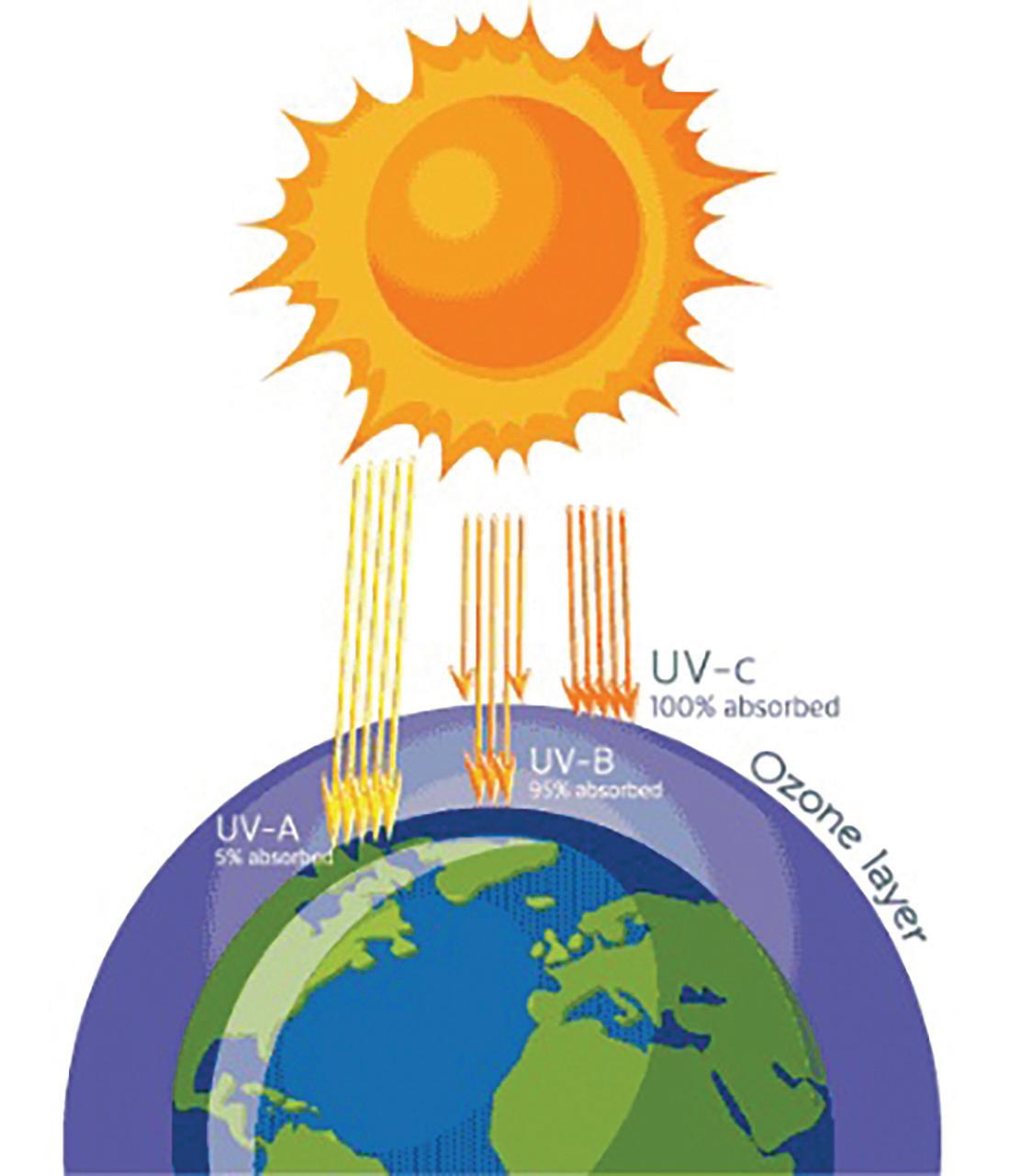

This is where the ozone layer does its job. The gas molecules in the ozone layer absorb most of the UV rays before they can reach the ground. In this way, the ozone layer acts like a giant invisible shield around our planet. It is almost like Earth is wearing sunscreen or sunglasses all the time.
The sun emits UV radiation, with three types of UV rays –UVA, UVB, and UVC. All three rays are different, but all three can cause skin damage like burns, premature ageing, and skin cancer.
• UVA – The most common UV ray from the sun and most dangerous, UVA can penetrate the skin down to the middle layer.
• UVB – A shorter wavelength than UVA that can only penetrate the skin to the top layer. The earth’s ozone layer stops some UVB rays from reaching the surface. Treated glass also can stop UVB rays.
• UVC – The ozone layer stops all UVC rays from the sun. Therefore, the only exposure humans get to UVC is from artificial sources such as lasers or welding torches. However, the ozone layer is not as strong as it used to be. Human activities have released certain chemicals, like chlorofluorocarbons (CFCs), that rise into the atmosphere and break apart ozone molecules.
CFCs were once very common in everyday products. They were used in refrigerators and air conditioners to keep things cool, in spray cans to push out liquids (as propellants), and in some kinds of foam packaging. People liked CFCs because they were cheap, safe to handle, and didn’t catch fire easily.
But scientists later discovered that when CFCs are released into the air, they eventually rise up into the atmosphere. There, high-energy sunlight breaks them apart, releasing chlorine atoms. These chlorine atoms are very destructive to ozone. In fact, just one chlorine atom can destroy thousands of ozone molecules before it finally breaks down. This process is what we call ozone depletion
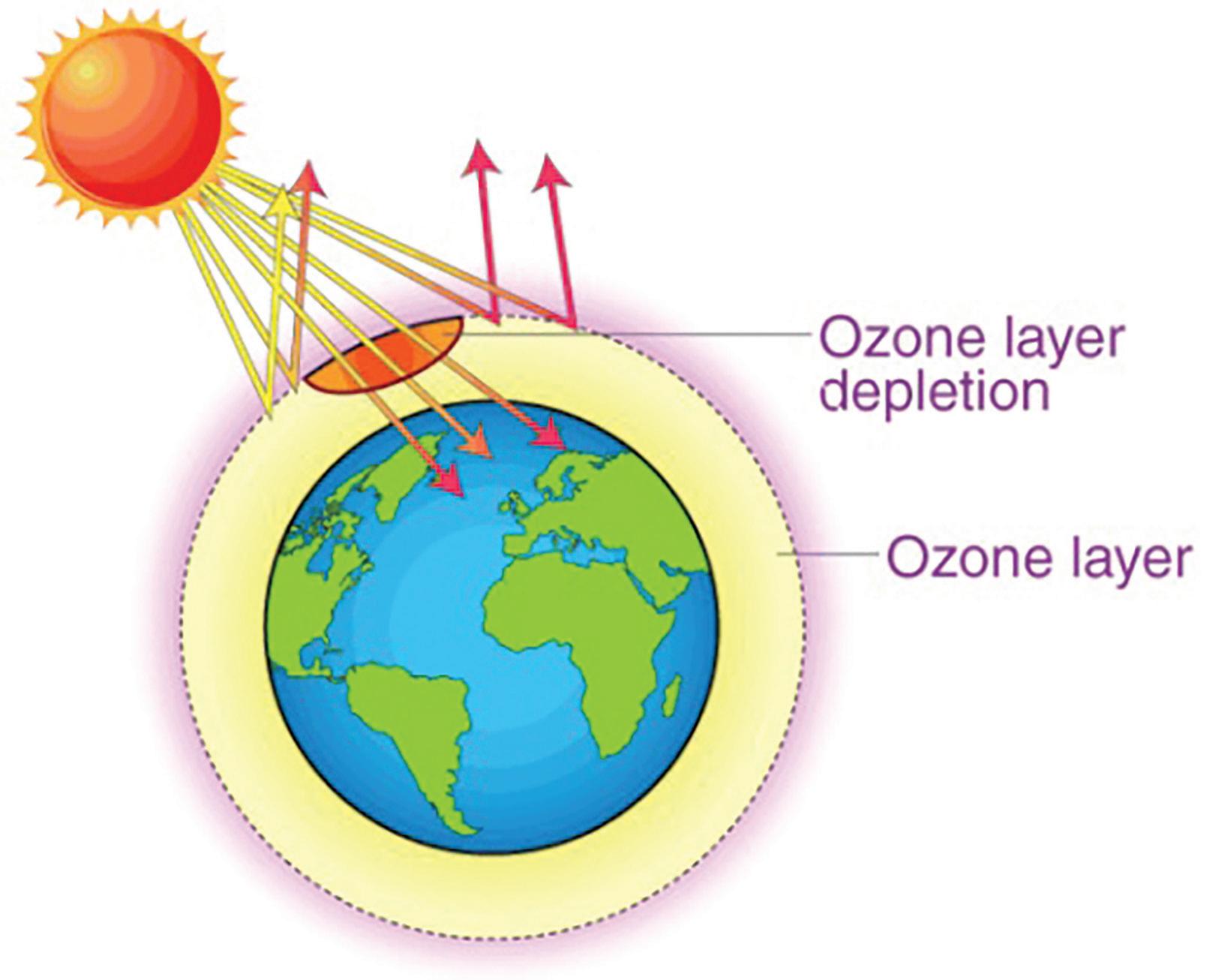



When the ozone layer gets thinner, more UV rays reach Earth’s surface. This can increase the number of sunburns and eye problems like cataracts and skin cancers and even affect how well plants grow and how healthy animals remain.
Thankfully, once scientists discovered the link between CFCs and ozone depletion, countries around the world came together through an agreement called the Montreal Protocol. This treaty, signed in 1987, gradually phased out the use of the most harmful ozone-depleting chemicals. Since then, the ozone layer has been slowly healing. This shows that when people work together, we can solve even global environmental problems. Protecting the ozone layer is not just about reducing sunburn – it is about keeping life on Earth safe from dangerous UV rays for generations to come.
(Adapted from UPMC.com, howstuffworks.com, byjus. com)

“We recommit ourselves
– commit to maximising private sector business investment
– recommitted to advancing security architecture, agriculture, fisheries
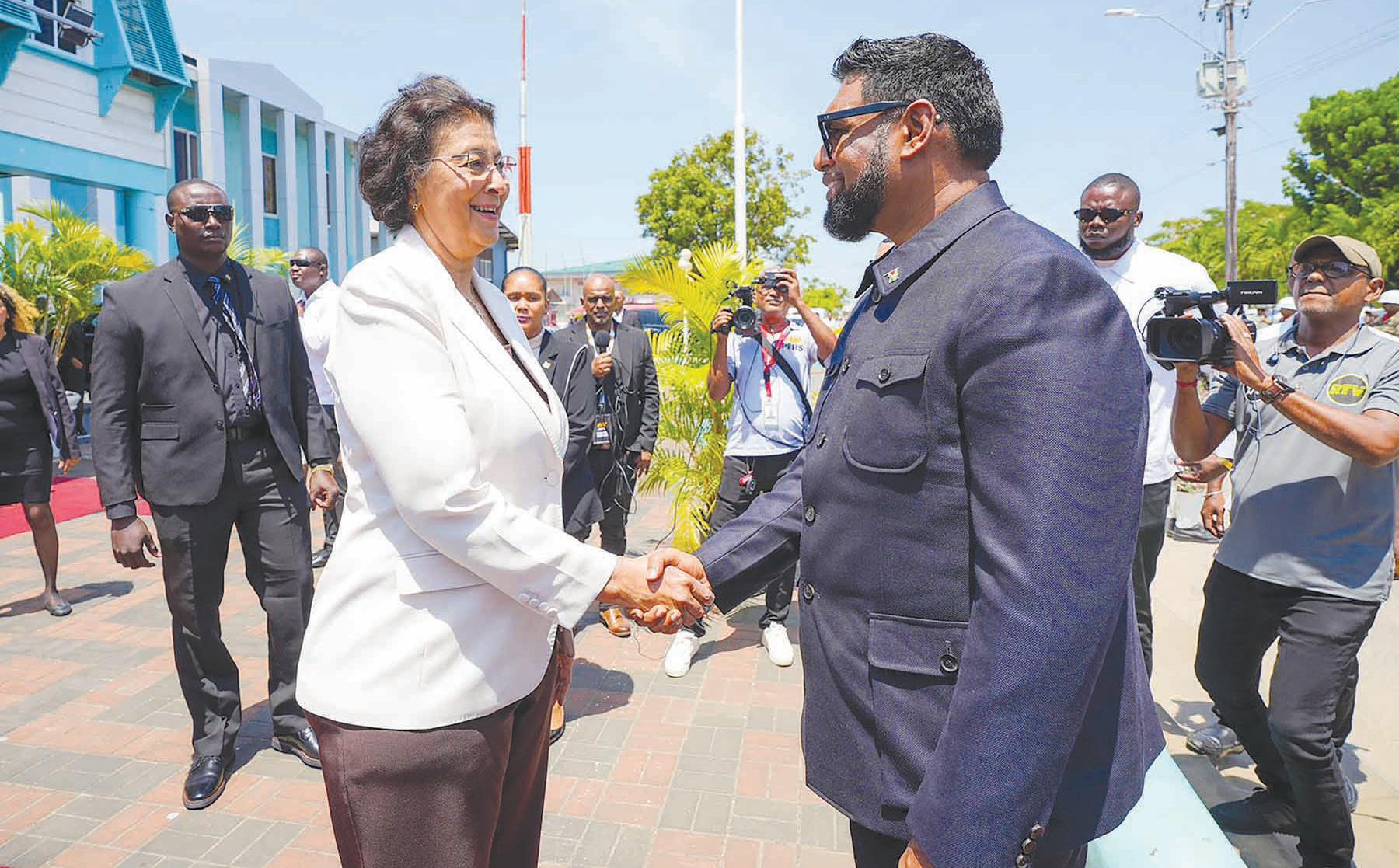
Guyana and Suriname have reaffirmed their commitment to strengthening bilateral relations, with Presidents Dr Irfaan Ali and Jennifer Geerlings-Simons pledging to accelerate cooperation in trade, energy, security and infrastructure development.
The two leaders met in Nieuw Nickerie on Saturday, where they held extensive discussions on advancing joint economic opportunities and consolidating ties rooted in shared values, geographic proximity and cultural connections.
to the expanding of this relationship, and our bonds of friendship that exist between our two countries and our people. And importantly, a friendship and neighbourly relationship that is based on shared values, aspirations, our geographic proximity, our cultural ties, and more importantly, our commitment to peace, security and prosperity for our countries and our people”.
“Energy security is an important pillar of our growth and development for both countries and we advance discussions as to how we can
opportunities in the energy ecosystem for both our countries to advance collectively and for our private sectors to also advance collectively,” the Head of State said.
Agriculture, fisheries
The leaders also pledged closer cooperation in food security, fisheries, and agriculture under the Strategic Dialogue and Cooperation Platform. A joint fisheries commission, including fisherfolk and technical teams, is expected to be established by the end of 2025. President Ali has revealed that both
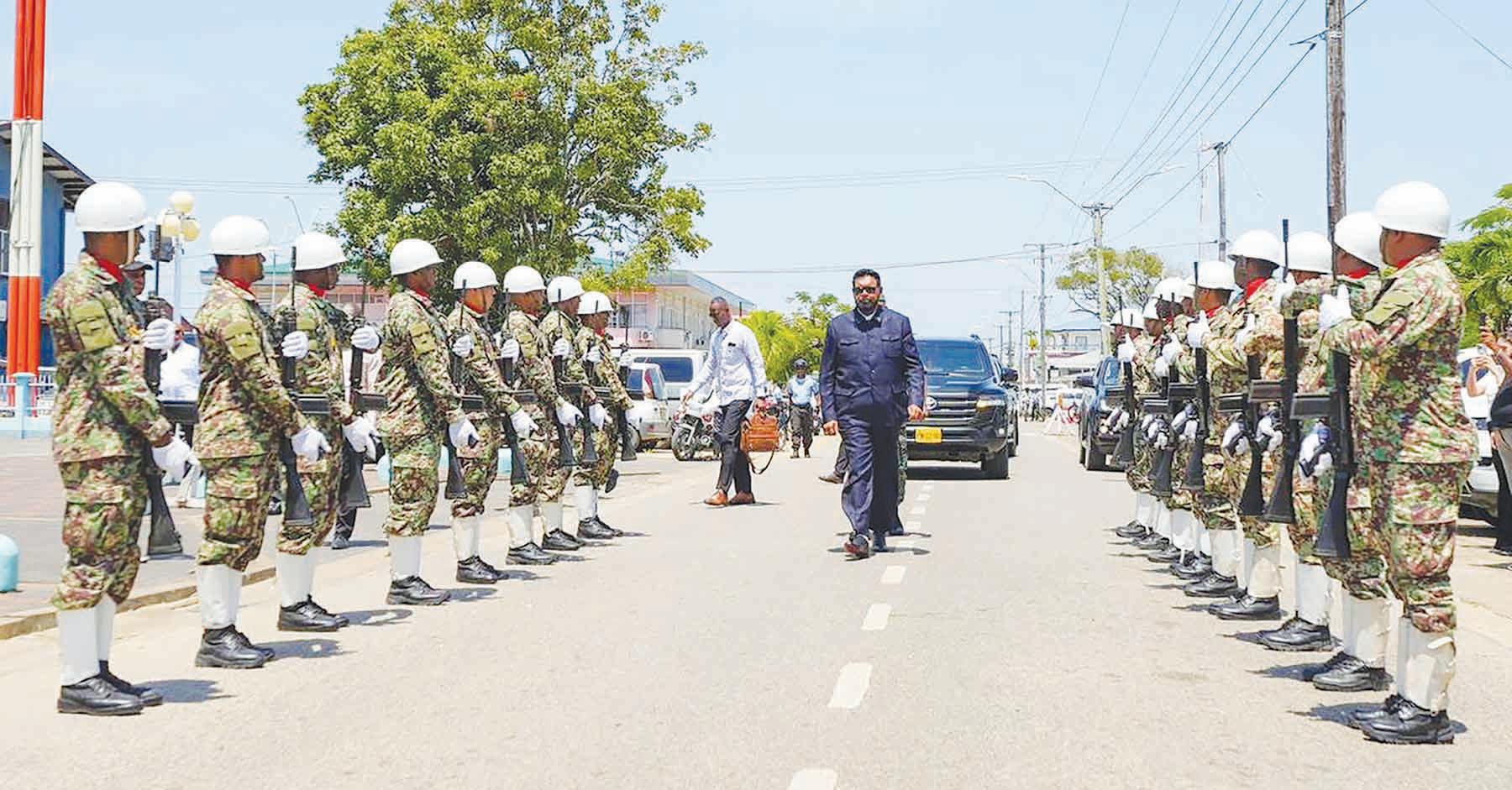
Following the conclusion of high-level talks, both Presidents underscored the importance of encouraging private sector partnerships, including joint ventures, to maximise investment opportunities. According to President Ali, both nations agreed to establishing mechanisms to improve the ease of doing business, transparency, and efficiency for investors on both sides of the Corentyne.
“As we in Guyana, we are very pleased to reaffirm our strong commitment to this bilateral relationship, to reaffirm our commitment
build this infrastructure, and support each other, not only in terms of the energy security of Guyana and Suriname, but also how we can play that wider role in terms of energy security and the possibilities around an energy economy for the rest of the region in CARICOM and, of course, for the field, not only in oil, but also gas development, renewable energy and the interconnection of our grid across the region. We are committed to exploring joint ventures, knowledge sharing, exchanging knowledge and technology and looking at investment
sides agreed on the need to urgently improve ferry services between the two countries and to collaborate on a regional ferry project to enhance trade and mobility.
“Agriculture, food security and fisheries are important sectors for both of us. We both have an enormous opportunity in contributing to the food security of CARICOM and in building out an ecosystem that would position Guyana and Suriname as major food producers in our region. Now, important in the movement of goods and services and people is the ferry
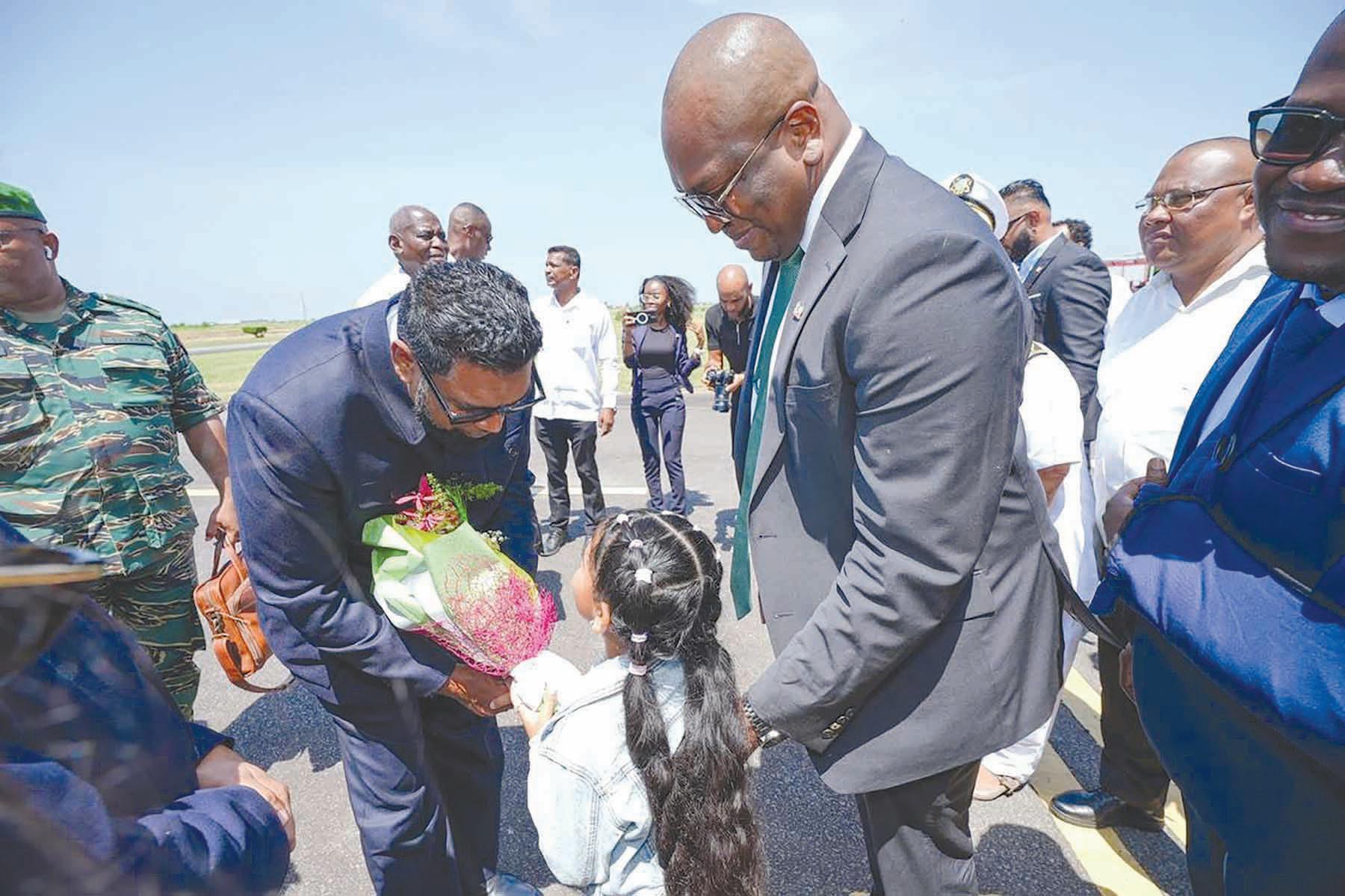
service. We recognise that there needs to be improvement in the efficiency and reliability of the ferry service. Therefore, we agreed that there is a need for an urgent review to improve and strengthen the reliability and efficiency of this service, and we have committed to having that review and taking the necessary action that would lead to the improvement of that service,” he added.
Security and regional cooperation
Meanwhile, on security, Presidents Ali and Geerlings-Simons reiterated
their commitment to fighting transnational crime, including drug and human trafficking, while advancing a coordinated security architecture. They also reaffirmed their countries’ commitment to resolving border issues peacefully through dialogue and international law. Both leaders restated their dedication to strengthening bilateral ties not only in the national interest but also for the benefit of CARICOM and the wider region, while positioning Guyana and Suriname as central players in regional food and energy security. “Madam President and I are
both committed to taking a very strong position against transnational crime and to have our security architecture collaborate and work in a close manner in combating transnational crime. We reaffirm our dedication to strengthening the bilateral partnership between Suriname and Guyana and to working together in the interest of our people and in the interest of the people of CARICOM and this region as a whole. Important to this is also advancing the opportunity for technology transfer, knowledge sharing and educational cooperation,” Ali explained.




Amotorcyclist was killed and another seriously in-
jured on Saturday along the New Road Public Road, Region Two (Pomeroon-
Supenaam), Essequibo.
The dead man has been identified as 27-year-old Daniel Grey.
According to information reaching Guyana Times, Grey, along with the other motorcyclist, was proceeding north along the eastern driving lane at a fast rate of speed when they collided with a white Toyota Fielder wagon bearing the registration number PAC 697.
Additional information revealed that the motorcar was turning into a Chinese

27-year-old Daniel
was



supermarket parking lot, and the two apparently speeding motorcyclists were unable to stop in time. As a result, they both collided with the vehicle.
The impact of the collision caused both Grey and the other rider to be flung from their motorcycles, falling to the concrete of the parking lot and sliding before coming to a stop near a parked Honda Vezel in front of the supermarket.
One of the men sustained serious injuries about the body, including to the lower part of his foot.
Both bikers were picked up and rushed to the hospital, where Grey was pronounced dead on arrival.
The injured man was admitted and remains a patient, receiving medical attention. No word on his condition could be confirmed at this time.
Police have since launched an investigation into the fatal crash.

There’s the acronym LIFO – signifying “Last in, First out”! – that describes why the PNC/APNU has been the first to issue a complete list of MPs they’ll be sending to the 13th Parliament. They ran LAST in the elections and as such don’t have that many seats to fill – a mere 12 to the PPP’s 36 and WIN’s 16 – while their candidate list had to’ve been quite bloated with all the names they’d fielded!! Ahhh… the shame… the shame!!
Aubrey Norton just didn’t announce he won’t be going to Parliament – as your Eyewitness noted yesterday. He later elaborated: “I hope that is an indication that I have no intention of running for the presidency in the future, and so I see the task at this as repairing the party for the future.” While not exactly a reprisal of USA’s General Sherman’s famous demurral of higher office back in 1884 – “If drafted, I will not run; if nominated, I will not accept; if elected, I will not serve” – folks have divined him as saying he won’t EVER be running as a candidate for the Presidency!! Having observed politicians up close for a while now, your Eyewitness is a sceptic. “Never say never” is more like what he’s become used to!!
Anyhow, back to Parliament. Norton did say that Chicken Man – Terrence Campbell – is gonna be the leader of APNU/PNC’s dozen MPs. And immediately your Eyewitness figured out why!! Clearly stung by his defeat at the hands of Sanction Man Azruddin Mohamed – the shame…the shame… – he’s decided to fight fire with fire!! Mohamed has a moniker – Sanction Man – well, so does Campbell –Chicken Man!! Sanction Man has absolutely NO experience in politics – well, so neither does Campbell!! Take that!! Let’s see who can make the most blunders in parliamentary protocols!! And finally, Sanction Man’s a snappy dresser –albeit in off-the-rack designer outfits rather than Paris or London bespoke!! So guess who released a pic of himself decked out in a blazer – but rather gauchely with pants of the same colour!! – Chicken Man, of course!!
The biggest surprise name in the PNC/APNU line-up was that of Black Pudding Man from Buxton, David Hinds!! Was it just because he also has a “call name”? 'Cause there are so many others who’ve risen to defend the PNC over the last four years. Like, say, Annette Ferguson and Chris Jones, the past APNU/PNC Whip in parliament!! Wouldn’t he have been a PNC anchor in the House?? Makes you wonder if Noron ain’t setting up Chicken Man for failure so the party would turn to him and cry, “Come back!! Come back, Aubrey!!”
Then there’s Sharma Solomon – but not his pal Debrah Kissoon!! Wonder why??
…the First AI Minister
As he awaits Pressie’s announcement of his Cabinet, your Eyewitness notes – in wonder – that last Thursday, Albania became the first country to appoint a government Minister created entirely by artificial intelligence!! Imagine that!! Prime Minister Edi Rama had warned a couple of months ago he was thinking of doing his – but not surprisingly, no one took him seriously!! The virtual Minister, named Diella – meaning “sunbeam” in Albanian –will oversee all public procurement, a sector widely seen as vulnerable to corruption.
Rama described Diella as a “servant of public procurement” designed to make the tendering process fully transparent and “100 per cent incorruptible”. He’s been programmed not to take bribes!! Public procurement has been a persistent weak spot for Albania, with the EU – which Albania desperately wants to join! – repeatedly flagging graft concerns!!
Rama said the gradual transfer of procurement decisions to Diella would eliminate opportunities for bribery and ensure that “every public fund that goes through the tender procedure is 100 per cent legitimate”!!
Maybe Guyana next??
…the Commissioners' Conundrum
With WIN now leading the Opposition as the largest Opposition party, everyone assumed GECOM’s Opposition Three Stooges would be departing the stage. Not so fast!! It seems there’s no legal provision for removing them save death or retirement!!




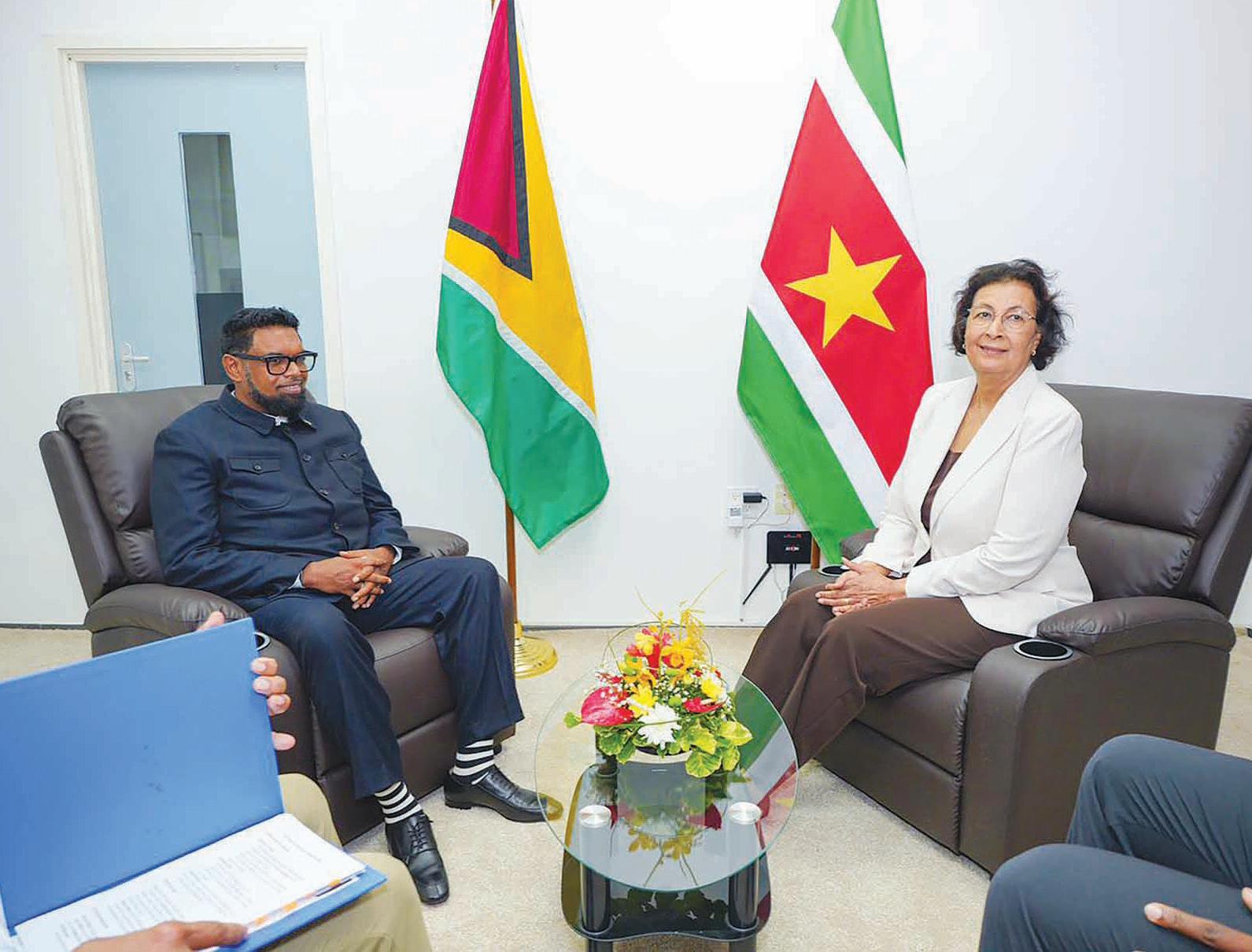
Guyana and Suriname have agreed to set up a joint commission to further advance cooperation in the fisheries sector – a move that could be a resolution to the long-awaited issuance of licences to Guyanese fishermen.
Since 2021, Suriname had promised to issue some 150 licences for Guyanese fisherfolk to operate in the territorial waters of the
Dutch-speaking nation. But to date, these licences are yet to be issued, despite repeated efforts by Guyanese authorities to get this matter resolved.
However, during a high-level meeting between President Irfaan Ali and the newly elected Surinamese President Jennifer Geerlings-Simons, discussions were held on key areas of collaboration, including
agriculture.
“We agreed to establish a Joint Commission comprising the Ministers responsible for fisheries, technical teams and relevant stakeholders, including the fishing societies themselves and our fisherfolk, before the end of 2025 to further advance cooperation in fisheries,” President Ali revealed at a joint press conference in Nieuw Nickerie on Saturday following the
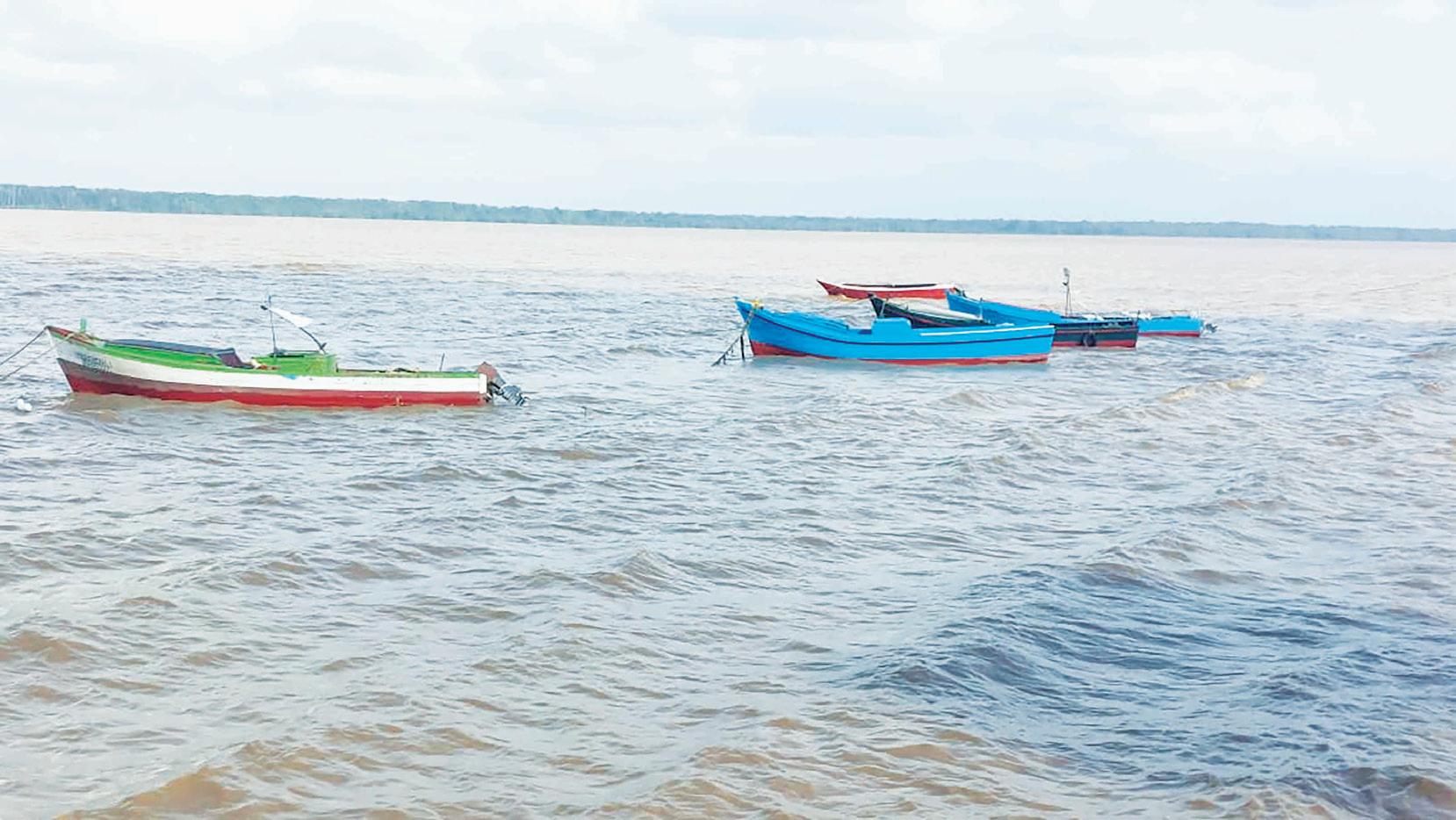
high-level engagement.
On her part, President Geerlings-Simons said that cooperation between Guyana and Suriname on the fisheries sector cannot happen in an ad hoc manner. She contended that the Joint Commission would have to work out what that cooperation should look like to ensure that both countries benefit from it.
Guyanese fishermen operate from the Corentyne Coast and have to use the Corentyne River to get access to the Atlantic, where they get most of their catch. The Corentyne River is Surinamese territory.
Over recent years, how-
ever, with the failure of the Suriname Government to uphold its pledge, Guyanese fisherfolk are being exploited and made to pay exorbitant fees to rent licences that are issued to Surinamese businessmen in order to operate in the border river.
Reneged on commitment
Following a high-level meeting in Georgetown back in August 2021 between President Ali and then Surinamese President Chandrikapersad Santokhi, the Dutch Government committed to issuing 150 fisherfolk here with licences starting from January 2022 to operate in Suriname’s terri-
torial waters.
But during a January sitting of the National Assembly, Agriculture Minister Zulfikar Mustapha stated that Suriname has “reneged” on its commitment.
“It is not in our hands… The Surinamese authorities would have promised us 150 licences. We had a commitment from no less a person than the President himself. I had an email from the Minister of Agriculture from Suriname, stating the modus operandi, how they will go about issuing the licences… [But] they reneged on the commitment; we had it in writing,” the Minister stated.



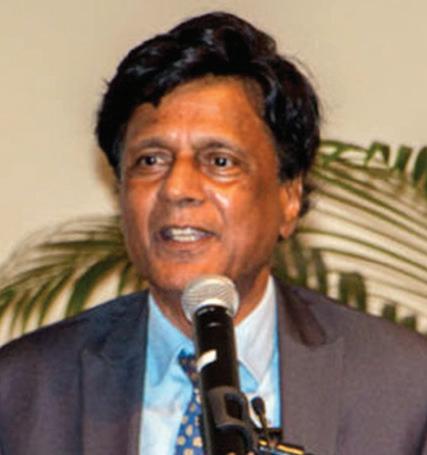
The success of WIN, whose leader Azruddin Mohamed is of Indian origin, in securing votes from a solid block of votes from African and Amerindian Guyanese, in addition to a lesser number of Indian-Guyanese, has raised the question of whether we have reached the promised land of non-racial voting. To answer this question we have to ask why our citizens voted racially in the first place. There was the inaugural economic competition engendered between newly freed Africans and indentured Indians that morphed into political competition when the latter’s burgeoning numbers combined with their immigrant-fuelled economic drive were seen as a threat to Africans. By the 1920s, the several racial groups identified leaders from within their communities to represent their interests to get them “what, when and how”. One of the “whats” being which group ruled, giving the psychic the non-economic gratification of being identified with the rulers. Our political leaders benefited from but did not create the racial identities.
Both Jagan and Burnham attempted to convince their supporters to identify with their class/economic interests that transcended racial boundaries but were by and large unsuccessful. In a democratic polity, the size of the racial group advantages those with larger numbers, and our politics developed a bi-communal bent with Indian and African-Guyanese dominating. It was rational for the leader to mobilise along racial lines since the people already saw themselves with “shared fates” based on that identity marker. This assured a base. The communist Jagan justified going along with those tendencies by citing his non-racial goals. Socialist Burnham justified rigging elections to exclude Indian representation on the grounds that his decision was “political, not racial”. Amerindians sequestered in the interior were courted by all parties who replicated the historical Dutch modus operandi of offering material benefits.
The question is whether we transcended this mindset in the just-completed elections. The PPP had strained mightily since it returned to office in 1992 to foster development equitably through equal opportunities in the nascent free-market economy bequeathed by Desmond Hoyte. Objectively, African Guyanese did comparatively better economically than Indian Guyanese between 1992 and 1999, based on surveys conducted by the World Bank and the UNDP, respectively. But because of entrenched mindsets, this was unacknowledged in the PNC claims of discrimination and “ethnic cleansing” of African Guyanese. Widespread violence against Indian Guyanese followed as Amerindians remained peripheralised and racial voting hardened.
However, with comparatively higher rates of emigration whittling down the PPP’s numerical advantage, their ideological idealism for ethnic equity driving their policies towards greater inclusion of African and Amerindian Guyanese was now augmented by political realism. Oil revenues from 2020 gave them the wherewithal to be more directed in their multi-ethnic developmental drive. Their jettisoning of Marxism from their constitution allowed them to be more open in their articulation of this principle. But based on the small cross-ethnic votes garnered on September 1, they have a ways to go.
But their frontal attack on the premises of the old politics ironically helped WIN. By deconstructing the PNC’s legitimacy to represent African Guyanese interests, it became easier for one segment of disaffected PNC supporters to stay at home and another to cast a protest vote for WIN. While Indian-led, WIN did not have the PPP’s historical baggage and had been backhandedly conferred legitimacy by the latter’s trenchant criticism. WIN’s populist strategy to define both the PPP and PNC as “elites” that had to be removed by the “ignored people” resonated especially with the alienated scrapeheads of the African-Guyanese community. WIN’s massive campaign spending, which probably exceeded that of the incumbent PPP/C and allegedly included payoffs for votes, attracted both scrapeheads and Amerindians.
Scrapeheads are not interested in policies and programmes but are consumed by the promises of immediate enjoyment of the good life promised by WIN and exemplified by its leader. If unrequited, they will either return to a more sympathetic, nonAfro-Saxon PNC or erupt in nihilistic anti-social behaviour against the PPP/C government, which they have been assured is blocking their aspirations. For that government and their equal-opportunity approach to development in a free enterprise society, dealing with structural factors such as cultural differences in work ethic will pose challenges since equality of opportunity does not ineluctably lead to equality of results. But they will be blamed for that condition that involves, for instance, lifestyle choices. The anthropologist Brackette Williams found that African Guyanese stereotypically believed, “Indian-Guyanese live to work while African-Guyanese work to live.”

he Guyana Prison Service (GPS) states that more than $4 billion has been invested in the Lusignan Prison complex since 2020, with officials declaring that the funds were allocated to create facilities that meet international standards and prioritise rehabilitation over punishment. Appearing on the latest edition of Prison in Focus, a monthly programme produced by the service, senior officers underscored that the new headquarters and cell blocks are part of a long-term modernisation plan that is already reshaping how the country’s largest prison operates. Deputy Director of Prisons, Kevin Pilgrim, stated that it is a

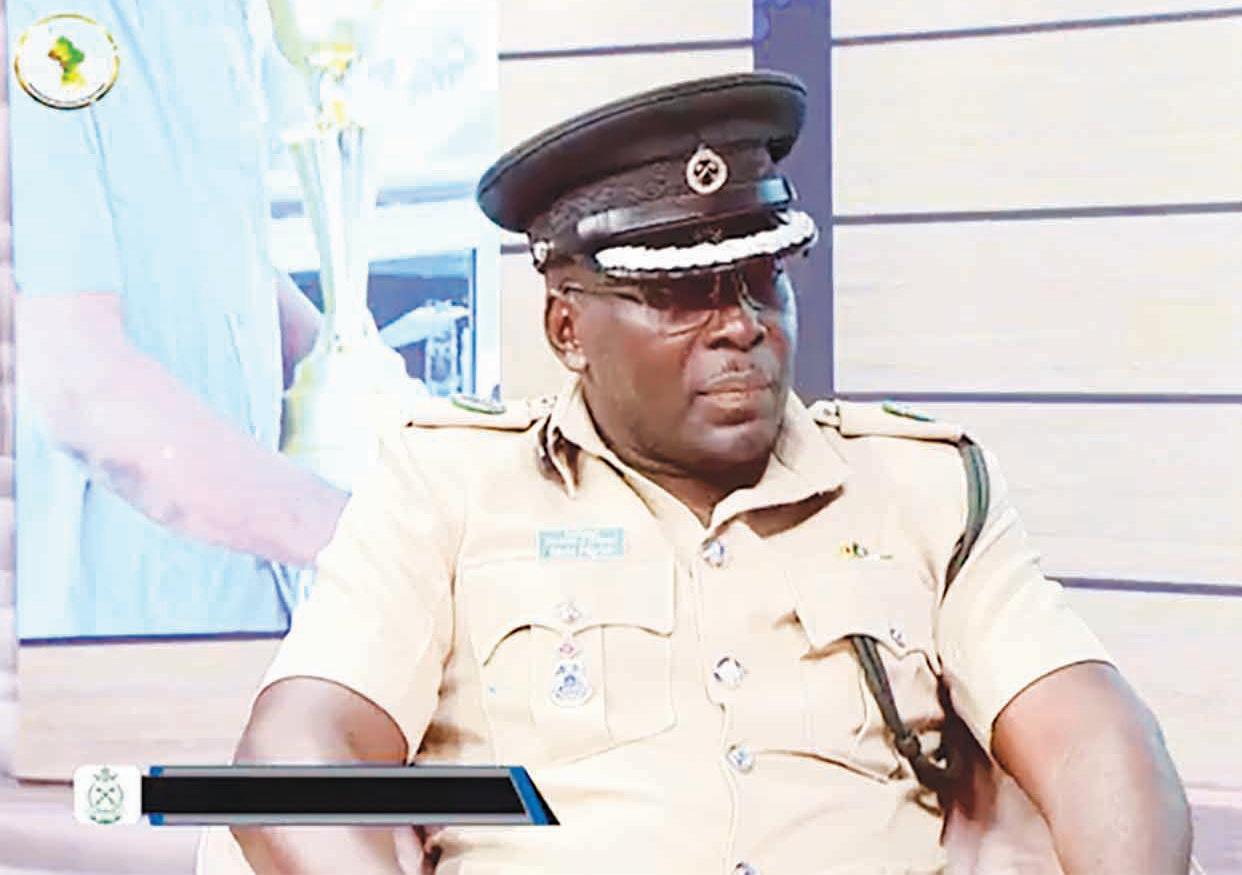
significant milestone for the service.
“That building was specifically designed with all of the features of a modern prison headquarters. Traditionally, all of the oth-
er buildings would have been; you have occupied those other buildings, but this was designed specifically for its purpose. But I just want to shift to, you talk about the dignity and the prison blocks in our mod-
ernisation drive, so we have eight pillars that are driving the strategic development of the service”, he said.
The new headquarters, which is worth over $400 million of the $4 billion is located within the Lusignan compound, and serves as a command centre for daily operations and monitoring. According to prison officials, the building is designed to integrate the latest security measures. “All of the surveillance feeds will come back to that centre,” one officer explained, noting that the hub gives administrators a “third eye” on activities across the facility. While much of the spending has gone into physical infrastructure, officials stressed that the investment is also tied to a philosophical shift.
“[Being] sent to prison is the punishment, not sent to prison for punishment,” a senior administrator told the programme’s host. “We are transitioning to a correctional service.” The funds have supported the construction of vocational workshops, a new training wing for staff and spaces aimed at family reconciliation programmes. Officials said these additions are intended to prepare inmates for reintegration into society while improving conditions for officers working inside the facility. The Lusignan Prison currently houses close to 1300 inmates, making it the largest in the country. Officials argue that the scale of investment was necessary to manage such a population and reduce overcrowding.


Local artiste and businesswoman Lolita Callender, popularly known as “Lola Doll”, has publicly identified the man she says tried to take her life during last weekend’s gun attack outside her East Ruimveldt home.
Speaking from her hospital bed in a cell-phone recorded video that quickly went viral, Lola Doll declared: “I saw the person that try to take my life, yes I saw him. I am happy that no bullet went to my head to kill me.” She went on to call on the Guyana Police Force (GPF) to deliver justice.
Shortly after the video began circulating, social media posts linked the shooting to Wayne Barker, the same man currently before the courts in connection with the 2024 abduction of Joshua David, known as “Bricks”.
Barker later surrendered to police in the company of his lawyer after his photo was widely shared online. Notably, police had not issued a wanted bulletin for


him at the time of his surrender. Lola Doll was shot several times last Saturday while seated in her car outside her home. CCTV footage captured a lone gunman on a motorcycle carrying out the attack. So far, police have arrested and released two other suspects during the probe. The first, detained hours after the shoot-
ing, was freed on $500,000 station bail after the mandatory 72-hour holding period expired.
Investigators later issued a wanted bulletin for United States (US)-sanctioned businessman Paul Daby Jr, also known as “Randell”. He was arrested and released on $1 million bail. In June, the US Department of the Treasury’s Office of Foreign Assets Control (OFAC) sanctioned Daby Jr and several others for alleged involvement in international cocaine trafficking networks. He was accused of helping move shipments from Colombia and Venezuela through Guyana to North America, Europe, and the Caribbean. The attack on Lola Doll, already notorious for its brazenness, now seems to have spiralled into an even wider saga, pulling in high-profile names already linked to past abduction and organised crime cases, as police investigations continue.

Tyrese Blair
A22-year-old taxi driver from Sophia, Greater Georgetown, was arrested on Friday after law enforcement officers discovered an unlicensed firearm and matching rounds of ammunition in his car.
According to reports, an intelligence-led operation was conducted by an intelligence officer and ranks of the Customs Anti-Narcotics Unit around 14:00h in

The firearm that was found in Blair’s car
the Sophia “D” Field area. During the exercise, ranks observed a white Toyota Allion, bearing registration number PAG 3549, parked on the western side of “D” Field Access Road. The ve-
Nevertheless, Mustapha had assured that Guyana continues to make representations at various forums, including at the Caribbean Fishing Authority, to ensure that the local fishermen get the permit to operate in Suriname’s water.
“We can’t bind them so that they have to give [the licences] to us… We work through the diplomatic channel, we work through the international channel, and we will continue to represent the fisherfolk,” the Agriculture Minister stressed.
However, stakehold-
ers in the local fishing industry, especially operators along the Corentyne, have been calling for the Guyana Government to apply more pressure on its Surinamese counterpart to resolve the fishing licences issue.
Dissatisfaction with lack of progress
Only last October, Vice President (VP) Dr Bharrat Jagdeo had expressed his dissatisfaction with the manner in which the Surinamese Government is handling the age-old fishing licence issue with Guyana.
“It’s utterly disgusting,”

VP Jagdeo declared when he was asked for an update on the matter.
According to the VP, who had in the past upset Surinamese officials with his strong condemnation on the matter, the system in the Dutch nation is very opaque.
“It’s a very opaque system, and the Surinamese Government has not been courageous enough to address it in a manner that would be consistent with good neighbourliness,” he had stated.
On the side-lines of the CARICOM Heads of
FROM PAGE 10
Government Conference held in Georgetown in February 2024, former President Santokhi had assured that this issue was on the agenda for dialogue between the two countries.
Asked by Guyana Times then whether there could be a resolution before the end of 2024, Santokhi, who has since been replaced by President Geerlings-Simons at the country’s May 2025 elections, had explained that there were some legal issues in Suriname that could require parliamentary amendments or a new agreement between the two countries.
hicle was locked and unoccupied at the time, while a group of men was seen loitering nearby.
Upon inquiry, 22-yearold taxi driver Tyrese Blair of Sophia identified himself as the owner of the car. A search of his person turned up nothing illegal, but when he opened the vehicle at the request of the officers, ranks discovered a black Beretta 9mm pistol without a serial number. The firearm, which was fitted with a magazine and five live 9mm rounds, had been concealed under the gear shift booth between the two front seats.
When questioned, Blair admitted that he did not possess a firearm licence. He was immediately arrested, informed of the offence, and escorted to the Turkeyen Police Station along with the seized car, firearm, and ammunition.
Blair remains in police custody as investigations continue.


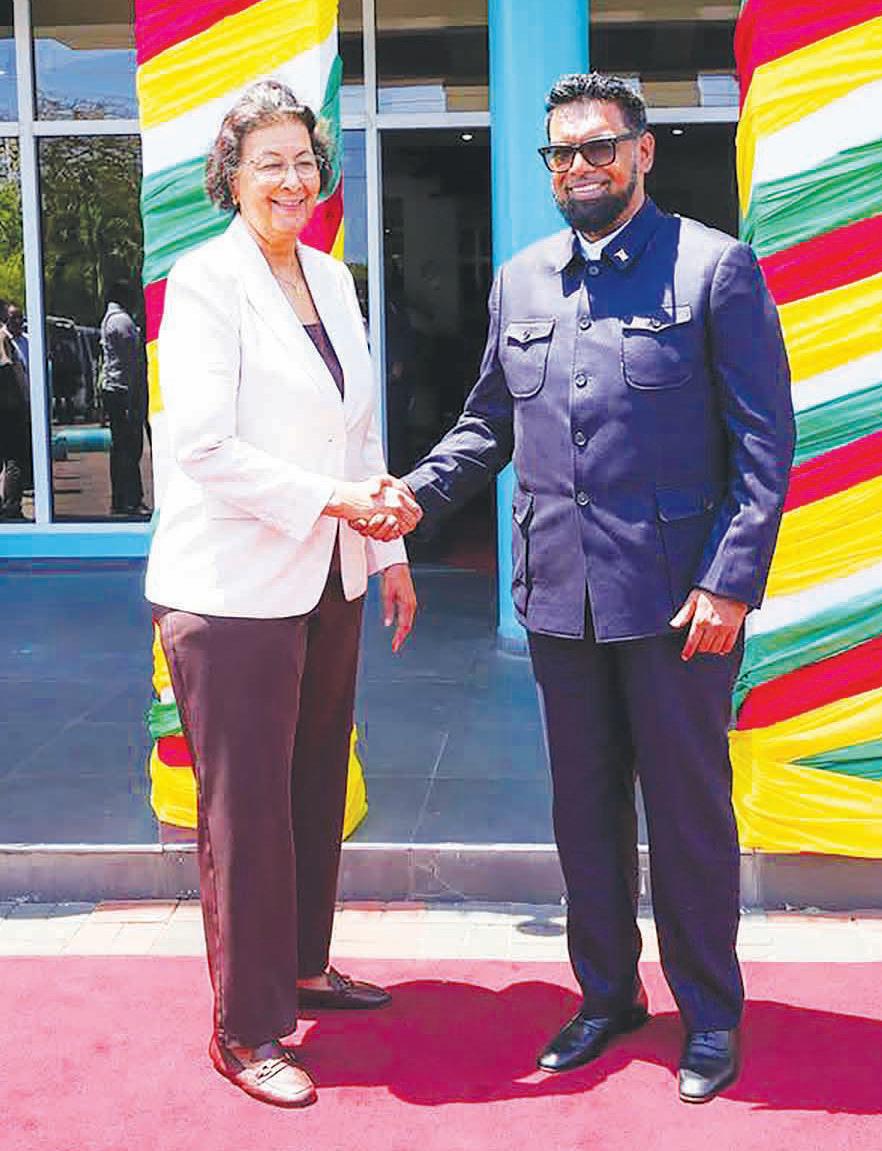
Gto South Drain in Suriname with a landing on Long Island in the Corentyne River, where a commercial hub and tourist destination will be established. That free zone will see major infrastructural development such as hotels, recreational parks, entertainment spots, tourist attractions, malls and farmers’ markets. This bridge project is one of the first agreements that was signed between President Ali and former Surinamese President Chandrikapersad Santokhi in their August 2020 cooperation pact. At the time, both leaders had underscored the critical role the bridge across the Corentyne River would play in advancing cooperation, creating more opportunities for development for the two nations. Meanwhile, both Guyana and Suriname have since settled on Chinese construction company, China Road and Bridge Corporation (CRBC), as the preferred contractor to build the new bridge.
International Monetary Fund (IMF), to restore its macroeconomic stability. But this programme makes it difficult for the Dutchspeaking country to take out loans, hence the snag in the process of securing financing for the bridge project. Both Guyana and Suriname are meant to share the cost of the bridge construction in a 50-50 arrangement.
In February 2024, former President Santokhi had admitted to the challenges his country faces when it comes to securing the financing for the Corentyne River Bridge project. “You know, our case is little bit different
because we are bind by the IMF Fund programme so we cannot take the loan. So, we need to be very pragmatic in this,” the Surinamese President had told reporters in February 2024 on the sidelines of the CARICOM Heads of Government Meeting in Georgetown.
Nevertheless, only last weekend, President Ali, during his inauguration speech after being swornin for a second term as Guyana’s ninth Executive President having been re-elected at the September 1 General and Regional Elections here, declared that in the next six weeks, plan-
ning and preparation will begin on the bridge across the Corentyne River with Suriname. The Guyanese leader subsequently met with Suriname’s Minister of Foreign Affairs, Melvin Bouva, at State House last Monday, to advance talks on development initiatives between the two countries. Those discussions focused on Guyana’s commitment to the Corentyne River Bridge project, collaboration with Suriname to resolve issues affecting fisherfolk, improving the efficiency of the Guyana–Suriname ferry system, and exploring joint investment opportunities.
uyana and Suriname have reiterated their commitment to advance with the highly-anticipated Corentyne River Bridge, which will link the two South American neighbours, by addressing key issues including technical and financial matters.
from both Governments in having this signature project completed… We have agreed to have a specific coordinating group look at addressing all outstanding issues, technical, financial and legal issues, so that we
However, it is unclear whether the contract has been signed.
Back in October 2024, Public Works Minister Juan Edghill had told Guyana Times that the contract between the contractor and

can advance this project in an efficient manner.”
President Dr Irfaan Ali travelled to Nieuw Nickerie, Suriname, on Saturday where he met with his counterpart, Her Excellency Jennifer Geerlings-Simons, to discuss a number of areas that will further strengthen economic and bilateral cooperation between the two countries. Recognising the potential for trade, tourism, connectivity and people-to-people exchanges, the two leaders pledged to have the timely advancement of this transformative project.
Speaking at a joint press conference following the meeting on Saturday, President Ali revealed, “Madam President and I have expressed commitment
Meanwhile, President Geerlings-Simons noted that since 2010, Suriname had indicated its interest in bridging the Corentyne River, which is largely the territory of the Dutch nation, to connect the two neighbouring countries. She pointed out that once the various technical, financial and legal matters are sorted out, works will be fast-tracked to implement this significant infrastructure project that will be key for further connections into South America and the Amazon region. The highspan Corentyne River bridge will run approximately 3.1 kilometres (km), connecting Moleson Creek in Guyana
the two countries would be signed as soon as the financing mechanism for the bridge is sorted out.
Both Guyana and Suriname had written the Government of China for financing of the bridge project. Guyana Times was previously told by a senior Guyana Government official that the Chinese Government is willing to fund the project given its close bilateral relations with both Caribbean Community (CARICOM) Member States. However, the issue lies in Suriname’s economic situation. As part of its economic recovery programme, the Surinamese Government signed a structural adjustment programme with the
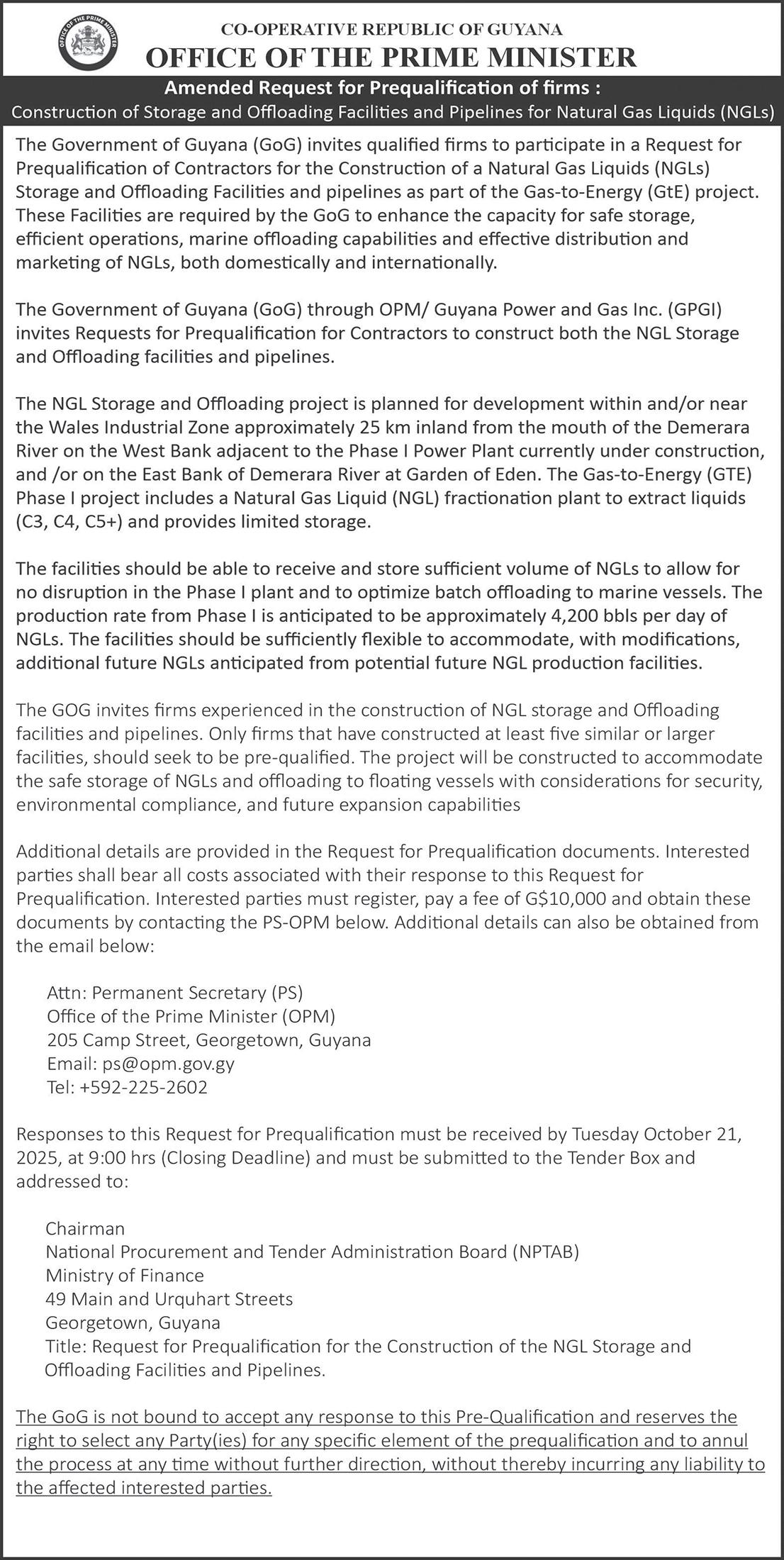

Career diplomat Ambassador Elisabeth Anne Harper has died after a period of illness. She was 67 years of age at the time of her death on Saturday.
She last served as Guyana’s Ambassador to the Caribbean Community (CARICOM) and Permanent Secretary in the Ministry of Foreign Affairs and International Cooperation, where she also previously served as Director General.
“...our Foreign Service has lost one of its finest ever” – Pres Ali
Following her death, messages of condolence poured in from various officials, including President Dr Irfaan Ali, who described Harper as one of Guyana’s most outstanding citizens and foremost diplomats.
“Her distinguished career in the Foreign Service was marked by excellence, dedication, and an unyielding commitment to the advancement of our nation’s interests… Guyana has truly lost an outstanding citizen, and our Foreign Service has lost one of its finest ever,” he said in a statement on Saturday evening.
According to the Head of State, Ambassador Harper was an extremely knowledgeable diplomat, whose insights and experience enriched every sphere in which she worked. As Guyana’s Ambassador to CARICOM, he said she represented the country with dignity and distinction, earning the respect of colleagues across the region and beyond.
“Ambassador Harper will be remembered not only for her professional brilliance but also for her engaging personality and the warmth with which she approached all those around her. She was gifted with exceptional organisational skills and brought clarity and order to every task she undertook.”
“On behalf of a grateful nation, I extend my deepest condolences to her family, relatives, former colleagues, and friends. Her passing is a monumental loss for our country, but her legacy of service, dedication, and excellence will continue to inspire generations to come,” President Ali noted.
Messages of condolence
Similar sentiments were expressed by Vice President and General Secretary (GS) of the People’s Progressive Party/Civic (PPP/C), Dr Bharrat Jagdeo. He said Ambassador Harper was a distinguished diplomat and public servant who gave decades of dedicated service to Guyana.
“I had the privilege of working closely with her
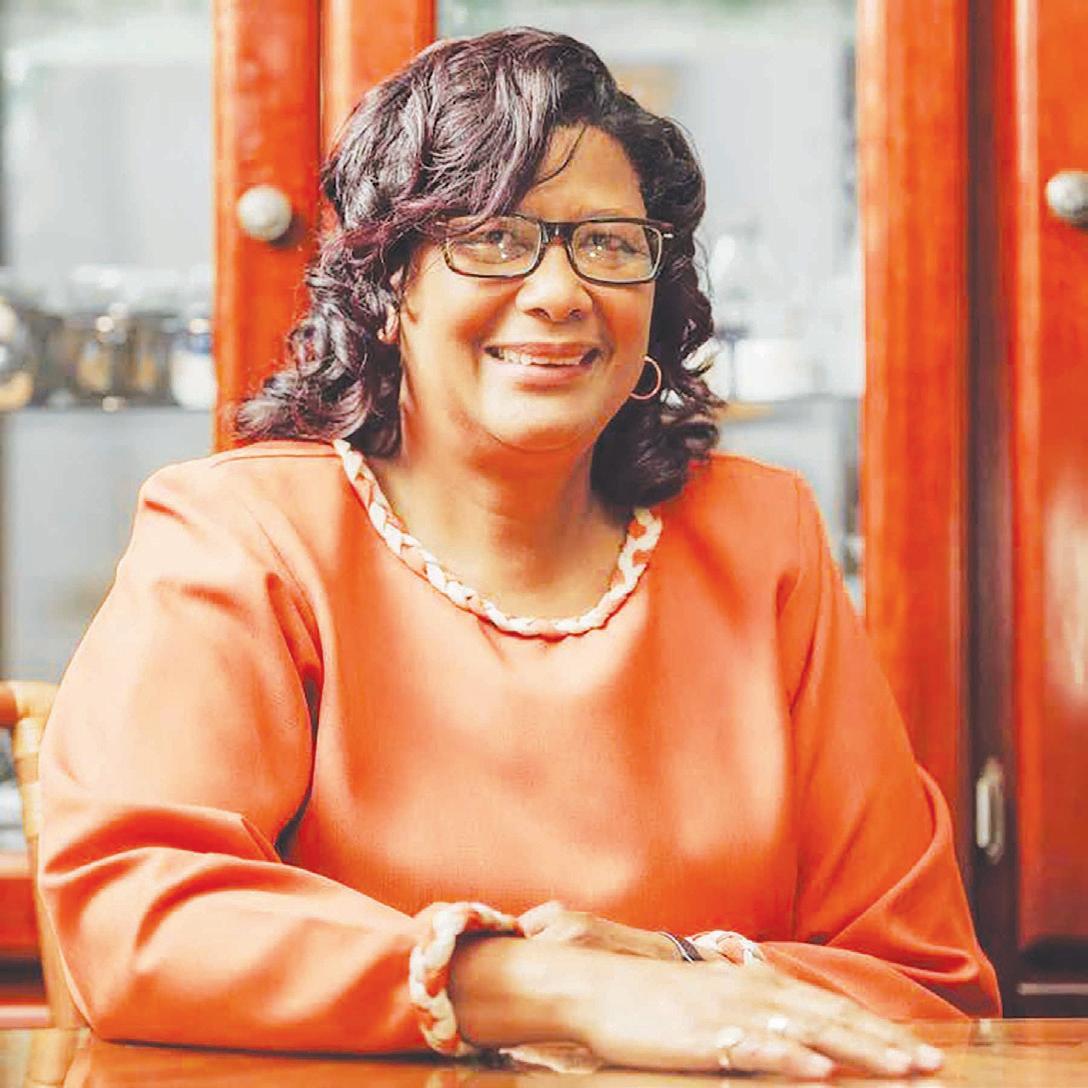
during my presidency and witnessed first-hand her professionalism, wisdom, and commitment to advancing Guyana’s national interests,” Jagdeo stated.
Harper had served as the PPP/C’s Prime Ministerial candidate at the 2015 General And Regional Elections alongside then president Donald Ramotar, and according to the party’s GS, she is bringing the same dedication and integrity to that campaign trail that defined her career in public service.
“On behalf of the People’s Progressive Party, I extend heartfelt condolences to her family, friends, and colleagues. Her legacy of service will be remembered with great respect. May her soul rest in eternal peace,” the GS stated.
Meanwhile, the Ministry of Foreign Affairs and International Cooperation, in a statement on Saturday announcing her passing, said Ambassador Harper joined the Ministry in 1976 and had since dedicated her life to the Foreign Service, during which she served with distinction in every position.
“She will be remembered for her distinguished service, humility, and unwavering commitment to serve her country and the people of Guyana,” the ministry said.
Senior official of the A Partnership for National Unity (APNU), Ganesh Mahipaul, in a social media post on Saturday evening, described Ambassador Harper as one of the most professional and outstanding career diplomats.
Recalling his first interaction with her in 2021, Mahipaul said, “I admired her depth, composure, and professionalism… To now learn of her passing is truly saddening. I always held her in the highest regard.”
Also extending condolences was the Alliance For Change (AFC) party,

rotecting the sky above us starts with action on the ground.
On September 16, Guyana will join the rest of the world in observing the International Day for the Preservation of the Ozone Layer – an annual event designated by the United Nations since 1987 to commemorate the signing of the Montreal Protocol on Substances that Deplete the Ozone Layer.
The Protocol is widely regarded as the most successful environmental agreement in history, bringing countries together to phase out chemicals responsible for damaging the Ozone Layer. This protocol was developed under the Vienna Convention, adopted in 1985.
Therefore, this year marks 40 years since the Vienna Convention for the Protection of the Ozone Layer, a landmark treaty that laid the groundwork for the Montreal Protocol and the subsequent actions thereafter, was established.

coordinating and monitoring all activities towards the smooth phase-out of man-made Ozone Depleting Substances (ODS) in Guyana.
Through the NOAU, Guyana monitors and licenses the importation of refrigerants and related equipment to ensure they meet international standards. It also provides training and certification for refrigeration and airconditioning technicians, helping them safely handle and dispose of controlled substances.
which said Ambassador Harper’s dedication to public service, diplomacy, and her country leaves a legacy that all Guyanese can be proud of.
“Elisabeth Harper was a trailblazer in many ways… She played a pivotal role in safeguarding Guyana’s sovereignty and border security and was instrumental in representing Guyana in regional and international fora (Caricom, UN, Commonwealth, among others)… We mourn not just an Ambassador and public servant, but a woman whose life and work challenged barriers and inspired many,” the AFC noted.
Moreover, the Amanza Walton-Desir-led Forward Guyana Movement (FGM) party also extended condolences on the passing of Ambassador Harper, saying she exemplified integrity, professionalism, and love for country. Her journey, the party said, marked by excellence in scholarship and diplomacy, brought honour to Guyana at home and abroad.
The British High Commission in Georgetown was also deeply saddened by the passing of Ambassador Elizabeth Harper, stating in a social media post on Saturday evening that her “…dedicated service to Guyana leaves a lasting legacy.”
Distinguished career
Born in Kitty, Georgetown, on October 2, 1957, Elisabeth Anne Harper was a devout Christian and was married to Mark Harper. Between them, they have five children.
After obtaining a Bachelor of Arts Degree in French from the University of Guyana in 1986, passing with Honours, Mrs Harper also attended the University of Oxford, where she attained a Certificate in Diplomatic Studies in 1990.
This year’s theme, “From Science to Global Action”, highlights the journey from the scientific discovery of ozone depletion to the collective global response that led to its protection and recovery through agreements like the Montreal Protocol and the Kigali Amendment. It celebrates how research-motivated policies, industrial adaptations and public awareness have culminated in one of the most successful environmental treaties in history.
Through these global efforts to preserve the Ozone Layer, there have also been additional benefits, such as reducing greenhouse gas emissions and the impacts of climate change.
The Ozone Layer, a thin shield high up in the stratosphere, plays a vital role in protecting all life on Earth from the sun’s harmful ultraviolet (UV) radiation. Without it, human health, food security, ecosystems, and economies would all be at risk.
For Guyana, protecting the ozone is also closely linked to the broader fight against climate change and efforts to build a sustainable future.
The Importance of Protecting the Ozone Layer
The Ozone Layer reduces the amount of UV radiation that reaches the Earth’s surface. Excessive exposure can lead to skin cancer, eye cataracts, and weakened immune systems in humans, while also threatening agriculture, livestock, fisheries, and forests.
For a country like Guyana, where communities depend heavily on farming, fishing and outdoor livelihoods, protecting the Ozone Layer safeguards not only public health but also food security and natural resources.
Globally, the Montreal Protocol has already achieved remarkable success. The use of harmful ozone-depleting substances (ODS), such as chlorofluorocarbons (CFCs), has been phased out worldwide, and the Ozone Layer is on track to recover to 1980 levels by the middle of this century.
This is proof that, when countries work together with the support of scientific research, real progress is possible.
Key Issues in Guyana
While Guyana has made important strides, several challenges remain, including:
Refrigeration and air-conditioning systems still rely on chemicals such as hydrochlorofluorocarbons (HCFCs), which are less damaging than earlier ozone-depleting substances but are still harmful and contribute to climate change.
Some technicians and businesses lack proper training in the safe recovery, recycling and disposal of refrigerants, leading to unnecessary emissions.
Many citizens are not fully aware of how everyday actions like discarding old refrigerators or using uncertified AC units can affect the Ozone Layer.
Additionally, because Guyana relies heavily on imported cooling equipment, regulation and monitoring are critical to prevent the entry of harmful substances.
The National Ozone Action Unit (NOAU) of the Hydrometeorological Service, Ministry of Agriculture, leads the country’s efforts under the Montreal Protocol to protect the Ozone Layer.
The NOAU is the country’s focal point for the Montreal Protocol and has been responsible for

The Environmental Protection Agency (EPA) also plays a critical role in Guyana’s efforts to protect the Ozone Layer through supporting public education, outreach, and environmental communication.
The EPA and NOAU have jointly held seminars and awareness campaigns, targeting schools and communities to lift public understanding of Ozone Layer protection – highlighting not only the science but also actionable behaviours like avoiding CFC-containing products and promoting safe refrigeration practices. The EPA contributes through its licensing process, also ensuring compliance with international treaties and multilateral environmental agreements.
Public awareness is another key part of the Agency’s work, with workshops, media outreach, and school programmes teaching citizens about ozone protection and the benefits of energyefficient cooling.
The EPA also promotes ozone-friendly and climate-friendly technologies, reducing reliance on harmful chemicals while supporting Guyana’s transition to a greener, more sustainable economy.
Through these efforts, the EPA plays a vital role in protecting the environment and contributing to global actions to safeguard the Ozone Layer and combat climate change.
Working Together for a Cleaner Guyana
Protecting the Ozone Layer requires collective responsibility. Citizens can help by choosing energy-efficient appliances, maintaining airconditioning and refrigeration systems properly, and ensuring safe disposal of old equipment.
Businesses in the refrigeration and cooling sector must comply with EPA regulations, use certified technicians, and adopt sustainable practices that prevent emissions. Communities also have an important role to play by sharing information, discouraging unsafe practices, and advocating for cleaner technologies.
By working together, we can protect the Ozone Layer while also reducing greenhouse gas emissions that drive climate change. This shared responsibility strengthens Guyana’s ability to safeguard public health, protect livelihoods, and build resilience to environmental challenges.
The International Day for the Preservation of the Ozone Layer is more than a global observance; it is a reminder that progress is possible when science, policy, and people unite.
Guyana continues to play its part in ensuring the success of the Montreal Protocol and in protecting its citizens, environment and economy from the harmful effects of ozone depletion.
The EPA encourages every Guyanese to use certified technicians, choose ozone-friendly appliances, and spread awareness within their communities.
Together, we can preserve the Ozone Layer, reduce climate change impacts, and secure a healthier, safer, and more resilient future for Guyana.
You can share your ideas and questions by sending letters to “The Environmental Protection Agency”, C/O Communications Department, Ganges Street, Sophia, GEORGETOWN, or email us at communications@epaguyana.org. Follow us on Facebook and Instagram, and subscribe to our YouTube channel.

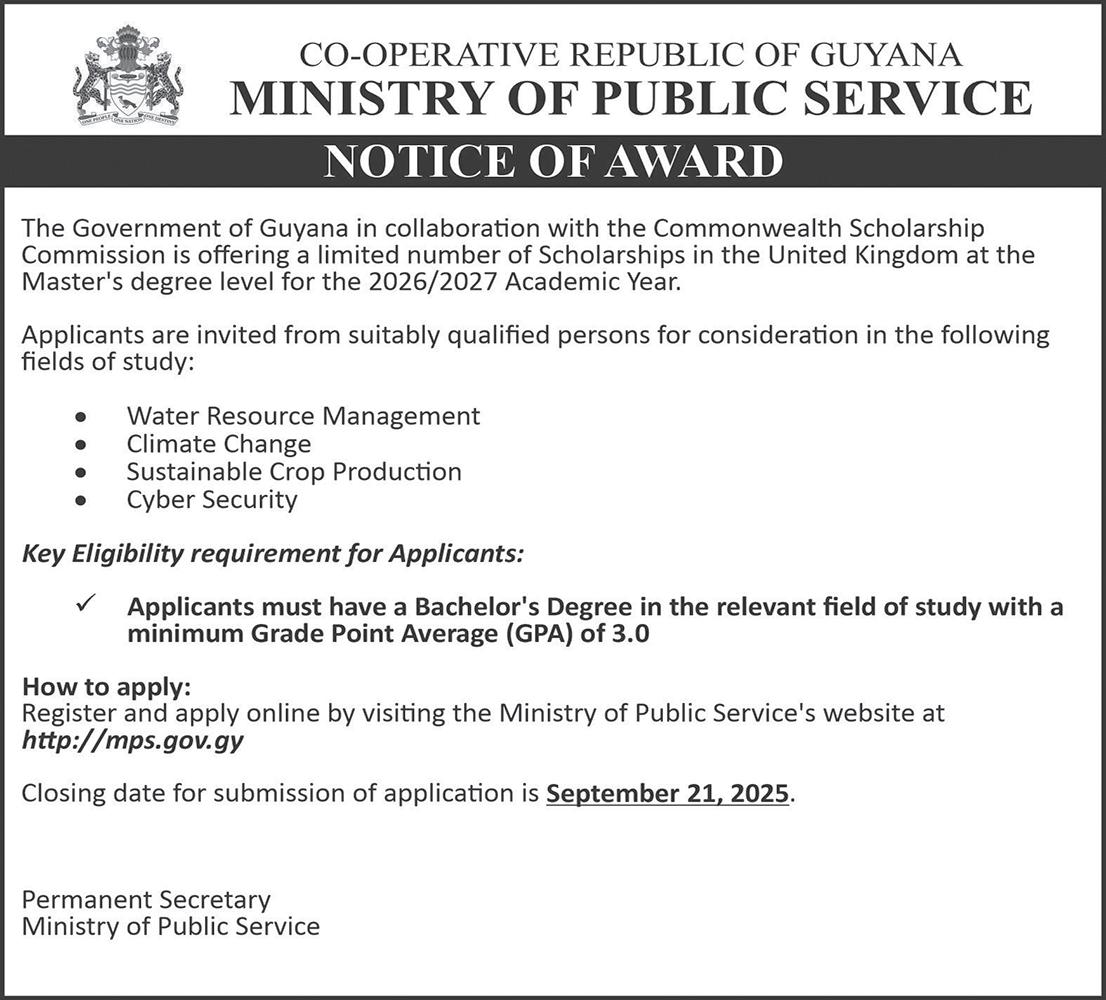
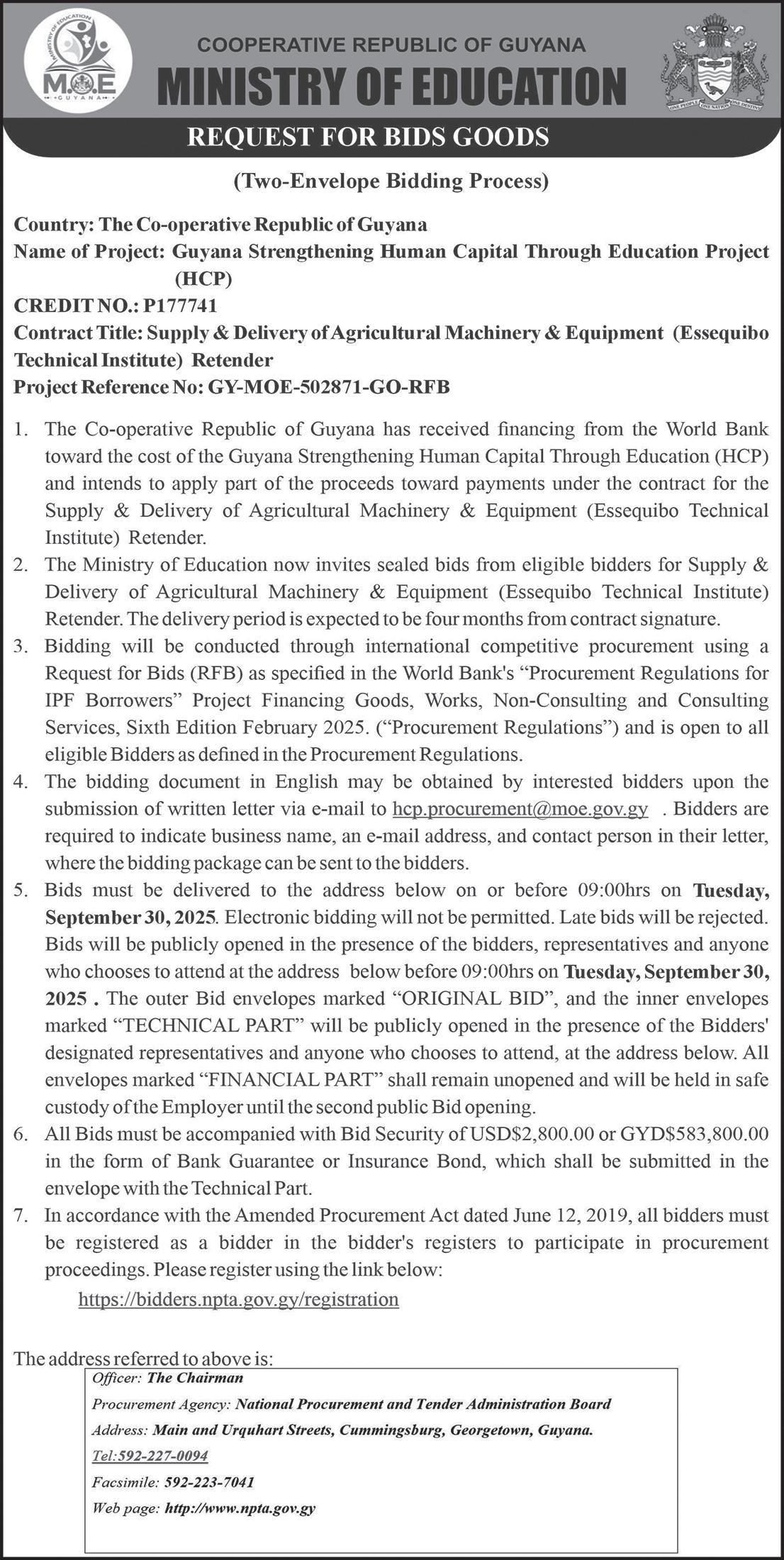
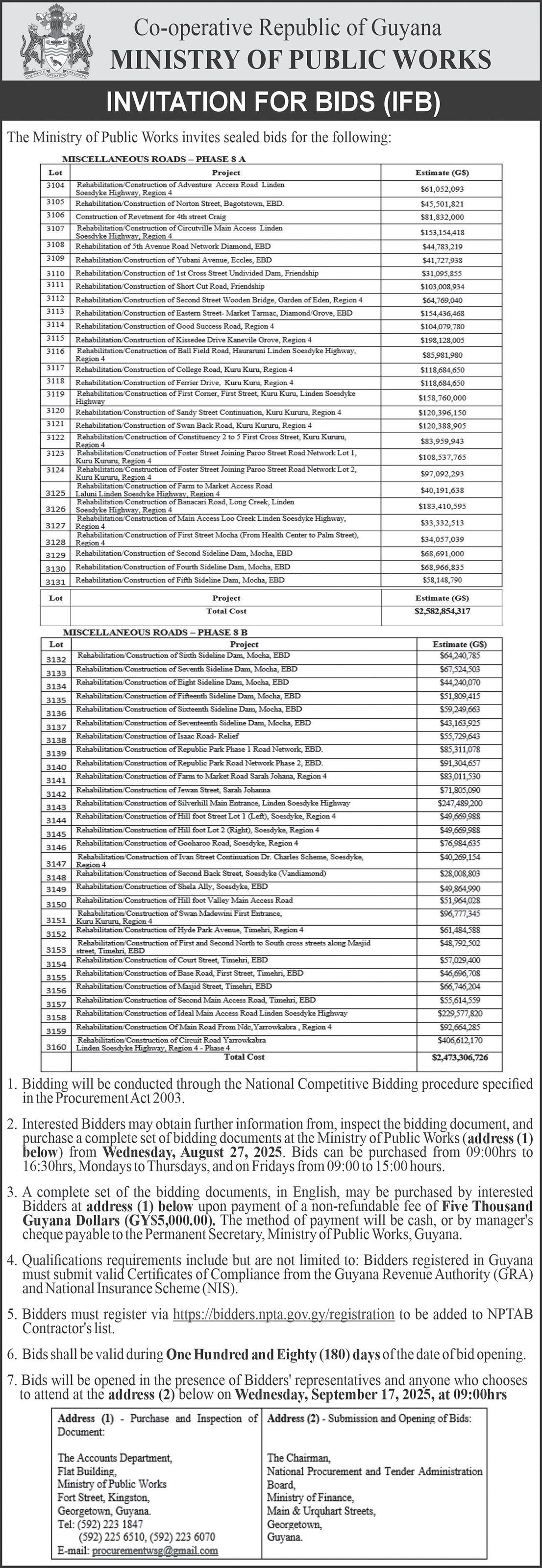

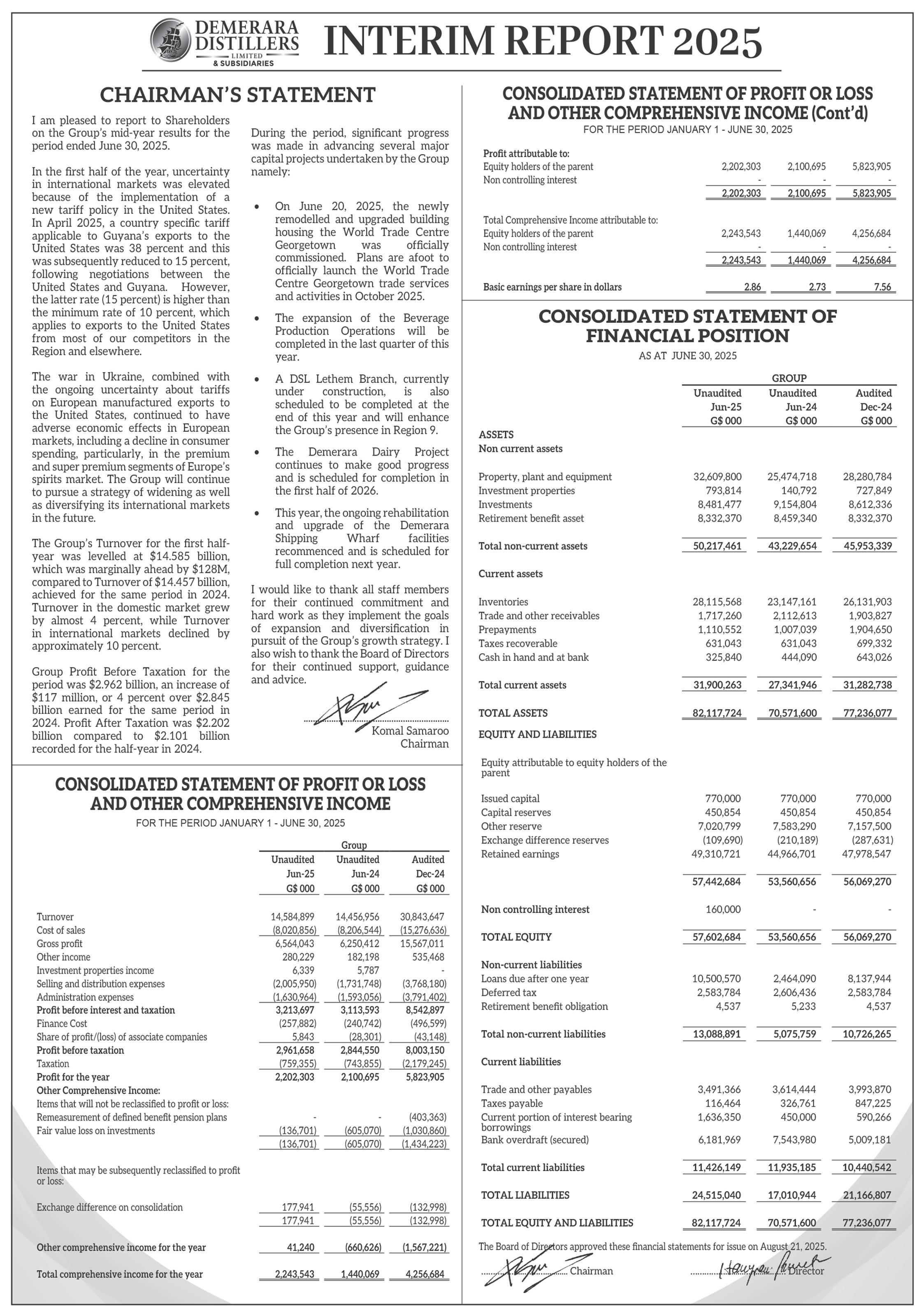

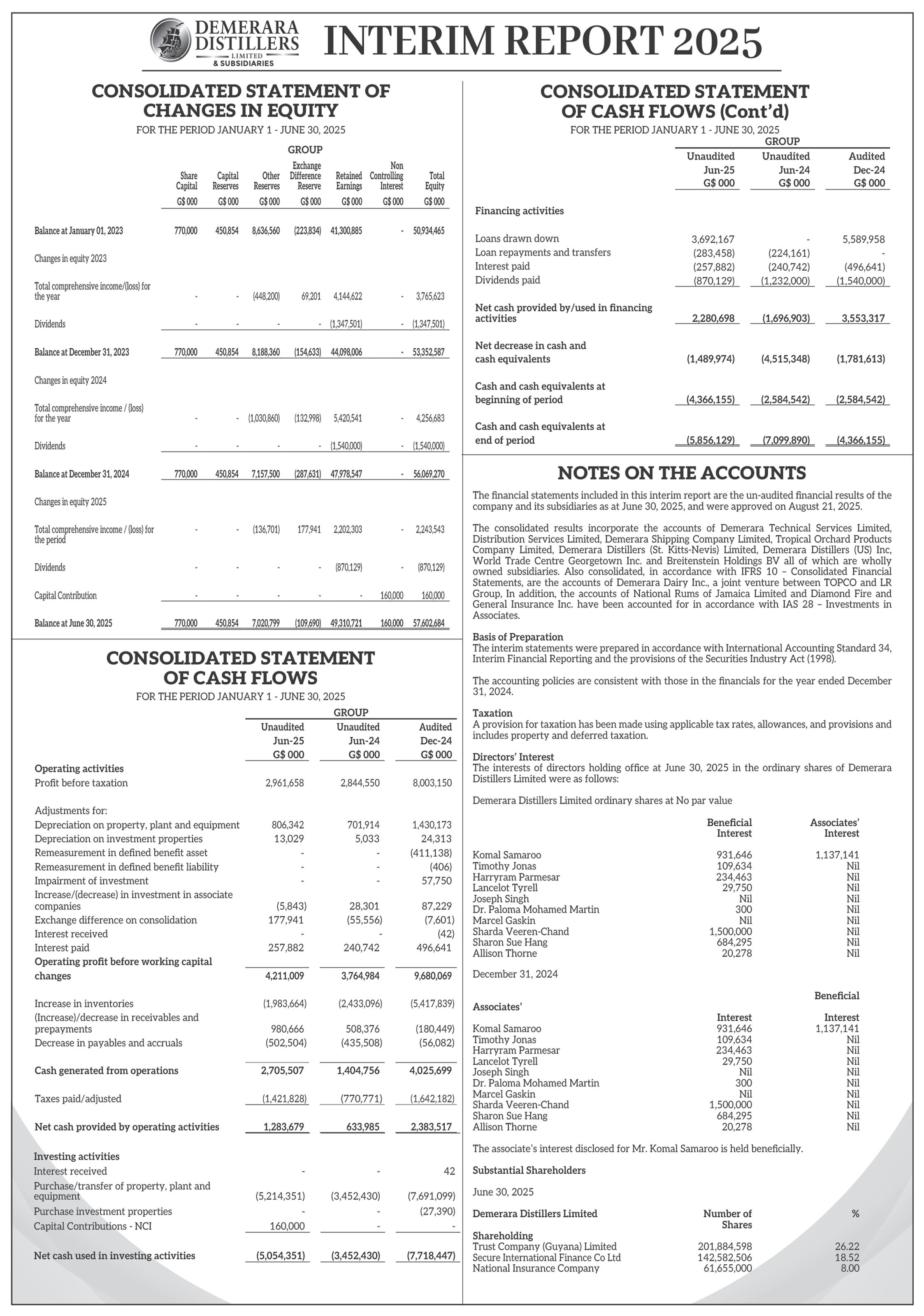

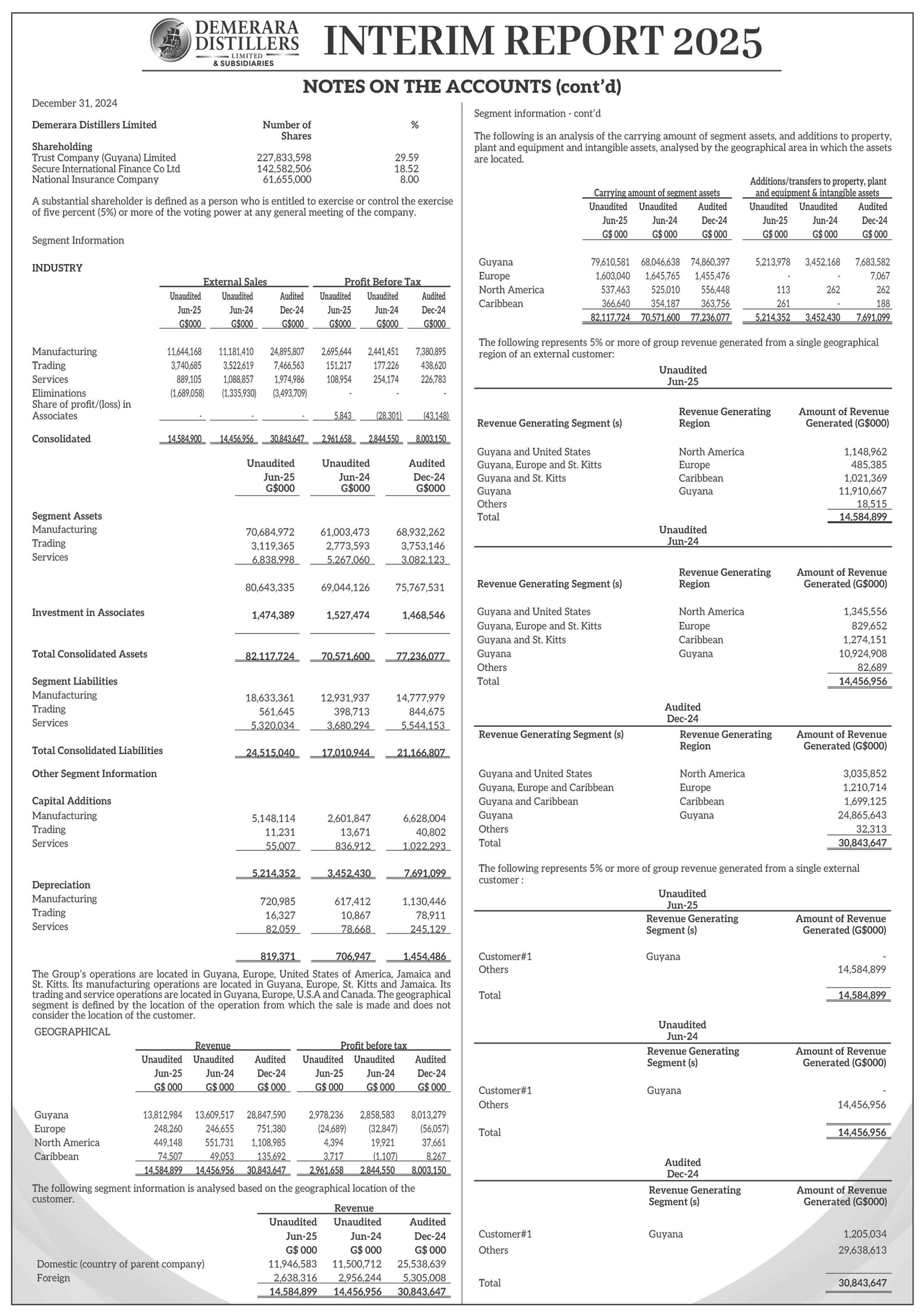

President Dr Irfaan Ali has announced several new Members of Parliament (MPs) who will represent the governing People’s Progressive Party/Civic (PPP/C) in the 13th Parliament. The list includes attorney James Bond, former Minister Anand Persaud, Indigenous leader Lenox Shuman, businessman and Guyana’s Chief Investment Officer Peter Ramsaroop, attorney Sanjeev Datadin, and Sonia Latchman. They will join the newly sworn-in Cabinet in representing the PPP/C’s majority in the National Assembly.
In addition, Thandi McAllister and Mischka White-Griffith have been appointed Parliamentary secretaries. Both are expected to provide key support to the Government’s Parliamentary agenda.
The selection of the group marks a significant political shift, given that most of them were once high-profile members of A Partnership for National Unity (APNU). In fact, James Bond resigned from the party ahead of the 2025 elections, joining a growing list of APNU
defectors dissatisfied with Aubrey Norton’s leadership. Among others who left the People’s National Congress (PNC) are Dr Richard VanWest Charles and Thandi McAllister, who now finds herself serving under the PPP/C Government.
New advisors
Alongside the new Parliamentary team, President Ali has also appointed new advisors. Former Minister of Home Affairs Robeson Benn has been named Senior Advisor on Home Affairs and Natural Resources. He was succeeded in the Cabinet by Oneidge Walrond, who previously held the Tourism, Industry and Commerce portfolio. Meanwhile, former Labour Minister Joseph Hamilton has been appointed Advisor in Labour and Manpower Planning, with his former Ministerial seat now occupied by newcomer Keoma Griffith.
Speaking at the swearing-in event, President Ali praised the PPP/C’s landslide electoral victory, describing it as the product of “hard work, relentless sacrifices, and the trust of or-
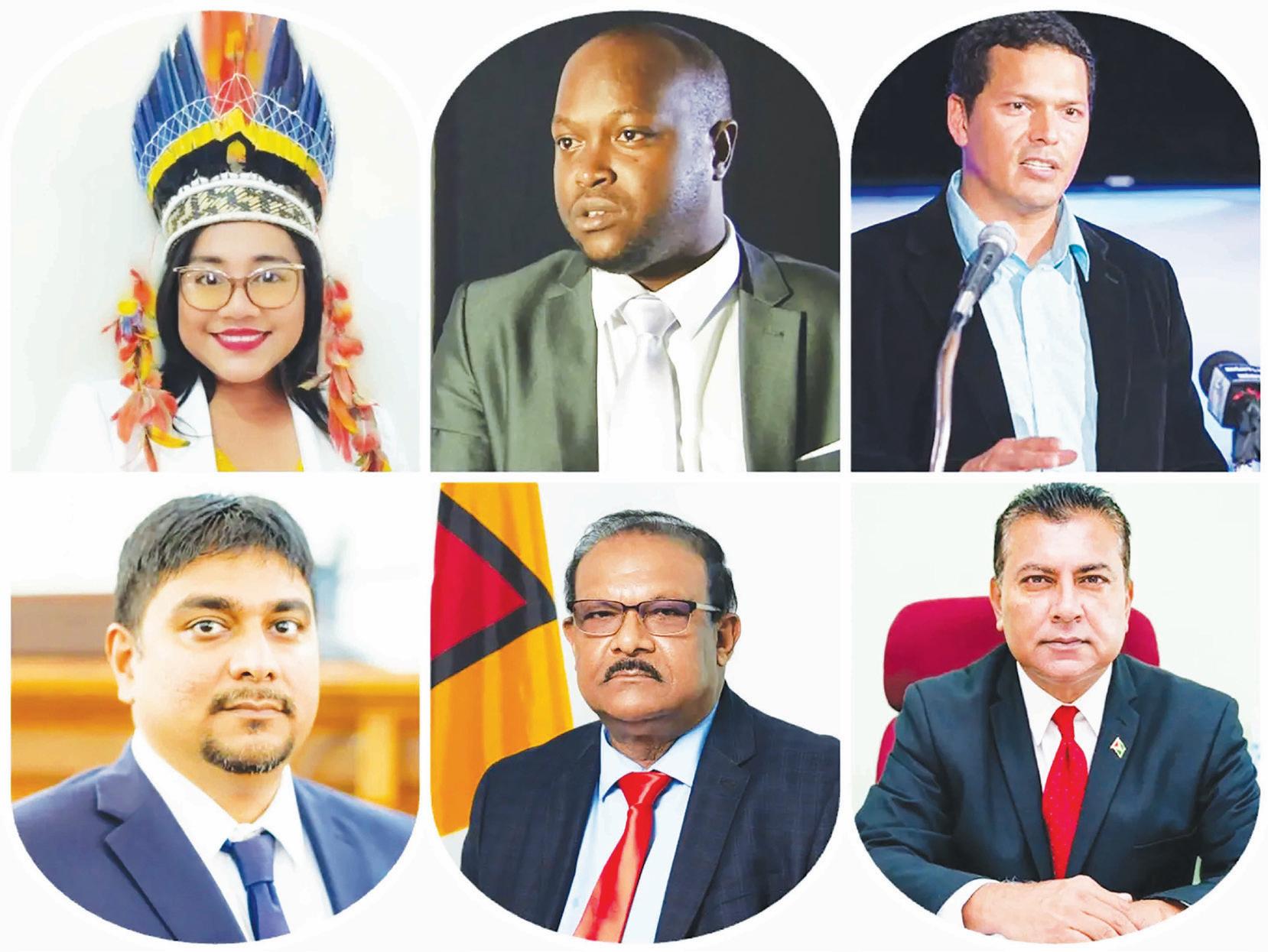
dinary Guyanese.” He emphasised that the win was not only a celebration of the party’s vision but also a mandate to deliver transformative results for citizens across the country.
“The next five years are the most decisive years in our history,” the President said. “They must be years that are results-driven, peo-
New portfolios
Meanwhile, several Ministers were reassigned to new portfolios. Priya Manickchand, who previously served as Minister of Education, is now the Minister of Local Government and Regional Development, supported by Pauline Sukhai, the former Minister of Amerindian Affairs, as Minister within that Ministry.
Additionally, Oneidge Walrond, who once held the Tourism, Industry and Commerce portfolio, now heads the Ministry of Home Affairs. Sonia Parag, formerly Minister of Local Government, has taken up the Education portfolio, while Susan Rodrigues, who previously served as Minister within Housing and Water, now leads the Ministry of Tourism, Industry and Commerce.
Newcomers
Moreover, the new Cabinet also introduces fresh faces and youthful leadership. Sarah Brown replaces Pauline Sukhai as Minister of Amerindian Affairs, while Zulfikar Ally has been appointed Minister of Public Service, Government Efficiency and Implementation. Keoma Griffith takes over as Minister of Labour and Manpower Planning, replacing Joseph Hamilton, and Vikash Ramkissoon has joined as Minister within the Ministry of Agriculture. Former cricketer Steven Jacobs has been tapped as Minister with-
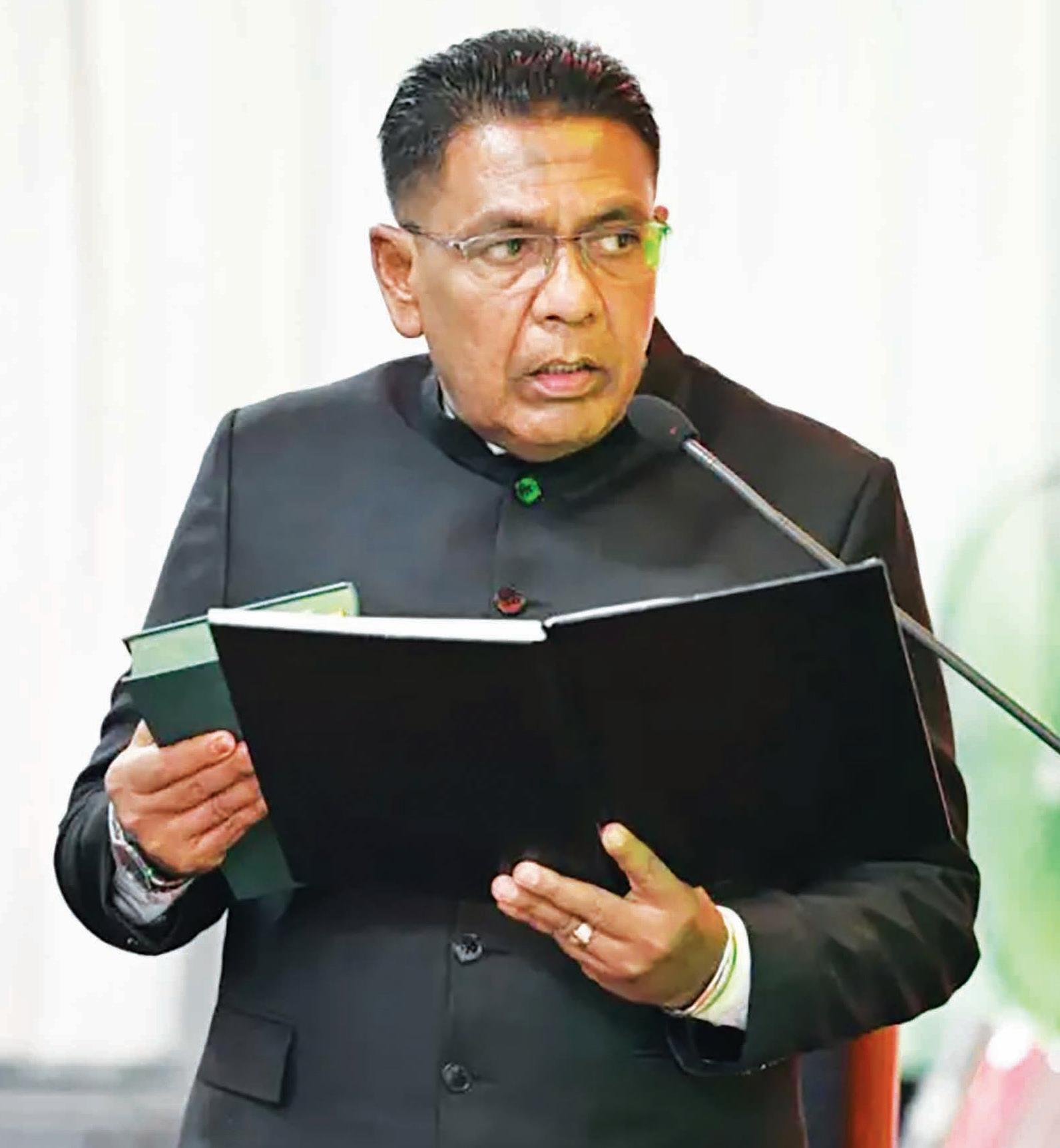
in the Ministry of Culture, Youth and Sport, while Vanessa Benn now serves as Minister within the Ministry of Housing, replacing Susan Rodrigues.
President Ali told his team that the coming term will require urgency, cohesion, and accountability. He stressed that Government service must translate into tangible improvements in healthcare, education, infrastructure, and overall quality of life for every Guyanese household.
“The appointments to Cabinet were not made lightly. Great consideration was given to every portfolio and what we want to achieve, and the speed at which we want to achieve these results. The choic-
es were never about competition… The people of Guyana deserve leadership that is steady and unified. Leadership that places service above self, and leadership that converts policy into tangible improvements in the lives of our citizens.”
“Our transformative programme for the next five years is ambitious. It demands urgency, but it also demands accountability. We are tasked with building infrastructure that will connect our regions, modernising institutions that will safeguard our democracy, reforming the systems that deliver health care and education, and diversifying the economy to ensure prosperity for generations to come,” he added.
ple-centred, and marked by the efficient delivery of service.”
“Speaking about the necessity to get the ground running. Speaking about the clarity of the vision and the level of effort that is required to achieve that vision. And I know also that our country has expectations, and one such expectation was to see massive changes and shifts,” the Head of State added.
He underscored that the responsibility of governance extended beyond Ministers, reaching advi-
sors, Parliamentarians, and technical officers tasked with ensuring that the administration’s programmes are effectively implemented. Ali stressed that every appointment was made with consideration for the speed and scale of results expected by the Guyanese people.
“And those who are coming in the whole arm of Government, you have that responsibility too, because we are all part of this process. So the individuals upon whom the solemn oath, the duty of Ministerial
responsibility, advisory responsibility, Parliamentary responsibility, and technical responsibility will be conferred would have all been entrusted with portfolios and responsibilities for the delivery of our programme and the delivery of our plan. Together with me, the Prime Minister, the Vice President, and the rest of the Cabinet, the advisors, and the technical people that will form part of this team, including our members of Parliament, we intend to deliver to the people of this country upon all the commitments and promises we would have made.”
“Whether you serve in the Cabinet, in the Parliament, in the Advisory Council, or in the Technical Support Council, all of you. And importantly, to those who will form the foundation of the success of the Government. Those who work on the ground, in the communities, in the region,” Ali stated.
The governing People’s Progressive Party Civic (PPP/C) swept the polls with a commanding 242,498 votes, earning 36 seats and retaining control of the National Assembly.
With 36 seats secured, the PPP/C dominates the new Parliament, positioning itself to advance its ambitious development agenda with strong backing both inside and outside the House.


Prime Minister Brigadier (Ret’d) the Honourable Mark Phillips was on Saturday presented with a copy of “Leech”, the debut novel by Guyanese writer and editor Jasmaine Payne, at the Office of the Prime Minister on Camp Street.
According to the PM on his social media page, discussions during the visit focused on creative writing, the literary arts in Guyana, and Payne’s future research and work.
Prime Minister Phillips expressed his appreciation for the gesture, noting that the novel represents “a valuable addition to Guyana’s growing body of literary work.”
With more than 15 years of experience in journalism and a passion for psychological thrillers, Ms Payne has become the first female Guyanese author to publish a full-length psychological thriller with the release of her first novel.
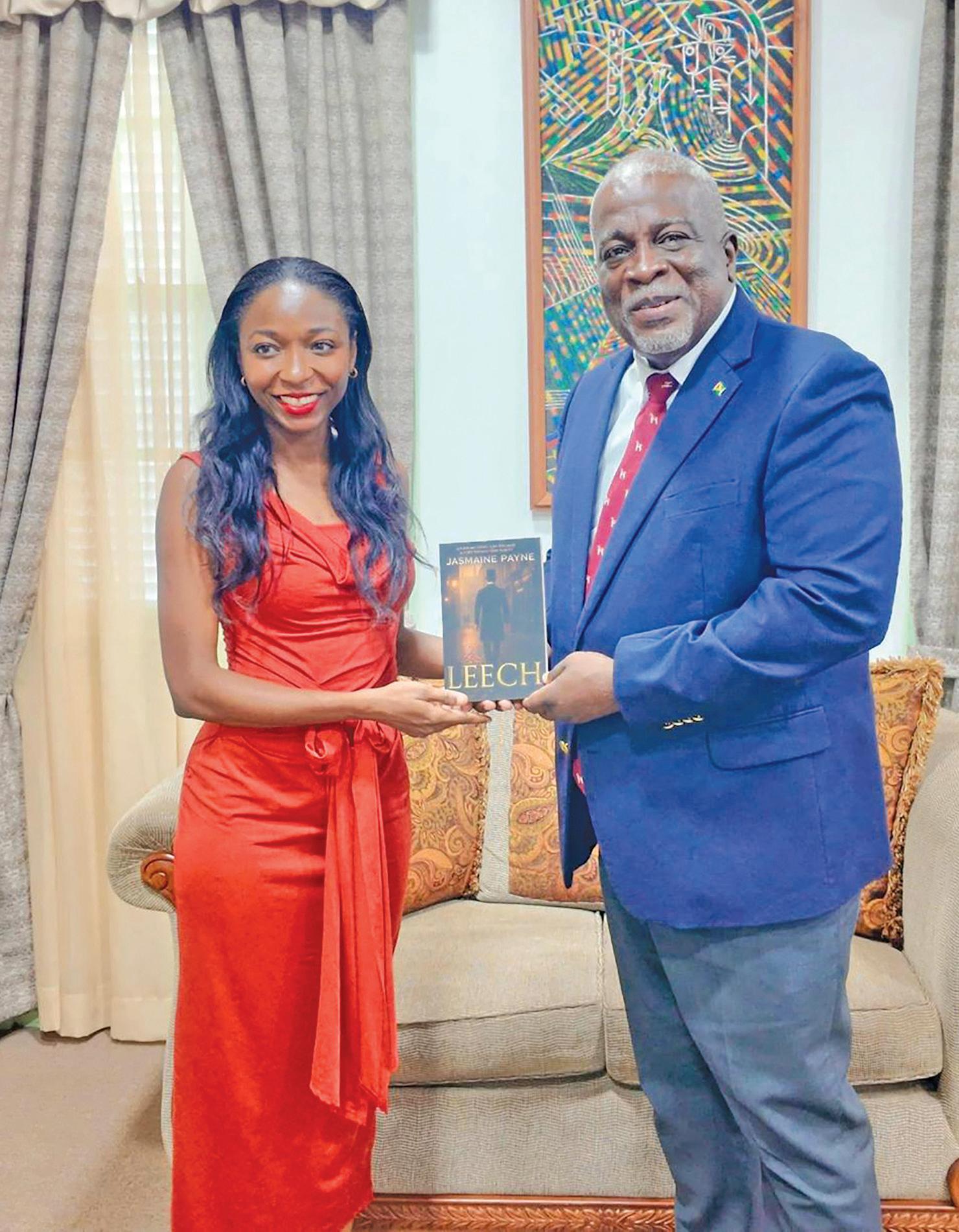
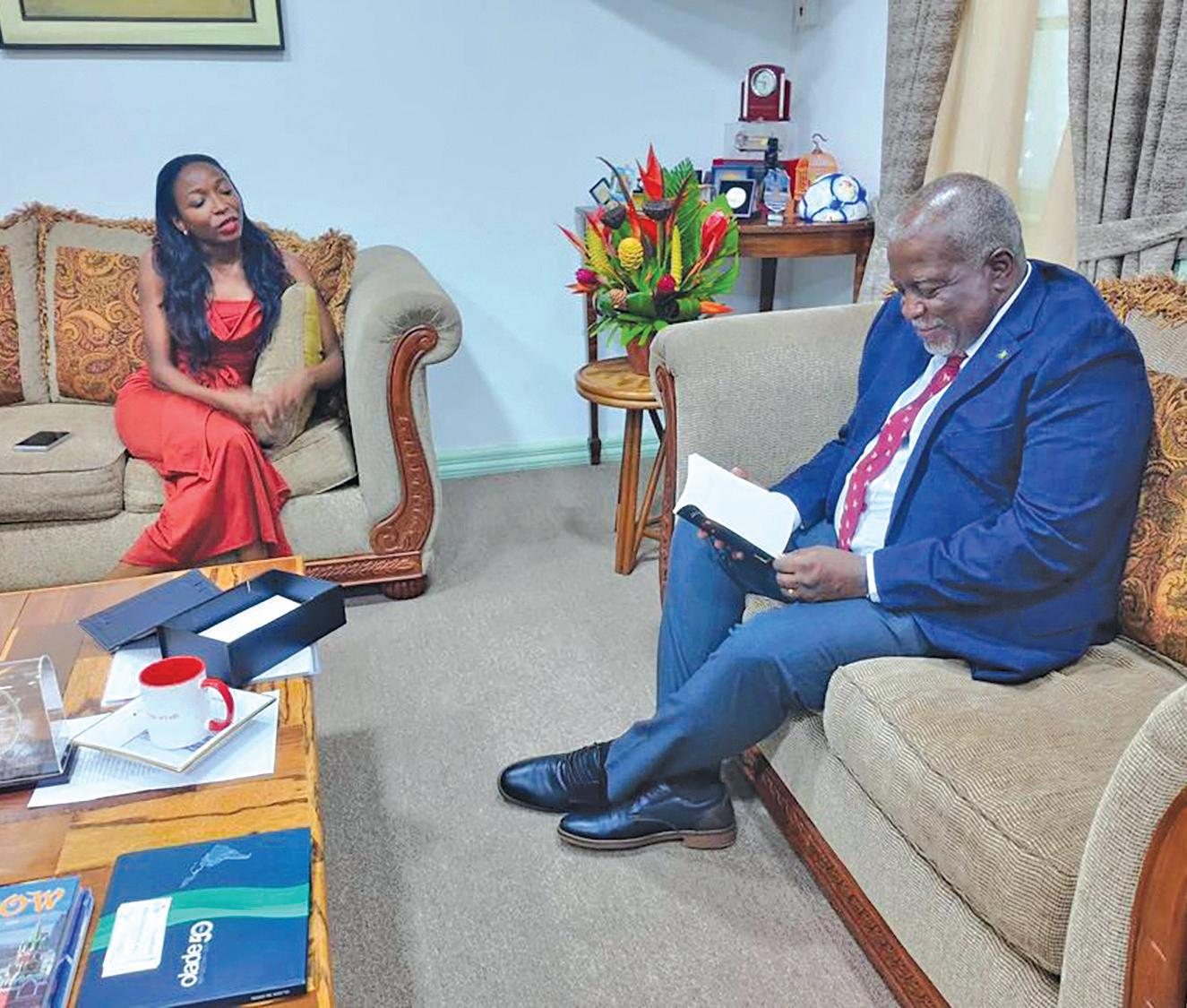

The country’s coastal communities have long lived with flooding but as climate change accelerates rising sea levels and reclamation projects reshape Manila Bay, residents now see their homes under water more often.
As residents wade through a flooded street on Tibaguin Island, Hagonoy, a municipality on Luzon, the Philippines’ largest and most populous island, dead mangroves can be seen partly submerged in seawater amid rising tides in Hagonoy, Philippines.
Coastal developments have altered currents and forced the tide farther inland, flooding streets and homes in minutes, as vehicles negotiate one of the main highways in Hagonoy which has long been in-
undated when the tides of Manila Bay spill over dur-
makes flooding worse.
Lying at the confluence
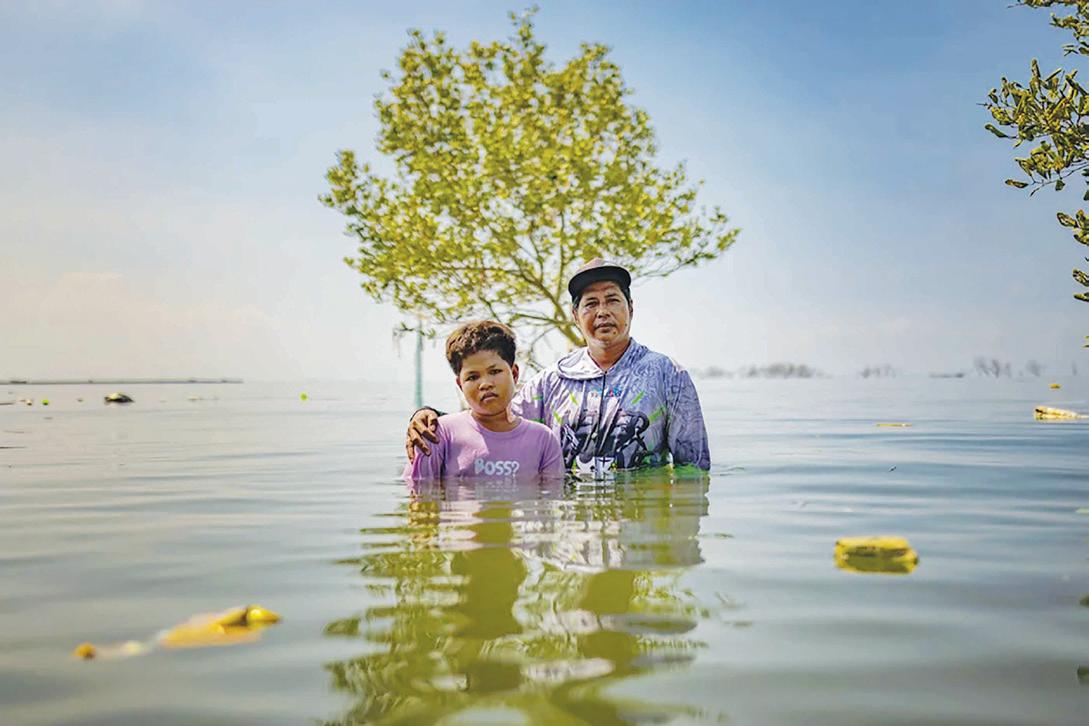
ing the monsoon season. A dredger offloading sand at a reclamation project in Manila Bay, has many residents with the belief that such coastal development
of two rivers in Manila Bay, the densely populated island is frequently flooded, especially since mangrove forests were cleared. (Source: The Guardian)



The Guyana Defence Force (GDF) is celebrating a proud milestone after Colonel General Staff, Colonel Kenlloyd Roberts, MSM, successfully completed the Global Strategy Programme 2025 at the Royal College of Defence Studies (RCDS) in London, United Kingdom. The programme, widely regarded as one of the world’s premier professional military education courses, brought together more than 100 senior military officers, Government officials and private sector leaders from 47 countries, including the United Kingdom (UK). It focuses on developing strategic understanding, strengthening leadership capacity and sharpening
analytical skills to prepare participants for leadership at the highest levels of national and international security. Throughout the course, Colonel Roberts distinguished himself as a thoughtful and collaborative leader. He was commended for his intellectual depth, reflective leadership style and ability to provide clear strategic insights. His contributions in areas such as small-state strategic positioning and multilateral security cooperation were particularly noted, with strong relevance to Guyana and the wider Caribbean.
Colonel Roberts’s academic work was praised for its analytical depth and practical application to contemporary global security challenges. In stra-

tegic exercises and group syndicate work, he demonstrated confidence, sound judgement, and a capacity to lead with tact and vision. While in London, Colonel Roberts also pursued his third Master’s degree –an MA in International Security and Strategy at King’s College London –further highlighting his commitment to continuous professional development.
The GDF noted that his achievements not only reflect his personal dedication and excellence but also underscore the Force’s commitment to preparing its officers to meet the highest international standards.
His enhanced expertise and the international network of strategic part-
ners he developed during the year are expected to strengthen Guyana’s voice in regional and global security discussions, while advancing the nation’s strategic interests.
Chief of Defence Staff, Brigadier Omar Khan, MSS, extended congratulations on behalf of the GDF, stating that Colonel Roberts’s accomplishment is a testament to professionalism, leadership and service to Guyana.
Colonel Roberts’ enhanced expertise and expanded international network of strategic partners will bolster Guyana’s voice in regional and global security discussions, supporting the advancement of the country’s national interests.

Guyana has made history at the prestigious Miss, Mrs & Teen India Worldwide 2025 pageant, returning home with a series of remarkable accolades, including a historic top three placement in the Mrs category and the coveted Best National Director Award.
The international pageant, hosted at the elegant Lalit Hotel in Mumbai, India, was a dazzling showcase of beauty, talent, and culture, bringing together contestants from across the globe.
Amid the glamour and bright lights, Team Guyana stood out for its preparation, poise, and professionalism, quickly capturing the hearts of both judges and audiences.
Mrs India Guyana placement
Leading the sweep at Mrs India Guyana 2025 was Malini Persaud, one of the country’s premier makeup artists, who created history by becoming the first-ever Guyanese to place in the Top 3 at Mrs India Worldwide, finishing as 2nd Runner-Up.
Malini’s journey through the competition was marked by sophistication, charisma, and unshakeable confidence. She delivered a show-stopping talent performance – an electrifying dance cho-
reographed by former Mrs India Guyana and acclaimed dancer Reana Roopnauth – earning roaring applause from the audience. Her powerful final answer on the importance of preserving culture and prayer as core values further cemented her place in history.
In addition to her historic placement, Malini also earned the title of

Mrs Congeniality 2025, recognised for her warmth, friendliness, and ability to inspire those around her. Her achievements not only mark a personal milestone but also signal a new era for Guyana on the global pageant stage.
Double scoop for Teen India Guyana, Darshanie Tickapersaud

Representing the youth of Guyana, Darshanie Tickapersaud lit up the stage with energy, elegance, and passion. Her dynamic dance performance in the talent round captivated both judges and the audience, earning her recognition as a true crowd favourite.
Darshanie proudly walked away with two Teen category titles: Miss Congeniality and Miss Social Media, highlighting her charm on and off the stage.
Accolades for Miss India Guyana Rameshwarie Jairam; National Director, Hashim Alli
In the Miss category, celebrating its 32nd year, Rameshwarie Jairam embodied the grace, confidence, and hospitality synonymous with Guyanese culture. Her ethnic wear presentation, a stunning traditional Indian ensemble, drew praise for its elegance and authenticity. Rameshwarie also earned the Miss Beautiful Hair award, rounding out Guyana’s impressive haul of titles.
Adding to the country’s historic achievements, Guyana’s National Director, Hashim Alli, was awarded Best National Director 2025 by Mr Dharmatma Saran, Founder of Miss India Worldwide and IFC.
In his heartfelt acceptance
speech, Alli credited the success to the team and the delegates:
“This recognition is not just a personal milestone but a celebration of the amazing talent, resilience, and beauty of the young women who carried our flag on the international stage. To the backbone of this organisation – our Vice President and my wife, Melicia Partab Alli; our hard-working team; our partners and supporters; and most importantly, the phenomenal delegates – this award is for all of you.”
With Malini Persaud’s first-ever top 3 finish for Guyana, along with multiple wins across the Miss and Teen categories, 2025 will forever be remembered as a landmark year for the Golden Arrowhead on the international stage.
From tours of Mumbai’s iconic landmarks to standing confidently on the pageant stage, the Guyanese queens carried their homeland’s spirit with grace, charm, and pride.
This historic sweep not only cements Guyana’s growing presence in global pageantry but also sets the stage for an even brighter future, filled with inspiring queens, cultural representations, and more proud moments for the nation.


The 7th Annual Captains of Industry Gala, hosted by the Caribbean American Cultural Arts Foundation (CACAF) in Atlanta, Georgia, was a remarkable two-part cultural showcase that blended education, empowerment, and elegance. From thought-provoking daytime panels to the glittering gala at night, the event created a platform for Caribbean leaders and innovators to connect, collaborate, and chart bold new futures. This year’s programming – “Educational Sessions: Knowledge, Power & Impact” – brought together brilliant minds across in-
dustries to discuss opportunities within the Caribbean and international communities. The sessions featured dynamic leaders sharing insights on business, culture, technology, and sustainability.
Among the highlights was the “Doing Business Internationally” panel, featuring Sharon Barnwell, founder of Caribbean International Shipping, and Dr Clinton Urling, a seasoned Guyanese entrepreneur. Dr Urling emphasised the importance of connecting Guyana’s economic boom with the diaspora: “As a proud Guyanese, it was an honour to participate in the inaugu-
ral International Business Summit in Atlanta. The summit provided an excellent platform to highlight the incredible economic growth and vast business opportunities in Guyana,” he said.
Other sessions included “Women Driving International Business” with Dr Nicole Grimes, Jodi Lewis, and Anisa Palmer, who spotlighted female leadership in global commerce, as well as panels on business in Latin America, the global technology revolution, green commerce, entertainment, funding strategies, and government contracting.
One of the honourees, David Mullings, founder and
CEO of Blue Mahoe Capital, reflected on receiving the 2025 Captains of Industry Award:
“This recognition is not just about me – it’s a reflection of every risk taken, every lesson learnt, and every person who believed in the mission to create generational wealth and close the economic gap for the Caribbean diaspora and beyond.”
Michael Thomas, president of CACAF, described the vision for the gala and summit:
“Our vision is to connect and build the diaspora through commerce and financial opportunity. We see the summit growing into a global event that will place the Caribbean region in a unique position to not only grow but thrive in a new global economy. Guyana is at the forefront of this global revolution.”
The evening gala recognised trailblazing Caribbean leaders whose contributions span industries and borders. Sonia Noel, Guyana’s award-winning fashion designer, returned for her third year contributing to the event by hosting the pre-event fashion show and donating her designs to the charity auction. She also had the honour of presenting the first award of the evening to Samantha Samuels, a Guyanese living in Atlanta, founder of AuthenticMe Consulting,

LLC, and Young Dreamers International, a non-profit dedicated to youth empowerment.
“It was great to present this award to someone I admire!” Noel said.
“Congratulations to Michael and team for another successful event. It’s a blessing to be part of such a prestigious event, which has also helped me build my client base in Atlanta.”
Saurel Quettan, past president of the Georgia Haitian-American Chamber
of Commerce, called the gala
“a powerful space where captains of industry connect, exchange knowledge, and chart new pathways for growth in the Caribbean and beyond.”
Founded in Atlanta, CACAF continues to lead with cultural arts programming, mentorship initiatives, climate resilience advocacy, and community outreach, serving diverse multicultural communities across the United States.

Moray House Trust is once again merging cricket and cre-
ativity with its latest exhibition, “Beyond a Boundary: What is Art?”, which opened
Saturday at its gallery on Camp and Quamina Streets, Georgetown.
The showcase, which runs from Saturday, September 13 to Saturday, September 20, 2025, invites the public to explore cricket bats and balls transformed into works of art by local artists. The gallery will be open daily from 11:00h to 14:00h, or by appointment. Admission is free, and all the pieces on display are available for purchase.
This year’s theme pays tribute to Trinidadian writer and thinker CLR James, whose ground-breaking 1963 book “Beyond a Boundary” famously drew parallels between cricket and democracy, describing both as part of humanity’s search for “a more complete human existence”.
The timing of the exhibition is symbolic. September

in Guyana began with national elections and continues with the Caribbean Premier League cricket competition – a natural progression, organisers say, from ballots to bats.
Moray House Trust launched its gallery last year with the exhibition Bat and Ball, which first introduced the concept of reimagining cricket equipment as art. Building on that momen-
tum, the new show brings together artists, sports enthusiasts, and cultural thinkers to reflect on James’s enduring legacy while celebrating cricket’s deep ties to Caribbean identity.


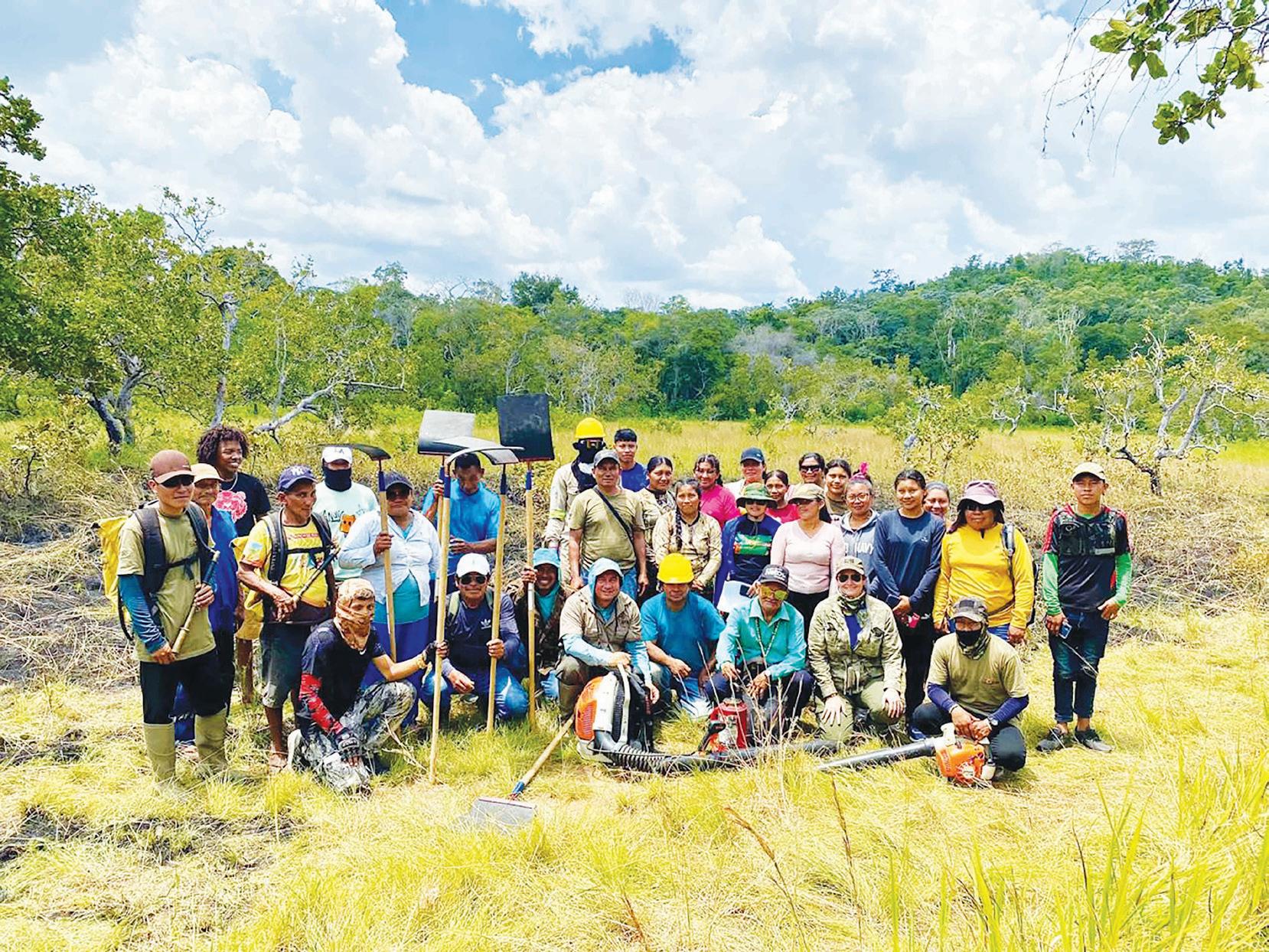
Forty rangers from six villages in the Rupununi: Shulinab, Sand Creek, Sawariwau, Rupunau, Shea, and Katoonarib, actively participated in the South Rupununi
Conservation Society (SRCS) Refresher Training for Wildlife Rangers, Indigenous men and women who will be working on the Red Siskin Research and Conservation Project.
According to the SRCS,
over the two days of September 6-7, rangers and others strengthened their skills through both theory and practice where, in day one they were familiarised with GPS use; bird identification & binocular

care; Transect monitoring (data collection), and basics of photography, videography & storytelling
At Day Two, led by Dr Kayla De Freitas, rangers learned principles of fire prevention and man -
agement, followed by a demonstration burn (prescribed fire) with the Shulinab Village Fire Brigade—a practical exercise that helps create firebreaks.
These firebreaks not
only protect Red Siskin habitats but also safeguard the many other species that share these ecosystems, while strengthening climate resilience for Indigenous communities.

Five United States
(US) F-35 aircraft
were seen landing in Puerto Rico on Saturday after President Donald Trump last week ordered 10 of the stealth fighters to join a military buildup in the Caribbean to counter drug cartels amid rising tensions with Venezuela.
The F-35s were seen landing at the former Roosevelt Roads military
base in Ceiba, Puerto Rico, by Ricky Arduengo, a contract photographer working for Reuters. US helicopters and Osprey aircraft as well as other US transport aircraft and military personnel have been seen at the base in recent days.
The latest sightings come after a surprise visit to Puerto Rico this week by US Secretary of Defense Pete Hegseth along with the top
US general amid escalating tensions with Venezuela.
Asked about the aircraft, a Pentagon duty press officer said: "We have no force posture changes to announce currently."
Sources told Reuters last week that the Trump administration ordered the deployment of 10 F-35 fighter jets to Puerto Rico to conduct operations against drug cartels.
In announcing the plan

last week to send more aircraft to the region, Trump said the US was not talking about regime change in Venezuela.
Last week, the US military killed 11 people in a strike on a vessel from Venezuela allegedly carrying illegal narcotics in the first known operation since the Trump administration's recent deployment of warships to the southern Caribbean.
Venezuela has said none of the 11 people killed were drug traffickers.
The Venezuelan Government announced on Saturday that a US destroyer intercepted, boarded and occupied a Venezuelan tuna fishing vessel for eight hours in the South American country's Special Economic Zone on Friday.
It said the vessel was boarded in an illegal and
hostile manner, and that it was crewed by nine "humble" fishermen and was "harmless."
US officials did not immediately respond to a request for comment about the alleged incident. F-35s are highly advanced stealth fighters and would be effective in any combat against Venezuela's air force, which includes F-16 aircraft.
(Reuters)


Leader of the People’s National Congress Reform (PNCR) Aubrey Norton on Friday acknowledged that the party has an issue with holding on to voters when newer options are available to the electorate.
This year, the PNCR, which ran as the A Partnership for National Unity (APNU) coalition, took massive losses against newcomer We Invest in Nationhood (WIN), led by United States (US)sanctioned businessman Azruddin Mohamed. WIN walked away with 109,066, while the APNU garnered just 77,998 votes in the General Elections.
“We have to review how we operate with new parties… to understand the phenomenon of why when new parties emerge, our support base seems to go in another direction – because it is not the first time, it is not the second time, it is the third time it has happened,” Norton pointed out.
“In the 1957 elections we did well, and then in the 1961 elections, in which the United Force emerged as a new party, we lost seats to them. In 2006 the AFC came as a new party, and we lost to them again. In 2025 WIN came as a new party, and
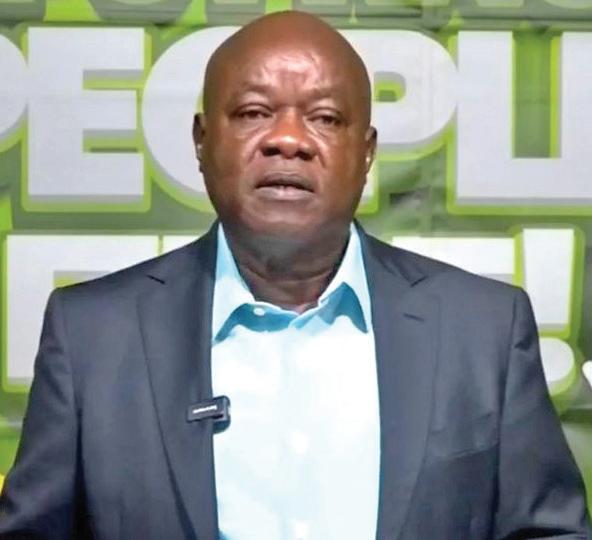
we lost seats to them... It is probably signalling that our support base might be more welcoming of new persons, and we have to analyse it and get to the bottom of it and then develop our strategies and tactics,” he noted.
Following this year’s General and Regional Elections, APNU was left with just 12 seats in Guyana’s 65-seat National Assembly. The votes garnered by the party marked a steep decline of over 139,000 votes when measured against the 217,920 votes the party got in 2020
when it coalesced with the Alliance for Change (AFC) and earned 31 seats in the 12th Parliament.
In the 13th Parliament, WIN has earned 16 seats, while a generous 36 seats were earned by the People’s Progressive Party/Civic (PPP/C), which won 242,498 votes at the elections to retain a second term in office.
Among the smaller parties, former PNCR Executive Amanza WaltonDesir was able to outperform even the long-running AFC, which did not earn a seat in Parliament after only man-
In her Caribbean Wellness Day 2025 address, Caribbean Community (CARICOM)
Secretary General (SG) Dr Carla Barnett, said that CARICOM Member States are taking new approaches to strengthening public health responses even as CARICOM makes progress in advancing sustainable development. “Even as the Caribbean Community makes progress in advancing sustainable development, we face the continuing and costly challenge of non-communicable diseases (NCDs),” she said on the occasion, which is observed on September 13. “Heart disease, stroke, cancer and diabetes remain the leading causes of illness and death across our region. Lifestyle factors, such as tobacco use, unhealthy diets, physical inactivity and excessive alcohol consumption, erode the health of our people, impede economic growth and strain our health systems. While life expectancy continues to increase, people spend more years managing illnesses and a reduced quality of life.”
“This is why CARICOM Member States are taking new approaches to strength-
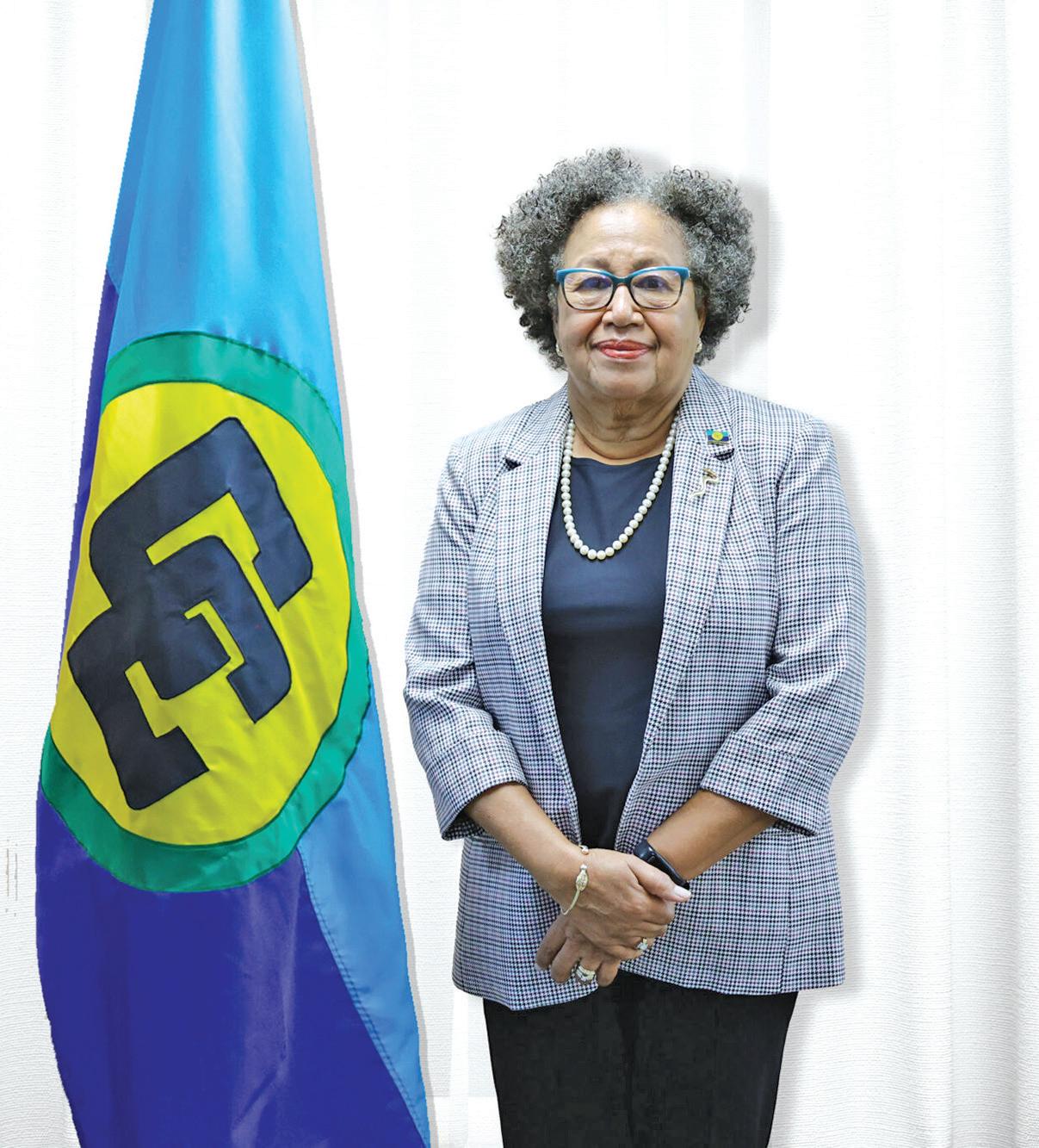
ening public health responses. Initiatives such as Caribbean Moves; HEARTS protocols for hypertension and cardiovascular care; and Mental Health First Aid training for youth leaders and development workers; help to create a culture of exercise, ongoing monitoring, and wellness across the region. Member States also continue to strengthen the use of applicable laws, fiscal
measures, and regulations,” she stated.
“We must continue to work together – as Governments, civil society, academia, the private sector, and international partners – to create a community where all people can live longer, healthier, more productive and more fulfilling lives,” she added, as she extended Caribbean Wellness Day wishes in her address.
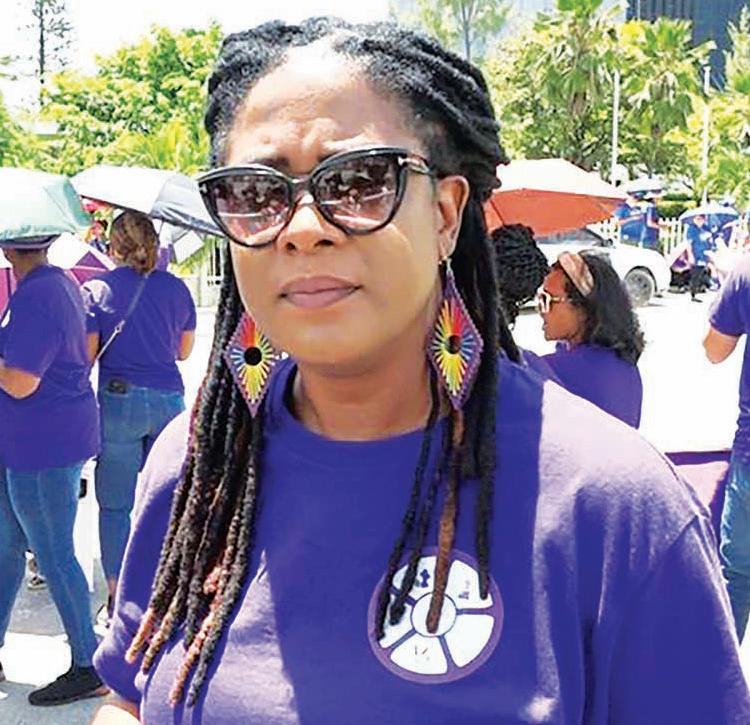
aging to garner 3610 votes in the General Election.
At Friday’s press conference, Norton hinted at Walton-Desir having possibly earned her seat in
Parliament through “sympathy votes”, even as he acknowledged that the party has a historical pattern of being unable to hold on to its support base whenever new parties emerge.
Norton made the comment as he spoke with media at the party’s first press conference since its dismal performance at the September 1 General and Regional Elections (GRE).
Norton was questioned on whether the party regretted having lost WaltonDesir as a candidate, given her notable performance at the polls.
“In elections, people get sympathy votes all the time, so why speculate on it? What we need to do is move forward,” Norton replied.
After resigning from the PNCR in June and starting her own party – the Forward Guyana Movement (FGM) –to contest the September 1 polls, Walton-Desir was able to amass 4326 votes across the country, just enough to gain one seat under the Hare Quota system that Guyana utilises.
She joined the Ministry of Foreign Affairs in 1976 as a clerk in the registry. She has since acquired a wealth of experience in international affairs and other Governmental matters, serving in every major department of the ministry with a wide scope of responsibility. She served as Foreign Service Officer I in the Administrative Division (1981-1984), Foreign Service Officer II in the Protocol Division (1984-1988), Foreign Service Officer III in the Political Affairs Division with responsibility for Latin America and the Caribbean (1988-1991), Head of the Frontiers Division (19901991), Counsellor at the Guyana High Commission in London (1991-1995), Director of the Department of the Americas and Asia (19962001) and Director General (2001-2015). As Director
General, she also held the portfolios of Ambassador to CARICOM and Nonresident High Commissioner to Trinidad and Tobago, Barbados, Grenada and St Kitts and Nevis.
Mrs Harper was a member of Guyana’s delegation to numerous meetings of the Caribbean Community (CARICOM), the Amazonian Cooperation Treaty Organisation (ACTO), the Latin American Economic System (SELA), the Association of Caribbean States (ACS), the Rio Group, the United Nations (UN), the Union of South American Nations (UNASUR) and the Commonwealth. She was a member of Guyana’s team for the Guyana-Suriname Maritime Arbitration and was involved in several negotiations on behalf of Guyana, both at the bilateral and mul-
tilateral levels. She was once chair of the CARICOM InterGovernmental Task Force to revise the Revised Treaty of Chaguaramas. Mrs Harper’s distinguished service to Guyana was recognised by the Government in 2011 when she was awarded one of Guyana’s most prestigious National Awards, the Golden Arrow of Achievement, for long, dedicated and distinguished service in the Guyana Foreign Service.
From 2016 to 2020 Mrs Harper served as a consultant to the Ministry of Foreign Affairs on border matters. She is also the co-agent for Guyana in the case regarding the validity of the 1899 award about the frontier between Guyana and Venezuela, which is currently before the International Court of Justice.


With just a few days into the new school year in Guyana, a concerning trend in adolescent health across the Caribbean has come into sharp focus. Dr Asha Pemberton, Caribbean Vice-President (VP) of the International Association for Adolescent Health, is sounding the alarm on medical complications in teens that were once virtually unheard of, including type 2 diabetes, hypertension, and menstrual irregularities. Speaking during Thursday’s Healthy Caribbean Coalition webinar, ‘Back to School, Back to Health: Nothing at School Should Encourage Unhealthy Choices’, Dr Pemberton described a troubling shift in teen health across the region. “Conditions once considered adult-onset are now standard among Caribbean adolescents,” she explained, citing insulin resistance, early signs of metabolic disease and elevated blood pressure.
Having worked in paediatric and adolescent health for over 20 years, Dr Pemberton said the current reality represents a dramatic change from when she began her career. “At the beginning of my career, the medical complications we

are now seeing were pretty much unheard of,” she said.
But the crisis is not only physical. The psychological impact on overweight and obese teens is equally alarming. Low self-esteem, social withdrawal and a pervasive sense of being “different” are becoming commonplace, she noted.
“It’s really important to recognise the silent effects on their health and well-being, which are often emotional and psychosocial,” Dr Pemberton said.
“Obese and overweight children and teens are aware that their bodies are not healthy. There is a dif-
ficulty moving through the world in a bigger body.”
This awareness, she explained, erodes confidence at a critical stage of development, where social comparison and peer identification play an important role. The fallout can be profound, affecting behaviour, participation in activities, and overall well-being. Consequences include withdrawal from sports and physical activity, not due to lack of interest but from pain, discomfort, and limited cardiovascular endurance. “While you might say, ‘Just go to the gym’ or ‘Just walk,’ the reality is, it hurts to walk, and
aliens after “unlawful voyage vessel interdiction”

The United States Coast Guard, along with its Operation Vigilant Sentry partners, maintains a continued presence with air, land, and sea assets in the Florida Straits, the Windward Passage, the Mona Passage, and the Caribbean Sea
The crew of US Coast Guard Cutter Heriberto Hernandez on Thursday repatriated 66 aliens to San Pedro de Macoris, Dominican Republic, following the interdiction of an unlawful migration vessel voyage in Mona Passage waters off Puerto Rico on Tuesday.
According to a USCG news release, the repatriated aliens were transferred
to awaiting Dominican Republic Navy authorities, including 48 individuals (41 men and seven women) who claimed to be of Dominican Republic nationality; 16 individuals (13 men and three women) who claimed to be Haitian; and two men who claimed to be Romanian. No minors were identified. The interdiction occurred after a Customs and Border Protection
Caribbean Air and Marine Branch crew on a routine patrol detected a makeshift vessel in waters northwest of Aguadilla, Puerto Rico, it added.
Once aboard a Coast Guard cutter, aliens are processed to determine their identity and are provided with food, water, shelter and basic medical attention, the news release informed.
it’s hard to walk, their cardiovascular tolerance is not normal,” she explained.
“When we put interventions in place, we have to recognise that their bodies are not normal bodies, and they feel much more conspicuous.”
This sense of visibility and vulnerability can lead to troubling coping behaviours, including binge eating, social reclusion and engagement in high-risk behaviours. At the root of these issues, Dr Pemberton stressed, is low self-esteem caused by body weight and
shape.
“An adolescent or older child with low self-esteem is more likely to binge more, recluse themselves from social activities, and engage in risky behaviours,” she said.
Dr Pemberton’s warning comes at a crucial time as schools reopen, highlighting the need for targeted interventions, supportive environments, and holistic strategies to address both the physical and emotional health of Caribbean youth.
Guyana faces significant mental health challenges
for its youth, including high suicide rates and a growing prevalence of common disorders like anxiety and depression, often exacerbated by stigma and a lack of supportive environments.
In response, the Guyanese Government has launched initiatives like the Mental Health Protection and Promotion Act and the Kind to Your Mind campaign, aiming to improve access to care, reduce stigma and increase early intervention through public education and community support.
FDA to crack down on
“misleading” drug advertising
The United States (US) Department of Health and Human Services and the Food and Drug Administration (FDA) recently announced sweeping reforms to rein in misleading direct-to-consumer pharmaceutical advertisements.
The FDA in a press release Tuesday stated that it is sending thousands of letters warning pharmaceutical companies to remove misleading ads and is issuing approximately 100 cease-and-desist letters to companies with deceptive ads.
In addition to enforcing existing law, the FDA is initiating rulemaking to close the “adequate provision” loophole created in 1997, which drug companies have used to conceal critical safety risks in broadcast and digital ads, fuelling inappropriate drug use and eroding public trust, it added.
“Pharmaceutical ads hooked this country on prescription drugs,” Health and Human Services Secretary Robert F Kennedy, Jr said. “We will shut down that pipeline of deception and require drug companies to disclose all critical safety facts in their advertising. Only radical transparency will break the cycle of overmedicalisation that drives America’s chronic disease epidemic.”
The FDA noted that it is concerned patients are not seeing a fair balance of information about drug products. This concern is magnified when serious risks are not clearly presented, or the information is too difficult for seniors to read or hear.
“For far too long, the FDA has permitted misleading drug advertisements, distorting the doctor-patient relationship and creating increased demand for medications regardless of clinical appropriateness,” said FDA Commissioner Marty

Makary, MD, MPH “Drug companies spend up to 25 per cent of their budget on advertising. Those billions of dollars would be better spent on lowering drug prices for everyday Americans.”
Social media and drug advertising
According to the FDA, Americans also live in a new era of social media. An increasing reliance on digital and social media channels, including undisclosed paid influencer promotion, has blurred the lines among editorial content, user-generated media and pharmaceutical advertising, making it increasingly difficult for patients to distinguish between evidence-based information and promotional material.
A 2024 review in the Journal of Pharmaceutical Health Services Research reveals that while 100 per cent of pharmaceutical social media posts highlight drug benefits, only 33 per cent mention potential harms. Moreover, 88 per cent of advertisements for top-selling drugs are posted by individuals and organisations that fail to adhere to the FDA fair balance guidelines.
The stakes surrounding prescription drug ads are high. While these ads can raise awareness of disease states and beneficial therapies, they must also disclose important risks and limitations. Current law requires that advertisements present a fair balance between a product’s risks and
benefits; avoid exaggerating benefits; not create a misleading overall impression; properly disclose financial relationships; and include information regarding major side effects and contraindications, the Administration noted.
Closing loopholes, strengthening enforcement Despite widespread violations, the FDA has been increasingly lax and reactive in its enforcement approach over the last few decades. The FDA used to send more than a hundred warning letters each year, and misleading ads were rare. But over time, enforcement waned, and the number of warning letters sent to pharmaceutical companies dropped to one in 2023 and zero in 2024.
The FDA will no longer tolerate such deceptive practices. Going forward, the agency will aggressively deploy its available enforcement tools. The FDA is already employing artificial intelligence (AI) and other technology-enabled tools to proactively monitor and review pharmaceutical advertising.
The Trump Administration and HHS Secretary Kennedy are committed to restoring transparency, accountability, and trust in health care. By closing loopholes and stepping up enforcement, the FDA will protect patients, safeguard public health and hold the pharmaceutical industry accountable, the FDA release stated.
Prime Minister (PM)
Kamla PersadBissessar is firing back at Venezuela’s Vice President (VP), declaring that she will “dare” to do whatever is necessary for the people of Trinidad and Tobago.
Her response came after Delcy Rodríguez warned the country not to support the United States (US) in its alleged “plans of aggression” against Venezuela.
Amidst the deployment of US warships and troops in the southern Caribbean, a move the US said is part of a counter-narcotics operation, Rodriguez issued a warning to the Governments of Trinidad and Tobago and Guyana, urging them not to “dare” to assist with what she described as “perverse plans of aggression” against Venezuela.
Speaking with members of the media before entering the Parliament yesterday, the PM was asked to respond to the
Venezuelan VP’s statement.
“I will dare to do what I have to do to keep the people of Trinidad and Tobago safe, and that is my priority. I’ve said T&T first. That is my priority,” Persad-Bissessar said.
The T&T Government has praised the increased US presence and a recent strike against a vessel allegedly carrying drugs, which led to the deaths of 11 persons.
But despite the Government’s alliance with the US, yesterday PersadBissessar sought to underscore that this country has no intention of “invading Venezuela” or stepping on Venezuelan soil.
“Nothing of the sort is happening.”
She added that there have been no discussions with the US for any invasion of Venezuela.
“At the moment, we have had no discussions with respect to invading Venezuela,
with respect to T&T going onto the soil of Venezuela. It’s just fearmongering. However, I repeat, should Venezuela invade Guyana, Trinidad and Tobago will definitely step forward in defence of our cousins, our brothers and sisters in Caricom.”
The PM said it is not new for the US military to have a presence in the region, and she reiterated that she welcomes them.
“If that can help us stem the criminality, the trafficking, the narco-trafficking, the human trafficking, and the pain and suffering that brings to the people here, then yes, we welcome them and look forward to their cooperation with us.”
T&T and Guyana remain the only Caricom nations to support the US military presence. Caricom as a body is yet to speak on the issue. (Excerpt from Trinidad & Tobago Guardian)
At least 42 persons were killed in Laboderie, including a 4-year-old child and his family, the first section of the municipality of Arcahaie, about 40 kilometres (km) north of Port-au-Prince, during a bloody attack perpetrated by the Viv Ansanm armed coalition.
The information was confirmed this Friday by local official Baptiste Joseph Louis, who stated that the incident occurred Thursday.
Repelled by members of the National Police and local self-defence brigades, the attackers returned to Laboderie to commit the massacre, added Joseph Louis.
Baptiste said the massacre apparently was provoked by the killing of a local gang leader in Cabaret who goes by the name of Vladimir.
He was a member of a powerful gang coalition known as Viv Ansanm that has plundered several communities in Port-au-Prince and beyond and was recently
designated as a foreign terrorist organisation by the US.
The bodies were left at the scene, some devoured by dogs, while many survivors fled, local authorities reported.
The NGO Collectif Défenseurs Plus on Friday denounced a “new wave of deadly violence” following the massacre and demanded state responsibility.
The organisation expressed its deep concern over the massacres perpetrated against civilians.
“On September 11, 2025, in the commune of Cabaret, approximately 40 people were executed in retaliation for the deaths of the leader of the ‘Vladimir’ gang and other members of his group, who died during a confrontation with law enforcement on September 7,” the agency added.
In addition to the massacre, the bandits burnt several homes and other property belonging to residents of this town, the organisation said.
“These executions, carried out without discernment, reflect a logic of barbaric revenge against a defenceless population tolerated by state authorities,” he stated.
The metropolitan region of Port-au-Prince remains the epicentre of terror, marked by kidnappings, summary executions, and other forms of violence against the civilian population, amid the indifference of state authorities, the NGO states.
“The population lives in a constant state of fear, with restricted access to healthcare, food, education, and transportation in areas controlled by armed groups,” Defensores Plus said in a statement.
“The Labodrie tragedy illustrates a violence fuelled by impunity and the absence of the State. Haiti needs an urgent and coordinated national and international response to curb the violence perpetrated by armed groups,” the organisation suggested. (Source: Listin Diario)
The St Catherine North Police say the 48-hour curfew imposed in the St John’s Road and Old Harbour Road communities on Thursday evening was prompted by recent murders and shootings.
Commanding Officer for the Division, Senior Superintendent of Police Hopton Nicholson, says two men were killed in the St John’s Road community in a span of four days.
“The first one occurred at 101 St John’s Road, and that was reported on
Saturday, September 6th, and another murder – the body of a man was recovered on Wednesday, the 10th of September, in the Clayton Heights area. Now, we aim to curtail criminal activities in this area, and we want persons to know that the security forces will be out in their numbers. We will be conducting a series of operations, and we hope to have cooperation from the law-abiding citizens. We also are requesting that you do not harbour persons who are considered wanted,” he
cautioned.
SSP Nicholson added that two people were shot and wounded on September 8 in the Old Harbour Road area.
He said the Police believe the recent incidents are linked to strife among rival gangs operating in the space.
Meanwhile, SSP Nicholson said the Police have identified several persons of interest who they believe can assist in their investigations. (Excerpt from Radio Jamaica News)

4 arrested as Colombian Navy seizes more than 1.6 tonnes of cocaine
Colombian authorities seized more than 1.6 tonnes of cocaine in an operation in Caribbean waters, in which three Colombians and one Jamaican were captured, the Navy reported Saturday.
The operation was carried out in Bocas de Ceniza, near Barranquilla, capital of the department of Atlántico, by agents of the Coast Guard Station, who intercepted a speedboat in which they found 1675 kilos of cocaine.
The cargo was being transported by three Colombians and a Jamaican, who were arrested and handed over to the Prosecutor’s Office, the Navy added in a statement.
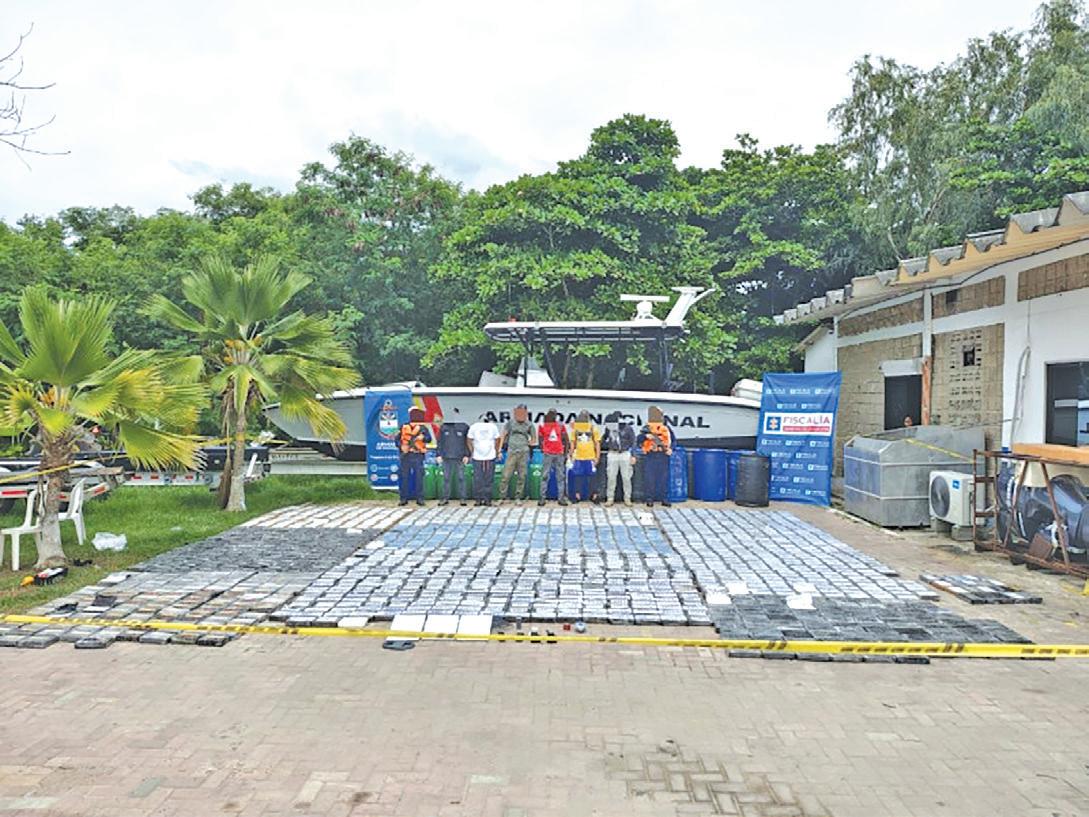
So far in 2025, more than 160 tonnes of cocaine have been seized in the Colombian
Bolivian Police capture 3 suspected armed drug traffickers; forced to withdraw after being attacked by community
Agents from the Bolivian Special Force to Combat Drug Trafficking (Felcn) had to flee the municipality of Villa Tunari, Chapare, to avoid a confrontation with community members after an operation in which three alleged drug traffickers were arrested with seven firearms and ammunition.
The Deputy Minister of Social Defence and Controlled Substances, Jaime Mamani, reported that the three arrested were identified as Luis Fernando QP, Alexander Ch R, and Duan Sttiven MU, the latter of whom is Colombian.
“During hotel room searches, three people were arrested: one Colombian and two Bolivians. They also seized seven firearms, a 22

ing the area with sticks and firecrackers in an attempt to prevent further drug inter-

mm calibre magazine, a vehicle, and 38 rounds of ammunition of various calibres,” Mamani explained.
The deputy Minister also noted that the Felcn agents had to flee the Chapare area because they were harassed by local residents after the three alleged drug traffickers were apprehended.
“During the operation, local people began harass-
diction efforts. In response to this, anti-narcotics officers [withdrew from] the area,” he added.
The operation took place early Friday morning in the town of Villa San Gabriel, in the municipality of Villa Tunari, Chapare province.
Hotel rooms were searched, and Bolivian Luis Fernando, QP, was captured in one of
them as he unsuccessfully attempted to escape through a window.
During a search of his belongings, a 40 mm calibre firearm was found inside his bag. His white vehicle, which contained a bag of cocaine base, was later seized.
Meanwhile, in the adjacent room, Colombian Duan Sttiven MU was identified as he attempted to flee but was also captured. A search of his belongings revealed a plastic bag containing marijuana in a black bag.
The deputy Minister explained that the agents continued searching the rooms, and in one of the upstairs rooms of the hotel, they found that another occupant had managed to escape, leaving behind a firearm case, ammunition, and two homemade weapons, which were seized.
During the operation, a home was also seen with its door ajar, which a suspect quickly entered after noticing the Police presence. This man was identified as Alexander Ch R, who was later arrested and found to be in possession of three rifle-type firearms. (Excerpt from El Deber)

President Donald Trump said on Saturday that the US is prepared to impose fresh energy sanctions on Russia, but only if all NATO nations cease purchasing Russian oil and implement similar measures.
“I am ready to do major sanctions on Russia when all NATO nations have agreed and started to do the same thing, and when all NATO nations stop buying oil from Russia,” Trump said in a social media post.
In recent weeks, the US has stepped up pressure on NATO countries to tighten energy sanctions on Russia in a bid to help end its war with Ukraine – a conflict Trump has struggled to bring to a close despite repeated threats of harsher penalties on Moscow and its partners.
Trump has also faced criticism at home for repeatedly setting two-week deadlines for Russia to de-escalate and allowing them to pass without concrete action.
An August Reuters/Ipsos poll found that 54 per cent of Americans, including one in five of Trump’s Republicans, believe the President is too closely aligned with Russia.
“The EU has engaged – and will continue to engage – with all relevant global partners in the context of its sanctions against Russia and enforcement of same,” a spokesperson for the European Commission, the executive arm of the European Union, said in a statement on Saturday.
EU President Ursula von der Leyen said this week in her State of the Union address that any new sanctions package would be in line with EU rules, including “the long-held principle that our sanctions do not apply extraterritorially.”
The Group of Seven nations’ finance Ministers in a Friday call discussed further sanctions on Russia and possible tariffs on countries they consider “enabling” its war in Ukraine.
Energy revenues remain the Kremlin’s single most important source of cash to finance the war effort, making oil and gas exports a central target of Western sanctions. But officials and analysts warn that aggressive curbs on Russian crude also carry risks of driving up global oil prices, a prospect that could strain Western economies and weaken pub-
lic support for the measures.
Since 2023, NATO member Turkey has been the third-largest buyer of Russian oil, after China and India, according to the Centre for Research on Energy and Clean Air. Other members of the 32-state alliance involved in purchasing Russian oil include Hungary and Slovakia.
Trump, who is spending the weekend at his Bedminster, New Jersey, golf club, said NATO, acting as a bloc, should impose tariffs of 50 per cent to 100 per cent on Chinese imports, a move he argued would weaken Beijing’s economic grip on Moscow.
Trump has imposed an extra 25 per cent tariff on imports from India to pressure New Delhi to halt its purchases of discounted Russian crude oil, bringing total punitive duties on Indian goods to 50 per cent and souring trade negotiations between the two democracies.
But Trump has refrained from imposing additional tariffs on Chinese imports over China’s purchases of Russian oil, as his Administration navigates a delicate trade truce with Beijing. (Reuters)

Tens of thousands of people took to the streets of London for a march organised by far-right activist Tommy Robinson, as support for the anti-immigrant Reform UK party soars across the country.
London’s Metropolitan Police estimated that Robinson’s “Unite the Kingdom” rally drew about 110,000 people on Saturday, with crowds marching from two directions – Waterloo Bridge and Lambeth Bridge –and converging on Whitehall, next to the United Kingdom Parliament.
Al Jazeera witnessed people waving an assortment of flags – Union Jacks, the red and white St George’s Cross of England, and the Israeli Star of David – chanting
“[Keir] Starmer is a w*****” as they flocked to see famous far-right speakers next
to the UK Prime Minister’s Downing Street residence, including Robinson, Katie Hopkins, and Steve Bannon. Robinson, whose real name is Stephen YaxleyLennon and is known for his anti-immigrant and anti-Islam views, billed the march as a demonstration for free speech, British heritage and culture, pumping up the crowd with claims that migrants now had more rights in court than the “British public, the people that built this nation”.
The Met deployed more than 1600 officers to keep apart Robinson’s rally and a counter “Stand Up to Racism” protest attended by about 5000 people, reporting on X that a number of officers were assaulted as they tried to stop the former from breaching cordons delineating a buffer area between the
Nepal’s former Supreme Court chief justice Sushila Karki has become the country’s interim Prime Minister after deadly anti-corruption protests ousted the Government.
The 73-year-old was sworn in during a brief ceremony, becoming the first woman to lead the impoverished Himalayan nation after a deal was reached with protest leaders.
More than 50 people were killed in clashes with riot police during this week’s mass protests sparked by a ban on social media platforms.
The ban was lifted on Monday – but by then protests had swelled into a mass movement. Angry crowds set fire to parliament and Government buildings in the capital, Kathmandu, on Tuesday, forcing Prime Minister KP Sharma Oli to resign.
Earlier on Friday, President Ram Chandra Poudel’s press adviser had confirmed to the BBC that Karki would take the oath of office that evening.
The agreement between the President and the pro-
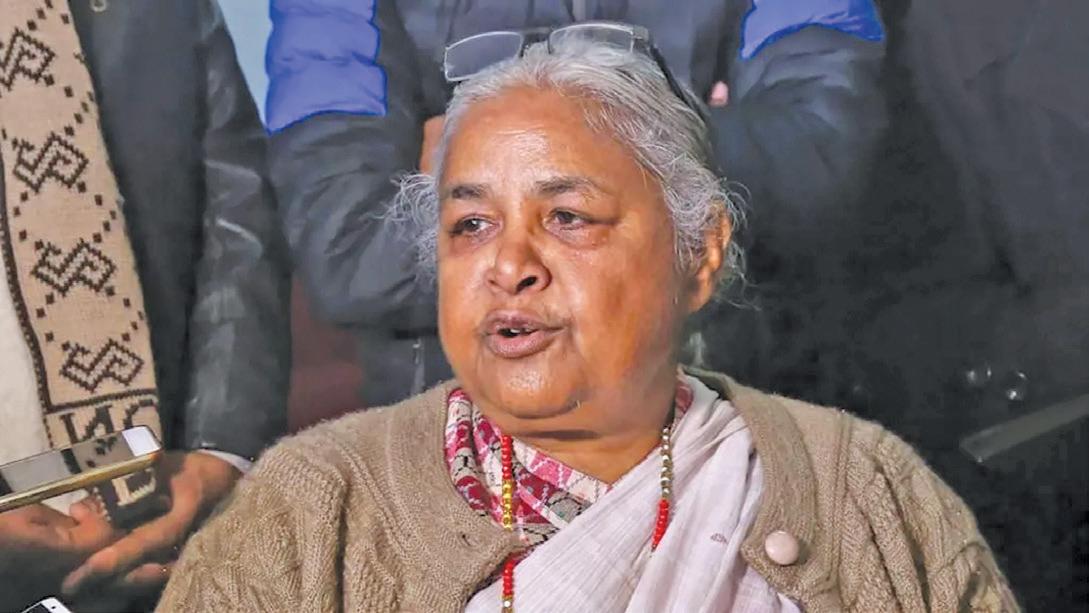
test leaders was reached after days of consultations. Legal experts were also involved.
Parliament was dissolved late on Friday, and it was announced that general elections would be held on 5 March next year.
Karki is expected to appoint Ministers to her cabinet within a few days.
She is widely regarded as having a clean image, and her leadership of the interim Government is being supported by student leaders from the so-called “Gen Z” movement.
But her cabinet will face multiple challenges, including restoring law and order, reconstructing parliament
and the other key buildings that were attacked, reassuring the Gen Z protesters who want change – and others in Nepal who are fearful its young democracy and constitutional order could be derailed.
Another key task will be to bring those responsible for violence to justice.
Karki’s appointment is a compromise resulting from talks that were brokered by Nepal’s army chief this week. Elated Gen Z supporters are expressing their happiness on social media, and many see this as the next step in the new political course they want the country to take. (Excerpt from BBC News)
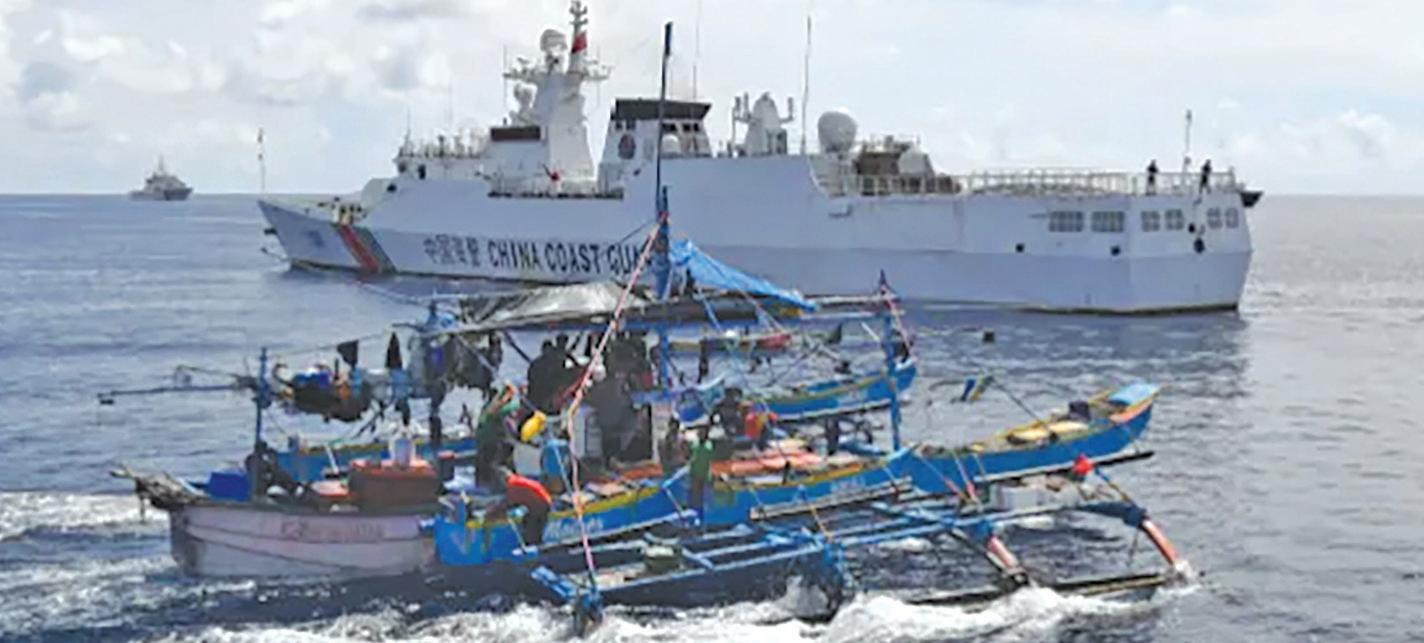
two.
“We continue to see significant aggression directed at officers by Unite the Kingdom protesters,” said the force on X, which arrested nine protesters, adding that additional officers supported by police horses had been deployed in “multiple locations”.
At the counterprotest, attended by left-wing lawmakers Zarah Sultana and Diane Abbott, the crowd held signs saying “refugees welcome” and ”smash the far right” and shouted “stand up, fight back”.
The “Stand Up to Racism” campaign group posted on X that its protesters had also been attacked by Robinson’s followers. “Are these the ‘concerned ordinary people’ we’ve heard so much about? Or are they far-right thugs?” said one post. (Excerpt from BBC News)
Secretary of State Marco Rubio has expressed support for Manila’s opposition to Beijing’s plan to designate the contested Scarborough Shoal as a “nature reserve”, characterising the move as part of a broader Chinese strategy of coercion in the South China Sea.
“The US stands with our Philippine ally in rejecting China’s destabilising plans to establish a ‘national nature reserve’ at Scarborough Reef,” Rubio wrote on the X social media platform on Friday.
“This is yet another coercive attempt to advance China’s interests at the expense of its neighbours and regional stability,” Rubio said.
“… Claiming Scarborough Reef as a nature preserve is another
example of Beijing using
pressure tactics to push expansive maritime and territorial claims, disregarding the rights of neighbouring countries,” he added in a statement.
On Wednesday, China’s State Council revealed its intention to establish a nature reserve spanning 3500 hectares (8650 acres) on the disputed islet, describing the initiative as an “important guarantee for maintaining … diversity, stability and sustainability”.
While Scarborough Shoal lies 240 kilometres (150 miles) west of the Philippines’ main island of Luzon and is included in the country’s exclusive economic zone, it has been under Beijing’s control since 2012.
China’s nature reserve plans drew a string of strong responses from
the Philippines, where the Department of Foreign Affairs promised on Thursday to lodge a “formal diplomatic protest against this illegitimate and unlawful action”.
According to the Philippine Star news outlet, Philippine National Security Adviser Eduardo Ano said China’s planned “Huangyan Island National Nature Reserve” is “patently illegal”.
“This move by the People’s Republic of China is less about protecting the environment and more about justifying its control over a maritime feature that is part of the territory of the Philippines and whose waters lie within the exclusive economic zone of the Philippines,” Ano was quoted in the newspaper.
(Excerpt from Al Jazeera)

























TAURUS (April 20May 20)

GEMINI (MAY 21June 20)

CANCER

LEO (July 23Aug. 22)

VIRGO (Aug. 23Sept. 22) (March 21April 19)

LIBRA (Sept. 23Oct. 23)

Emotional situations will require your undivided attention and discipline. Set boundaries and establish clear rules to protect yourself from anyone who tries to take advantage of you. Don’t waste time on petty differences or unnecessary excess. Focus on finishing what you start and sticking to your budget. Make physical activity and romance a priority.
Simplify your life, don’t share secrets or personal data. Avoid making unnecessary changes or getting involved in someone else’s drama. Expand your knowledge and interests, and build a strong foundation to showcase your capabilities and promote your availability. Utilize your experience and connections to advance, and leverage your drive and determination to meet deadlines.
Pay attention to your needs. It’s okay to put yourself first and to enjoy a moment of “me time”. The break will energize you and encourage you to devise an efficient way of handling any trouble areas in your life. Personal growth and self-improvement are excellent starting points for a new journey.

SCORPIO (Oct. 24Nov. 22)

SAGITTARIUS (Nov. 23Dec. 21)

CAPRICORN (June 21July 22)



An open mind will spark your imagination regarding home and personal improvements. Put together a plan that fits your budget, and you’ll ward off overdoing and overspending on things that aren’t necessary. A financial injection looks promising if you apply for a higher position or sell items you no longer use.
Spend more time at home. Enhance your space to accommodate projects that will enhance your comfort and convenience. Research and physical preparation will make the home improvement process more manageable and less stressful. The time you share with someone special will bring you closer together. A commitment you make will promote longterm security.
Keep your emotions hidden when handling business deals or people you don’t trust. Set boundaries and goals that help you navigate your way forward with the least amount of interference. Say no to temptation, indulgent behavior, and donating or spending more than you can afford. Keep your life simple and maintain a healthy lifestyle.
Gather information, verify facts, and put together an affordable plan that will help you invest more in your future. Distance yourself from what holds you back. It’s time to build your confidence and recognize how much you have to offer by diversifying your skills to accommodate positions of interest. Socializing and romance are favored.
Attend an event that is conducive to engaging conversations with people who spark your imagination. The information you receive will point you in a direction that allows you to mix old ideas with current trends. It’s time to explore the possibilities and expand your qualifications and skills to meet the demands. Keep the momentum flowing.
Be open to information, ask questions, talk to experts, and make decisions contingent on facts. Recognize problems, and you’ll find solutions that can transform your life and bring you closer to those you love. A reunion will reconnect you to someone you remember fondly. Expose your feelings, and something good will transpire.
Refuse to let your emotions cloud your view or lead you down the wrong path. Take note of what’s happening around you, but don’t rely on secondhand information. An opportunity to join forces with someone trying to achieve a similar goal can help you save time and money by sharing information and expenses.
AQUARIUS
(Jan. 20Feb. 19) (Dec. 22Jan. 19)


PISCES
(Feb. 20Mar. 20)

Take a pass if you don’t like what you hear, what something costs, or what’s expected of you if you participate. Set goals to incorporate physical activities, a healthy diet, and sticking to a strict budget. Taking on a financial or emotional burden will leave you with little time for yourself and your loved ones.
Trust your instincts, not what you hear from a third party. Take the path that feels right, not the one everybody else is taking. Conflicts are best left alone. Dance to the beat of your drum and refuse to let outside influences tempt or confuse you. Home improvements will cost more than anticipated.





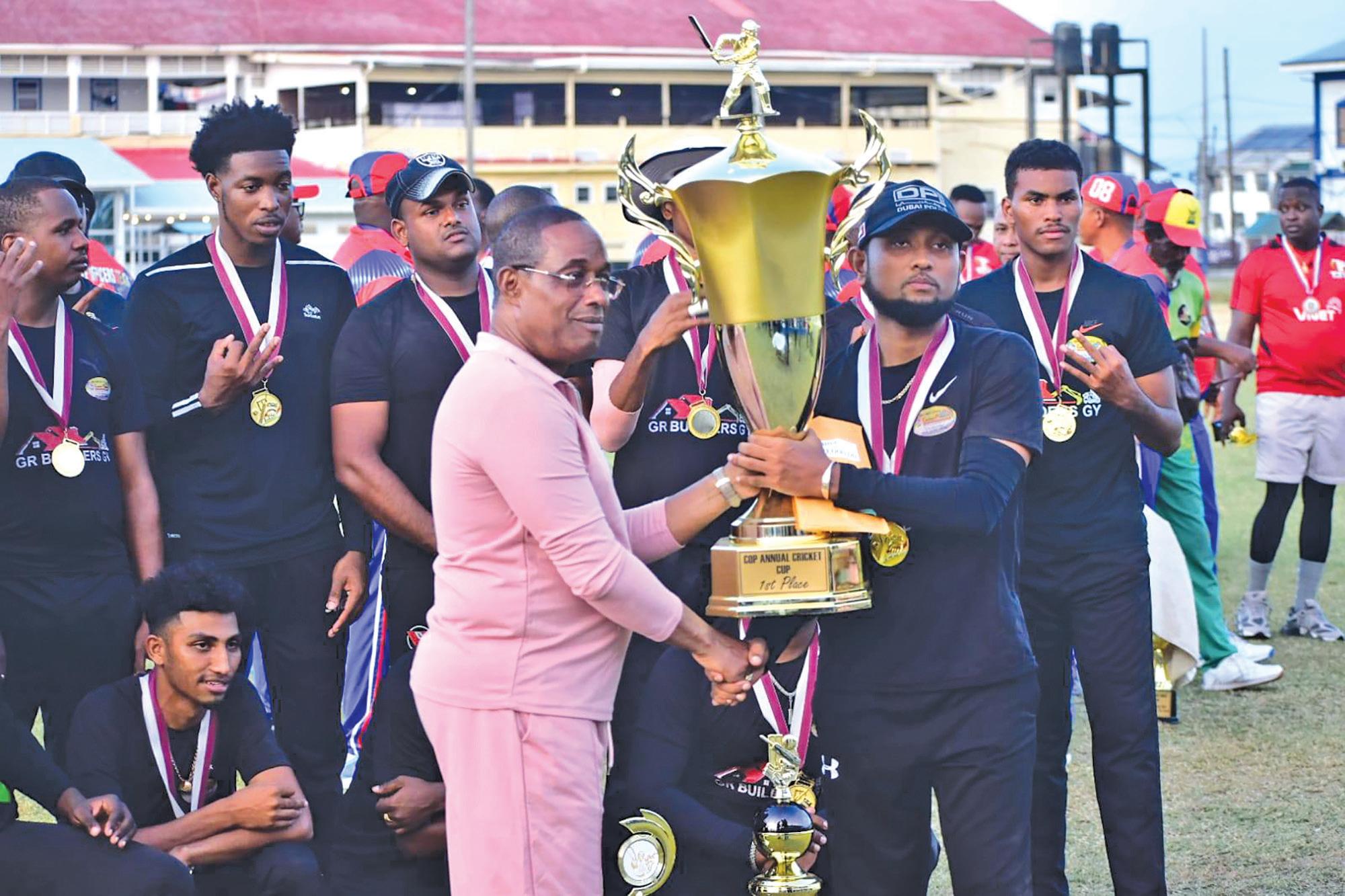
Defending champions of the Commissioner's T20 Cricket Tournament –Headquarters – successfully defended their title against the Officers Team in a nail-biting final match that was played at the Police Sports Club Ground, Eve Leary, on Friday.
The Officers Team won the toss and opted to bowl first. With a good start in the first five overs, after taking several key wickets in the form of Kyle Michael, Pernell London, Dwayne Dick and Ameer Mohamed in quick succession, the Officers look poised to break the defending champions' winning streak.
Headquarters, however, were able to rebuild the innings with a solid 70-plus run partnership between Kanhaiya Ramkaran and Kapildeo Charrandeen, who steadied the innings with smart batting, hitting the occasional boundary and ef-
ficient rotation of strike. Ramkaran and Charrandeen put on big scores of 49 and 41, respectively. Troy Leitch and Hazel Williams also supported with 16 and 15 runs.
The defending champs, Headquarters, ended their innings with 141 runs off their 20 overs, losing nine wickets.
Bowling for the Officers, Trevor Benn picked up four wickets, conceding just 16 runs off his 4 overs. Stephen Harris, Troy Benn and Ronald Alli all picked up one wicket each.
In the second innings, the tactical bowling and fielding by the Headquarters Team managed to suppress the batting line-up of the officers throughout the innings.
Opening batsman Troy Benn's knock of 44 runs, followed by his brother, Trevor Benn's 26, were the only significant scores by the Officers.
Their fighting effort with
the bat wasn't enough, as they were all bowled out for just 113 runs in 17.3 overs.
Dwayne Dick, who was economical with the ball, took three wickets for just 13 runs off 4 overs. HQ captain, Ameer Mohamed, along with Pernell London, Kanhaiya Ramkaran and Euan Blair, all took one wicket apiece.
With their all-round performances with bat and ball, Team Headquarters has cemented their status as the most dominant team in the history of the Commissioner's T20 Cricket Competition – securing their title as defending champs an unprecedented three consecutive times.
Kanhaiya Ramkaran received the “MVP” and “Best Batsman” awards for the tournament, while Trevor Benn received the 'Best All Rounder' and “Best Bowler” awards. They both received cash and trophies for their exceptional performances.
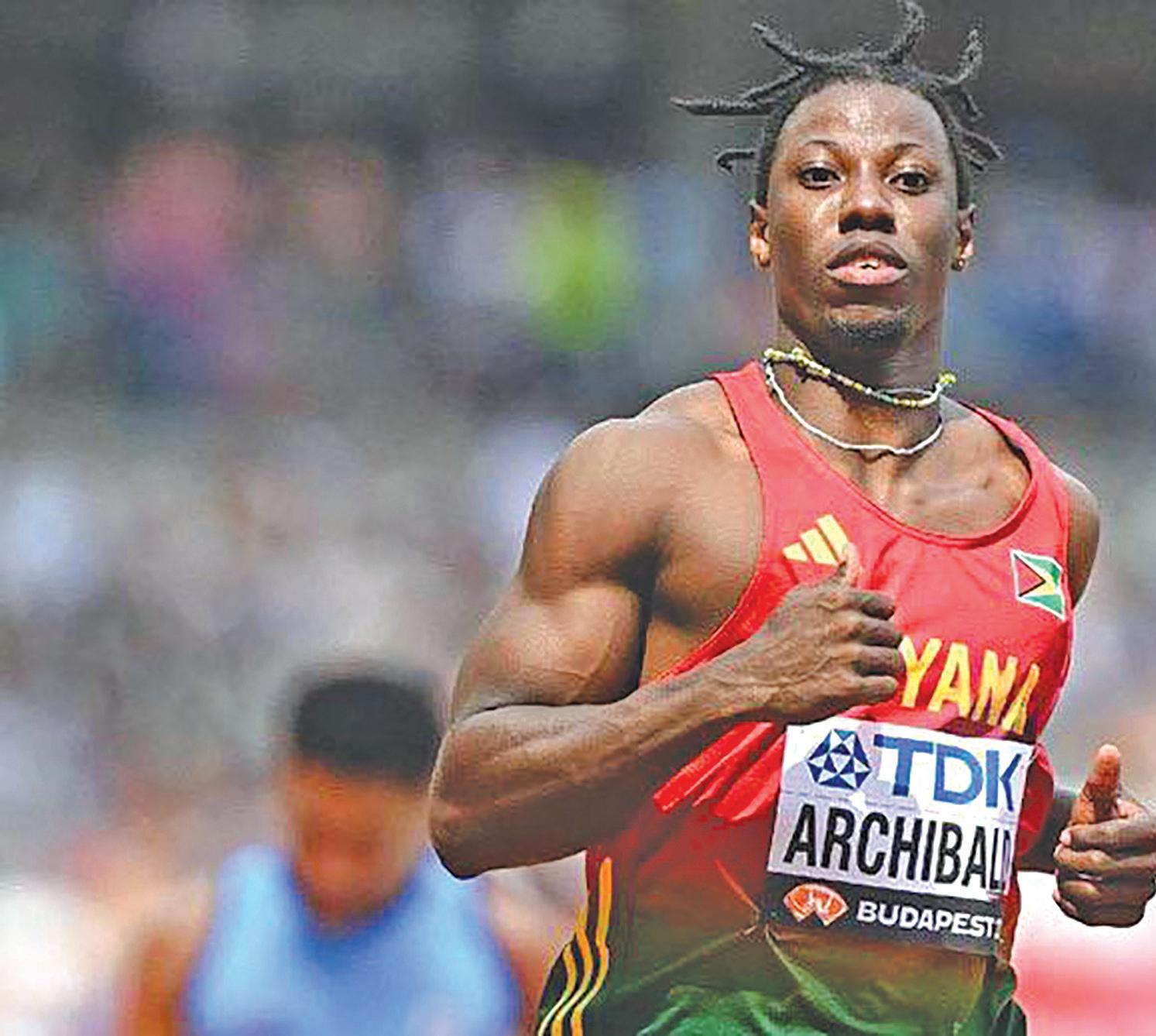
Guyana’s Emanuel Archibald is flying the Golden Arrowhead at the World Athletics Championships in Tokyo. He enters the men’s long jump with a personal best of 8.22m –Guyana’s national record and the 16th best jump in the world this season. A two-time Olympian, national 100m record holder, Pan Am Games bronze medallist, CAC Games champion, and South American Games silver medallist – Archibald continues to make history for Guyana.
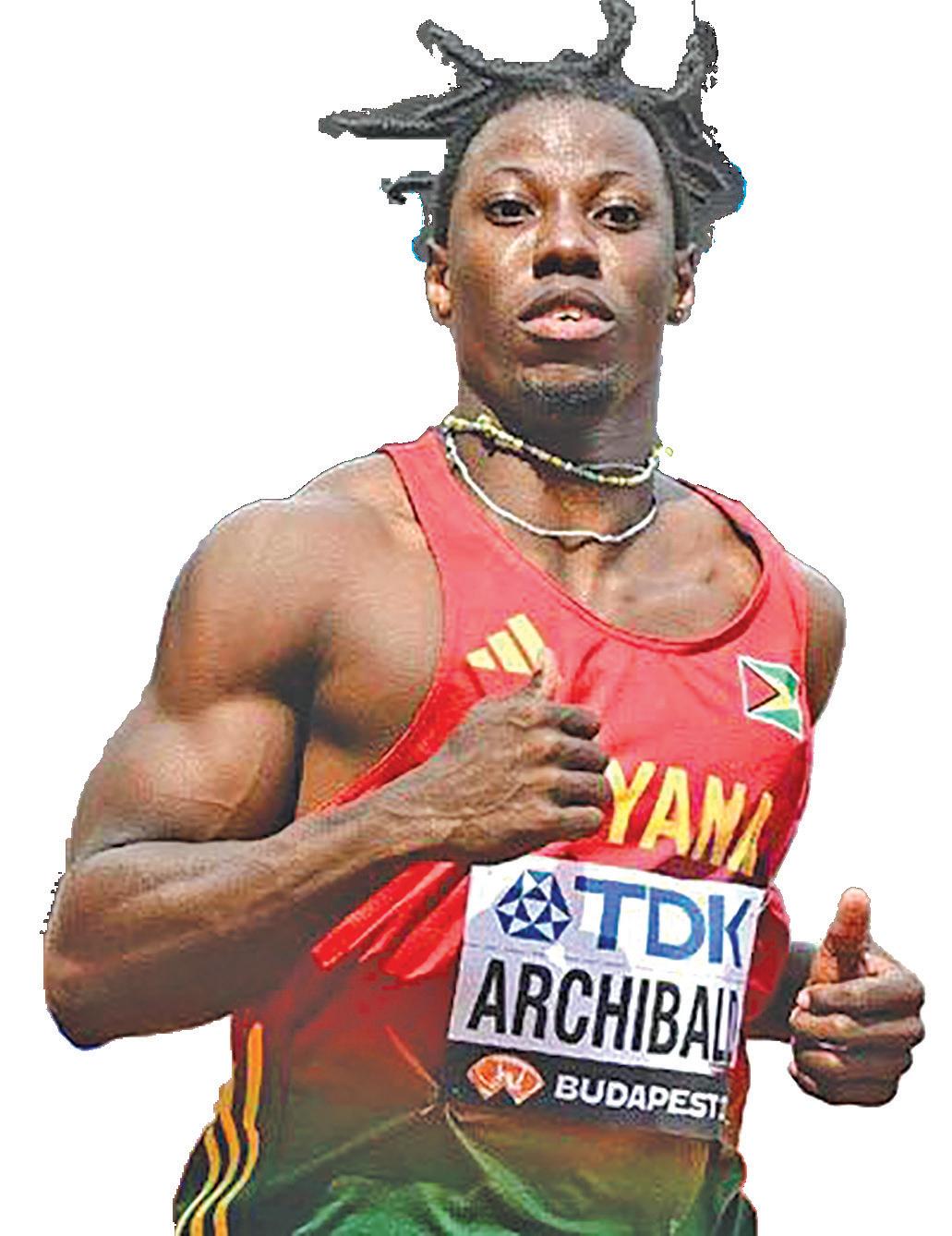


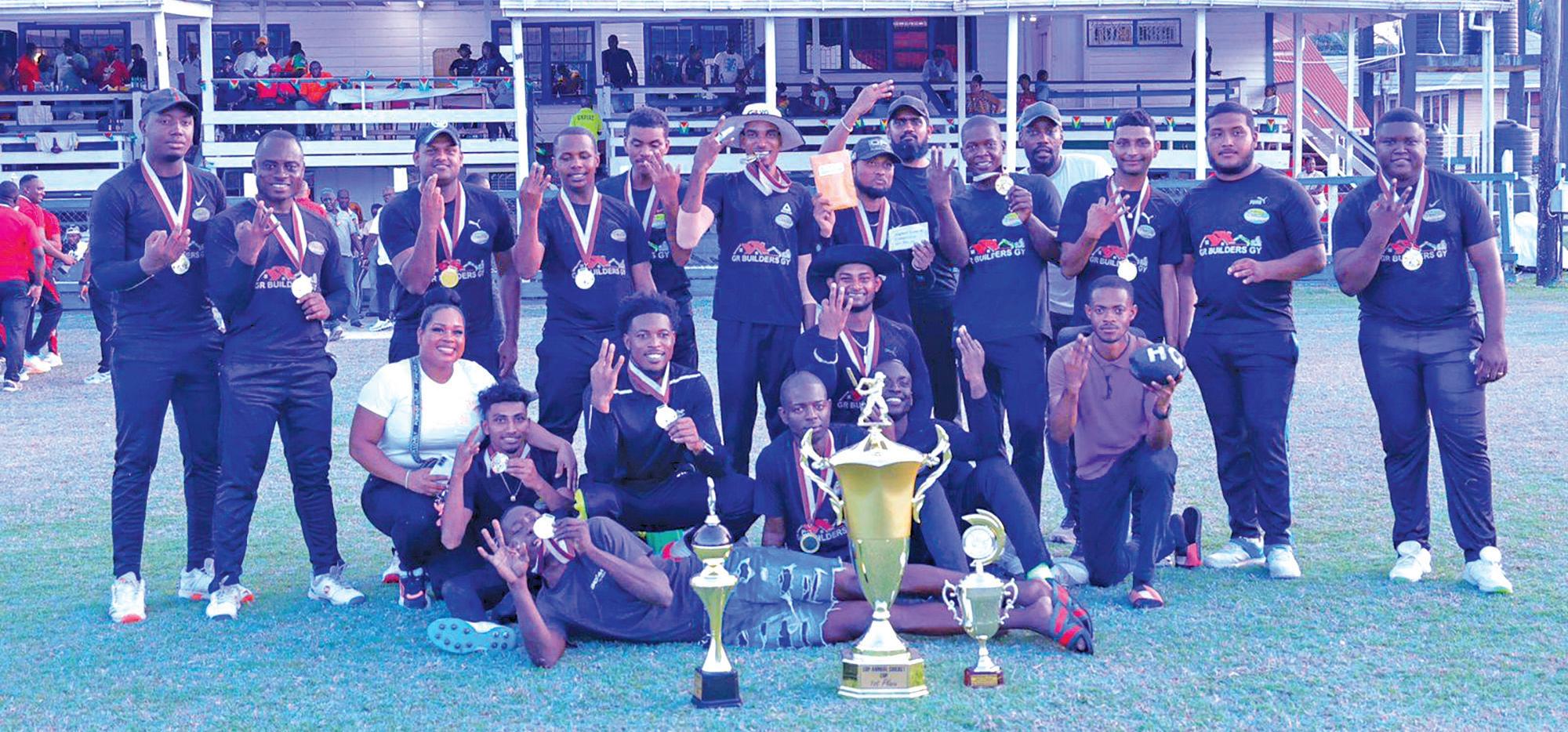
The Guyana Football Federation (GFF) on Friday announced the selection of its inaugural national esports squad, following the successful staging of the GFF eSports League –Console Division.
The four players will represent Guyana at the upcoming FIFAe World Cup 2025 Regional Qualifiers, marking the nation’s debut on the global esports football stage.
After a thrilling finale held in the early hours of Sunday, September 7, the tournament produced four outstanding finalists from a pool of 33 registered participants. These include Moen Hall – Champion of the GFF Console Division 2025; Trayon Guillaume –runner-up; Ricardo Sukra – third place; and Jermaine Lewis – fourth place finalist.
These players now be-

come Guyana’s first official national esports team under the governance of the GFF, advancing to compete internationally in pursuit of qualification for the FIFAe World Cup 2025 in Riyadh.
In recognition of this milestone, a presentation ceremony was hosted at the GFF headquarters, attended by General Secretary Chattopadhyay, Technical Director Bryan Joseph, and Senior Men’s National Team
Head Coach Thomas Dooley. The General Secretary formally presented the players with their official national kits, symbolising their elevation to national team status.
With regional competition on the horizon, the GFF squad now begins its preparations for the Road to Riyadh 2025, where they will proudly represent the Golden Arrowhead on the international esports stage.
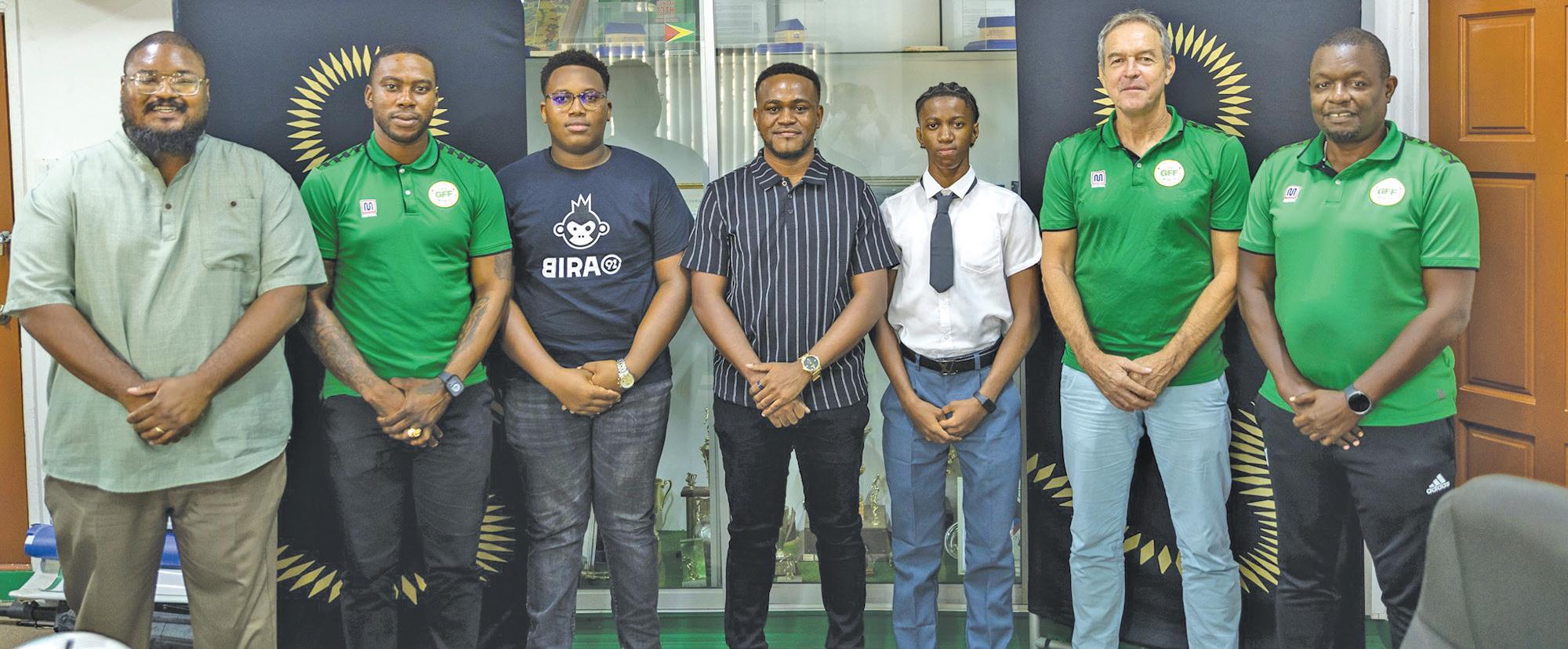
Director of Sport Steve Ninvalle has confirmed that the site for a new boxing gym at Angoy’s Avenue, New Amsterdam, Berbice, has pected to be completed within six months.
Ninvalle, also President of the Guyana Boxing Association (GBA), highlighted the gym’s importance for Berbice, a region that has steadily become a powerhouse for
says the new gym will give young fighters a structured environment and help grow boxing across the entire country.
“This gym doesn’t just add depth to boxing in Berbice; it strengthens boxing across Guyana,” he ex-
plained. “More young people will now have access to proper facilities, and with that comes the opportunity to pursue the sport seriously.”
Ninvalle also expressed gratitude to President Ali for his continued investment in sports infrastructure.
“The President understands the importance of sporting facilities and the vital role they play in developing athletes. His support is invaluable, and this project is a clear indication of his vision for sports in Guyana,” he added.
Once completed, the Angoy’s Avenue boxing gym is expected to further cement Berbice’s reputation as a cradle of boxing talent, while giving the next generation of fighters the tools to chase greatness.
“The Angoy’s Avenue gym will be the third of its kind in Berbice, joining the

“This is another promise delivered by the Government of Guyana, and particularly by President Ali, who continues to show his commitment to the development of sport across the country,” Ninvalle said in a release.
New Amsterdam Boxing Academy and the Rose Hall Jammers Boxing Gym,” Ninvalle noted. “In recent years, most of our up-andcoming fighters have hailed from Berbice. This includes Caribbean champion Terron Wintz, who has already made his mark on the international stage.”
The Director of Sport

It rained goals at the Guyana Football Federation’s National Training Center (NTC) in Providence, East Bank Demerara, as Rivers’ View Football Club kicked off their Women’s Division One League campaign in style, while Monedderlust FC bounced back from a heavy opening-day loss with a resounding win.

third in the 29th minute before Selena Obermuller struck in the 30th, with Anna Charles then capping off the rout with a late double in the 60th and 62nd minutes, handing Rivers’ View a comprehensive 6-0 victory.
Monedderlust FC followed suit with a 7-2 demolition of Lake Mainstay Goldstars FC Women.
ed Monedderlust in the second half with a 46th-minute strike. Scott completed her hat-trick with goals in the 56th and 59th, and Fraser added another in the 60th, sealing a dominant win for the Berbice side.
Monedderlust FC takes on Guyana Police Force FC from 18:00hrs while at 19:30hrs, Guyana Defence Force FC and Rivers’ View will do battle.

nings, but once they departed, the collapse continued.

Guyana Under-17
captain Romario Ramdeholl produced a batting masterclass, smashing an unbeaten 75 to lead Canje Secondary School (CSS) to a resounding nine-wicket victory over the Multi Royals in the final of the New Amsterdam/Canje Republic Bank Inter-Schools Cricket Tournament.
Royals folded for 109 in 25 overs.
Earlier, they were inserted to bat first on a pitch offering early assistance to the bowlers; the Royals endured a shaky start, losing skipper Avishkar Persaud and his deputy Avishkar Beharry in quick succession.
A steadying partnership between Jaden Edwards (20) and Tamesh Deonandan (22) briefly steadied the in-
Wickets tumbled at regular intervals, and the Royals were bundled out for 109 in 25 overs.
For CSS, Zaden La Rose was the pick of the bowlers, finishing with three scalps.
In reply, Canje Secondary’s powerful batting unit made light work of the modest target.
Ramdeholl was in a destructive mood, peppering the boundary ropes with seven fours and six towering sixes in his whirlwind of 75 not out. His performance ensured the chase was wrapped up in just 14 overs, with Beharry claiming the lone wicket for the Royals.
With this emphatic win, Canje Secondary now march into the Region Six final, where they will lock horns with Port Mourant Secondary School.
The action began with Rivers’ View taking on Ann’s Grove United FC Women, who had settled for a draw in their previous outing. Aleya Daniels broke the deadlock in the 13th minute and quickly doubled her tally just two minutes later. Tytheon Jones added a
Ashante Scott and Delicia Fraser gave Monedderlust an early 2-0 lead in the 6th and 10th minutes, with Liliana Greenidge bringing that up to 3-0 in the 27th. Shenita Samuels kept Goldstars in the fight with goals in the 12th and 29th minutes, but Tiffany Lord reignit-
The Women’s Division One League continues on Wednesday, September 17, with a double-header. Monedderlust FC will face Guyana Police Force FC at 18:00h, followed by Guyana Defence Force FC against Rivers’ View at 19:30h.
By Brandon Corlette
The Mount Sinai Cricket Club, popularly known as the ground in Cowdamn, has shown a rapid rise in development.
The club are significant beneficiaries of the current administration, and as a result, they are currently producing talented junior cricketers for Berbice. Adrian Emmanuel, the young fast-bowling all-rounder, is the latest product that is primed for Berbice Under-13 glory.
Additionally, the club’s facility is growing, with two side screens added, a pavilion and washrooms in place and, significantly, the construction of a boxing gym on the horizon.
The man behind most of the club’s development is Joel Amsterdam, the coach and a councillor for the community.
“I’m able to make that representation to the Central Government, who is always willing and ready to work, and as a result you see massive investment in the community ground and sporting facilities in this community,” Amsterdam said.
In relation to the construction of the boxing gym, which has an estimated cost of more than 40 million, Amsterdam described this as an invest-

ment in the people in the community.
“The boxing gym is a big deal for Angoy’s Avenue and New Amsterdam. It’s going to be the only state-ofthe-art boxing gym in New Amsterdam.”
“I remember just under a year ago Mr Jeff Roberts and I asked His Excellency the President, Dr Ifraan Ali to assist us with a gym in New Amsterdam, and he committed to building this boxing gym. Today it’s becoming a reality. It’s typical of the PPP/C Administration; whenever they make a promise, they always deliver,” Amsterdam disclosed.
This gym will offer a positive outlet for young people,
steering them toward discipline, fitness, and mentorship instead of negative influences. The gym will create a pathway for discovering and nurturing local athletes who might go on to represent the area regionally or even internationally.
The facility primarily focuses on cricket and is used for hosting Berbice Cricket Board matches. Amsterdam and his team aim to focus on player development, introducing more structured training programmes, coaching clinics, and youth academies to build a strong pipeline of talent.
In the near future, the club also will be installing practice nets and equipping themselves with bowling machines and equipment to create a
more professional environment for players.
Further, Mount Sinai Cricket Club will also focus on community engagement, strengthening ties with schools and community groups to encourage wider participation and support. With all these plans and development, sponsorship is also essential for the club’s resources to grow.
In addition to Emmanuel, the club has more talented players, but those who stood out thus far include Anthony Persaud, who is a spin bowling all-rounder who represented Berbice at the Under 13 level last year.
They are Jovell Dejonge, Geovaani Amsterdam, Shaheed Demond & Simeon Lindie, who are arguably the most talented of the bunch.
Lindie is the nephew of West Indies cricketer Shamar Joseph, who is also an Adventist like Shamar, who had to wait until he was older to play the game.
The young Lindie’s parents rarely allow him to play on Saturdays, a belief Shamar Joseph’s parents followed early in his career.
With Berbice being beneficiaries of development, Mount Sinai is another club to look out for.


Oning at the National Stadium, the Guyana Amazon Warriors Women stormed into the finals with a thrilling five-wicket win over the Trinbago Knight Riders Women (TKRW) in a do-ordie showdown.
TKRW’s innings got off to a rocky start as opener Lizelle Lee was trapped lbw by Karishma Ramharack for just 2, before Jodi Glasgow’s bizarre hit-wicket dismissal to Molly Penfold left them reeling at 14-2 inside the powerplay. The ever-reliable Jess Jonassen then steadied the ship with a composed 51 off 45 balls with four boundaries and two sixes. The Australian liant 4-17 from her four overs, removing Glasgow, Dottin, Pandey (0), and Hector (1). Stefanie Taylor chipped in with the prized scalp of Jonassen, while Laura Harris accounted for James.




Jannillea Claxton nudged the total past 120, but the lack of partnerships left TKRW well short of a truly competitive target.
Despite Jonassen’s lone stand, the Knight Riders’ innings never took flight, with the lower order of-
At the halfway stage, the Warriors looked confident of reeling in 124, backed by a powerful batting lineup led by Stefanie Taylor and Shemaine Campbelle. With
ting the tone, they entered the chase with momentum on their side and a spot in the finals within reach.
Chasing 124 at just over six an over, the Warriors got off to a shaky start.
Captain Deandra Dottin made the early breakthrough with the new ball, bouncing out the in-form Realeanna Grimmond for

Shermaine Campbelle then walked to the crease, aiming to rebuild the innings for the chase. The pair added 26 runs before Campbelle fell, mistiming a delivery straight to short mid-wicket, where Dangore claimed her second wicket of the night, leaving the
Trinbago Knight Riders
Women (20 ovs maximum)
Lizelle Lee † lbw b Ramharack 2
Jannillea Glasgow hit wicket
b Penfold 7
Jess Jonassen c Grimmond
b Taylor 51
Zaida James c Taylor
b Harris 15
Deandra Dottin (c) b Penfold 31
Shikha Pandey c Campbelle
b Penfold 0
Shawnisha Hector b Penfold 1
Jahzara Claxton not out 4
Extras (lb 2, w 10) 12
Total 20 Ov (RR: 6.15) 123/7
Did not bat: Shabika Gajnabi, Salonee Dangore, Samara Ramnath
Fall of wickets: 1-8 (Lizelle Lee, 1.4 ov), 2-11 (Jannillea Glasgow, 2.2 ov), 3-39 (Zaida James, 7.5 ov), 4-116 (Jess Jonassen, 18.5 ov), 5-116 (Deandra Dottin, 19.1 ov), 6-117 (Shikha Pandey, 19.3 ov), 7-123 (Shawnisha Hector, 19.6 ov) • DRS
Bowling O-M-R-W
Molly Penfold 4-0-17-4
Karishma Ramharack 4-0-15-1
Ashmini Munisar 4-0-36-0
Stafanie Taylor 4-0-24-1
Laura Harris 4-0-29-1
score at 82 for 3 after 12.5
TKRW struck again soon after, as Laura Harris was caught at long-on for 10 off 5 balls. The Guyana Amazon Warriors Women required 16 runs from 24 balls with Stephanie Taylor and Dane van Niekerk at the crease. With just four runs needed for victory, Taylor fell for 39 off 44 balls, having struck three boundaries. Dane van Niekerk then sealed the win, finishing unbeaten on 12. The Warriors completed their innings at 125 for 5 in 18.5 overs, securing a five-wicket victory. The win ensures the Guyana Amazon Warriors a place in the finals, while the Trinbago Knight Riders bow out.
(T:
Amy Hunter † lbw
20
b Dangore 27
Realeanna Grimmond c & b Dottin




with a thunderous six off his very first ball.
Three overs later, Pretorius sent Johnson Charles back to the pavilion for 16 off as many balls. The hosts’ troubles deepened as the Kings not only accelerated but also forged an almost unbreakable third-wicket partnership.
Experienced campaigner
Roston Chase and rising star Auguste tore through the Warriors’ bowling, compiling a 90-run partnership with 6 fours and 4 sixes, leaving the Providence crowd stunned into silence.

waine Pretorius once again joined the elite, smashing a six off the final ball to seal victory for the Guyana Amazon Warriors (GAW) on Saturday afternoon.
But the ever-dangerous Pretorius wasn’t the only standout, as Quentin Sampson burst onto the world stage, showing the kind of strength his name would evoke from biblical tales.
Sampson’s fearless innings not only propelled the Amazon Warriors into the playoffs but also put the spotlight on one of Guyana’s rising T20 stars at the National Stadium in Providence.
After winning the toss and choosing to bat under the blazing Guyanese sun, the Kings got off to a steady start, racking up 9 runs in the opening over.
Gudakesh Motie’s early introduction in the second over proved a stroke of genius, as Tim Seifert miscued his third delivery and skied it straight to Hassan Khan at cover.
The celebrations were short-lived, however, as belated birthday boy Ackeem Auguste marked the occasion
Motie created the first opportunity to break the partnership in the tenth over, delivering a length ball wide outside off, but Shimron Hetmyer’s diving attempt at long-on couldn’t hold on.
It was eventually Captain Imran Tahir who broke through, claiming Auguste’s wicket three overs after the earlier missed chance.
Just two balls after reaching his second half-century of the season – coincidentally also against the Warriors –Auguste went for the big shot and was caught at deep midwicket for 50 off 30.
Captain Tahir celebrated the crucial wicket with his signature “Suiii”, but Chase kept the momentum alive, smashing two fours and a six off the next over from Hassan Khan.
Tim David’s time at the crease was brief, but Chase held firm, making the missed chance to dismiss him even more costly for the Warriors.
A collective groan echoed through the Providence stands as Hetmyer once again failed to hold on to Motie’s delivery, letting Chase survive on 74.
Instead, the Barbadian national racked up an unbeat-

en 90 off 55 balls, featuring 6 fours and 5 towering sixes.
The CPL’s defending champions posted 185-4 in
citement was well justified, as Sampson single-handedly steadied the Warriors’ shaky start and put on a
ods at the crease, leaving the Amazon Warriors reeling at 133-6 by the fifteenth over.
By the 18th over, all hope seemed lost when Shai Hope, the last recognized batsman, was sent back for 44 off 34 balls.
Coming in at number 8 for the first time for the Warriors, Moeen Ali joined Pretorius to keep the fight alive.
Exactly a year ago against the Antigua Barbuda Falcons, Pretorius faced a similar test, needing a bound ary off the very last ball of the innings.


Needing 12 from the fi nal over, the stage was set for a roller-coaster six balls from St Lucian captain David Wiese. A no-ball, a run-out, and wides mixed things up, leaving just four runs required off the last delivery.

Roston Chase and a good all-round outing, hitting 90 and claiming 3 wickets
Pretorius held his nerve, smashing Wiese over long-on for a match-winning six.
With that big hit, the Amazon Warriors secured
their place in the Republic Bank CPL playoffs. The local side now has a chance to climb into the top two spots tonight when they face the Barbados Royals at 19:00h.